EDITOR1AL
Once
again a warm welcome to the annual edition of the Tal
Handaq School Magazine.
Our population of approximately six hundred eleven to
nineteen year olds have been given the chance to express
themselves. I want to thank those who took this opportunity
especially those whose contributions
did not eventually find
their way into print. There will be much that is familiar to
regular readers, our house reports, examination results and
the like. I hope there will be enough of the new to give you
some pleasure. We have introduced some competitions for
those who like that sort of thing, some
of a mathematical nature and one which will enable students
to find out how much they really know about members of
staff. This will be my second and last time as Editor the
magazine. I still feel that the ideal way to produce it is
to give it entirely over into the hands of a responsible
committee of students of the school. I pass it on to older
members who will still be here in 1976
that they might like to get
together and produce next year's edition. They would
thoroughly enjoy the experience and learn a good deal from
it. And now some thank yous. To
all contributors and specially to
Pat Fitton for her signs of the
zodiac and other illustrations. To
Sylvia Houghton, Deborah Jackson and Christine Williams for
their great help. To "Mr Naylor,
Mr Ditcham and P.L.O.
Section at R.A.F.
Luqa for photographs.
To various people
for their typing especially Miss Sandra
Camiilleri, the school's
assistant secretary and Mr Charles
Aquilina, our librarian.
Last
but not least I must thank Mr Victor Mule for his help with
the production and especially on the business side in
getting advertising for us. On this point it would be nice
to think you will support our advertisers in return for
their kindness in supporting us.
And a
last word, especially to those of you amongst us who are
hiding their light under a bushel. There will soon be a
whole new blank 1976 edition waiting to be filled. Stir
yourselves. Your magazine needs you, yes YOU.
CARL HANCOCK.
THE SCHOOL MAGAZINE
0 dear, Oh dear,
We're at it again,
With paper and ink,
And, of course, a pen,
To write a poem
Is what we are asked.
Or perhaps a joke, But what a task.
1 really
cant' think,
And Oh how I'm tired,
My minds on the blink,
So I'm all blurry-eyed.
I really won't make
My hair's turning green, The
reason? You've guessed it The
school magazine!
Gary Booth
4K
HEADMASTER'S REPORT
DECEMBER
1974
In the past Prize
Day has been the occasion for the presentation of the
Headmaster's Annual Report. This
year, for a variety of reasons, there has been no Prize Day:
by the middle of the Autumn Term
many of the possible prize-winners have left Malta;
accommodation for the whole school, parents and friends of
the school is just not available (even Australia Hall was
not big enough); in days of stringent economy and rapidly
rising prices it is felt that the prize money might be
better spent on the school generally; although virtue need
not necessarily be its own reward, success is better
recognised as soon as possible after its achievement. While
it is a matter of regret that as a result of this year's
decision we have not had the pleasure of inviting a number
of distinguished guests to an occasion when the pupils would
be on public display, I trust that there will be other
events in the school calendar to which we shall be able to
welcome many visitors.
However, Prize Day
or no Prize Day, I believe that a Headmaster has a duty to
present to all those interested in the school — the
Competent Authority, heads of Service units, senior
Civilians, parents of pupils, ex-pupils and friends of the
school - an account of the year's activities, particularly
as 1973-74 was a year of continuous achievement and marked
success. It is a record, I hasten to add, for which I was in
no way responsible. I cannot be accused of immodesty,
therefore, if I take the opportunity to say publicly what I
have been saying in one form or another since I arrived at
the start of the Summer Term, but which, as time goes on,
even if justifiable, will be more difficult for me to
repeat.
First of all I
should like to say how pleased I am to be
Headmaster here. Tal Handaq has
for long enjoyed a fine, though regrettably too little
publicised, reputation among Service Children's Schools and
I count it an honour and privilege that I, an Instructor
Officer, should be appointed to a school which caters for
all three Services and Civilians, (particularly I might add
when the school population is predominantly light-blue). It
was clear to me on arrival that the school was a happy
community in which newcomers, staff or pupils were quickly
made
to feel at home. Pupils seemed open and friendly, parental
co-operation appeared to be good and the administrative
support most effective. Quite obviously my predecessor,
Instructor Commander M.F. Law, had achieved a great deal in
re-establishing the school after the Services' withdrawal in
1972 and in restoring it so completely and so quickly to its
previous state of efficiency. I should like to stress here
the debt which the school and the Services community in
Malta owed to him in what was an unusually long and
difficult appointment. The good things at which I hinted
earlier and which I am now pleased to report are the fruits
of his skill and direction.
In September 1973
the term began with nearly 600 pupils in what must now be
regarded as a period of uncharacteristic stability, since
many Service personnel had begun their tours in the Summer
of 1972. Towards the end of the school year the rate of
change in the school population increased. This Autumn Term
1974, as well as the pupils from the Malta Primary Schools
we have had 124 new entries and 73 pupils have left. These
recent figures reflect what should now be regarded as the
'normal' state of turbulence for the school, with an
ever-changing pupil population of about 600, over 60% of
whom are the children of Royal
Air Force personnel.
My predecessor
reported that the 1973 examination results in the
circumstances were surprisingly good. The 1974 GCE and
CSE examinations produced a crop
of results which are much above the average for the British
system.
Candidates
Subject Entries Passes
%
A Level
17
38
28 78.7
O Level
88
327
256 71.9
CSE
103
413
376 91.0
The CSE results
include 65 passes at Grade 1; these rate with O
Level passes. I would remind both
pupils and parents, some of whom still view with suspicion
the CSE qualification, that if we insist that pupils take
CSE rather than GCE, it is likely to produce a better
examination result: a Grade 2 or 3 at
CSE is probably much more useful than an O Level
failure.
It may be
undesirable, it is certainly unfashionable these days, to
lay too much stress on examination results as a measure , of
a school's achievement, but I see no reason why we should
disregard academic excellence or why we should not publicise
these results for what they are: outstandingly successful
and certainly the best at Tal
Handaq in the percentage
successes
for
some years. The candidates and their teachers are to be
congratulated. Given the return to the degree of turbulence
and change that is taking place in the present academic
year, pupils and staff will need to work very hard indeed to
achieve comparable results in 1975.
Those are the
examination successes. They were accomplished with a few
changes to the system and to the curriculum in 1973-74:
streaming continued in the first three years with more
attention given to less able pupils and with movement
between streams as unrestricted as possible so as to allow
pupils to work at the level and pace for which they are best
suited; teaching for the most part continued to be
subject-based but the Scottish Integrated Science syllabus
was extended to the second year and the development of the
Cambridge Classics Project continued,
in the Fourth and Fifth Years a generous programme of
options has led to some very small teaching groups, which in
other schools would be considered uneconomic. While the
ideal option system is virtually unobtainable, nevertheless
we much provide as comprehensive a programme as possible so
as to meet the needs of pupils moving to and from a wide
variety o: schools in Britain and elsewhere.
.jpg)
For
the Sixth Form the one-year General Course has been modified
wherever possible so as to place greater emphasis on
'education for living' while preserving the opportunities
for people to add to or improve upon their Fifth Year
examination results. Local Studies and the Humanities
project have been introduced and a notable development this
term has been a new course in
Parentcraft for Sixth Form girls. The syllabus is an
experimental one; the response from students so far has been
very favourable.
Aesthetic, sporting
and extra-mural activities have not been neglected. A
production of 'The King and I'
was successfully staged at the end of the Autumn Term 1973.
As the outstanding performances of 'OLIVER!' took place only
in the previous February the presentation of a second, even
larger-scale musical in the same
calendar year was a considerable achievement and
ample evidence of the talents,
skill and sheer creative energy of the Tal
Handaq teachers. Inevitably,
such productions can be staged only at some cost to
subject-teaching and school resources, even I would add at
some expense in what might be regarded as the boundless
energy of the pupils. For that reason it was decided this
year to put on a more modest entertainment,
but one
which would allow some 200 performers to take part in a
programme of Christmas music, words and movement.
For the Open Day in
May there was a most impressive collection of wood and metal
work, pottery, art, needlework and handicrafts, when the
School Hall took on the appearance of the Haymarket Design
Centre. The Easter fashion show had already demonstrated the
range of talent of staff and pupils in the Home Economics
Department.
In the School's
sporting life Inter-House rivalry has played an important
part throughout the year. In 1978-74 fourteen sports were
included in the competition, which was so keenly contested
that the final positions were decided only after the Summer
Term Swimming Championships. Outdoor pursuits have also
included the Duke of Edinburgh Award Scheme for which a
number of expeditions were arranged and training activities,
including canoe-building, took place at the school.
After some delay
the School's Combined Cadet Force was established in the
Summer Term. Boys from the third form upwards are eligible
to join. (No girls' section, although
there are some willing volunteers). Since the unit's
formation there have been weekly parades during term-time,
visits to ships and Service units, as well as other training
activities which included a 2-day exercise at the end of the
Summer Term. At present there are 25 RAF cadets and 38 Royal
Navy. The unit has, of course, benefited greatly from the
help given by the Commanding officers of HMS St Angelo, the
RAF Station Luqa, 41 Commando,
and 234 Signals Squadron.
In the extra-mural
activities and in the many clubs and societies run during
lunch breaks and after school teachers give generously of
their time. I know that their efforts are appreciated by the
pupils who take part; I am not always sure that parents are
aware of what is available under the guidance of the
teachers, from whose range of
interests and skills the school derives great benefit.
Careers education
is one aspect of the curriculum with special problems. Here
in Malta our pupils who are approaching the school leaving
age are at some disadvantage when compared with their
contemporaries in Britain. There is little opportunity for
them to visit factories, shops, offices, and workplaces
similar to those in which they are likely to be employed,
there are no linked courses with Further Education
establishments and there is difficulty in finding
apprenticeships for young
people
who will need accommodation
in the United Kingdom if they wish to train for a
trade. Careers advice is always available from the Careers
teachers and in the last year visits from Careers
Specialists have done much to
alert pupils and parents to
special problems. In the Autumn Term 1975 and
again during the past term three Careers Officers from
England have conducted interviews and offered advice. It is
a pity though that not all
parents realise the importance of encouraging their children
to make some decisions as early
as possible and certainly well in advance for those who seek
apprenticeships and training courses.
Last year a party
from the school went on an educational cruise in the school
ship Uganda and another group will be going on the cruise in
January. I am very glad that so many parents encourage their
children in these and other activities. Indeed, in my two
terms I have been very conscious of the cooperation of
parents in the school's
endeavours and of the support which the school is given. 'I
hope it will always continue to be the case and that (with
or without a formal Parents' Association) all parents will
feel along with pupils and staff that Tal
Handaq is "their" school and
will be able to share our interests and
take a proper pride in the school's achievements.
Academic success
and a full programme of extra-mural activities are two
indications of the general health of any school. Over the
past year, following the raising of the school leaving age
the British national press has
presented on numerous occasions a depressing picture of the
state of the country's schools. Truancy, delinquency,
vandalism, physical violence, drug-taking and drinking might
appear from such accounts to be common, particularly in
urban areas. Since I cannot believe that the majority of
children are vastly different from those at Tal Handaq I
cannot accept the sensational stories as representative of
the British school system as a whole.
If it were so, then we are indeed fortunate. In this school
over the past year we have been
remarkably free from these much
publicised and unpleasant features.
That is not to say
that we have been completely without problems. For example,
because of the lack of employment there is a tendency for
Service children to stay on at school even when it is no
longer the right place for them. I found it necessary during
the Summer to point out to some
pupils and their parents that it was neither in the pupils'
interest nor that of the school
for
them to return for the Autumn Term when they were under no
legal obligation to do so. As a result, among the older
pupils there is every indication that
those who stay on at school have very good reasons for doing
so and are keen to take advantage of the educational
opportunities here. In view of their generally responsible
attitude I have
been pleased to extend Sixth Form privileges in
matters of dress regulations and supervision outside the
class room. So far, I am pleased to say, my confidence in
the senior pupils has been justified.
For those who come
to Tal Handaq from the
purpose-built, glass and concrete edifices beloved of
British educational architects it must seem that the school
buildings fall short of requirements. For our members and
with the present curriculum they are adequate — just. And
thanks to the unremitting efforts of the DOE authorities
they are kept in. very good order. DOE of course is only one
department on whom we rely. The Officer in Charge Schools
Malta and Naples and his staff, the Services and other MoD
Departments are generous with assistance and should like to
take this opportunity to thank them for all that they do for
us.
Having reported so many good things over the past year I
must now complete this account with reference to
less happy events. Firstly during
this term there was an accident in the General Laboratory
during a science lesson, as a result of which most of the
members of one form and their teacher received burns. It was
fortunate that the injuries were not as serious as they
might have been and that those involved were saved from
worse consequences by the prompt and efficient action of the
teacher concerned and other members of staff.
A set-back of a
much less serious nature though apparently with lasting
effects occurred this last half-term when, as a result
of high prices and diminishing
numbers for school meals, the caterer asked to be released
from his contract. At that stage less than thirty pupils
daily were buying lunches at 20 cents each. At that price,
high though it may seem, no other caterer has been prepared
to take on the task. I should point out that we do not enjoy
subsidies for school meals as in the United Kingdom where
parents pay 12 pence for what actually costs approximately
31 pence. However I have yet to notice any effects of
malnutrition on our pupils. Judging by the size of some
lunch boxes sandwich making is now a major occupation for
mothers.
The Helix Club is an
aspect of school life which has been
referred
to in previous reports. Since last summer it has operated
with some difficulty because of the lack of suitable
accommodation for its activities. Some dances have been held
at the school, but the premises are not ideally suitable
and, understandably the committee of senior pupils would
prefer to hold their functions away from the classroom
atmosphere. I am hopeful that
they will shortly be able to make use of accommodation
elsewhere and that they may then think about extending their
activities. However, I should stress that the running of the
club is a matter for the committee members themselves
assisted by one of the teachers.
My own interest is to ensure that nothing takes place which
is in anyway contrary to the interests of the school or
of individual pupils.
Finally, changes of
staff. Following Commander Law's departure, his deputy,
Instructor Lieutenant Commander J.
Cottam, and Instructor Lieutenant Commander C.
McCafferty, Head of Mathematics,
left at the end of the Summer Term. Also departing then were
Miss M. Mackay, Head of
Commerce, Mr R, Ward, Pottery, Mrs M. Whittle, Girls (PE,
Mrs M,. Manley-Harris
and Mrs E. Cole. Special mention should be made also of Mr
R. Ransom who retired after many
years of teaching in Service Children's Schools. He was in
the Far East before coming to
Malta and declares that he intends to return though I am
pleased to say that so far his
journeyings have been restricted to visits to England
and then back to Malta and we still see something of him.
Mrs Sue Lynk assumed
responsibilities for Girls PS this term. Mr J. Hughes joined
the Mathematics Department, of
which Instructor Lieutenant Commander A. Richards became the
Head. Instructor Lieutenant Commander D.F.
Nield took over as Deputy
Headmaster. They are all now
very much part of the Tal Handaq
team.
To summarise, the
school has much to be proud of over the past year in terms
of academic success and extra-curricular activities; it is
fortunate in having so far avoided
many of the difficulties of British schools. However, a
constantly changing population of
children, most of whom have had
to attend too many schools
already, provides problems enough. They are unlikely to
diminish in the year ahead. Given the abilities and
experience of the staff, the energy and resilience of the
pupils, the cooperation of parents and the support of the
Service and Civilian organisations displayed in the past, I
feel confident that the school will successfully meet the
challenge.
Clever men say that
time does not really exist. But for most of us this is just
a mad idea which would have us eating our Christmas Turkey
and Easter Eggs on a hot July morning that never was. We who
spend a good deal of our lives in a school environment are
ruled, perhaps too much, by the relentless tick of the
clock. That mighty man Mr Treeby
with one press of his powerful finger on the school bell
sends us all scuttling here there and every where around the
palaces of culture and art that are Tal
Handaq.
This year then we
thought it would be an idea to let the coming and going of
the lessons days weeks months
seasons terms and year be reflected in the school magazine.
Not at all time a Maltese year for we are a strange crew
that gather here from all corners of the English speaking
world. Here today and gone tomorrow. How true the old saying
is of the 650 of us who are the
Talhanderlot!
.jpg)
SEPTEMBER
Golden and ripe, the year
begins to drop
Just to prove how unnatural an
institution a school is, we begin our year just as nature is
gathering in her harvest. At least that was the case in
Britain. Here in Malta, the beginning of our term coincides
with the start of the weather man's year. Farmers start to
look for clouds on the horizon which might hold the blessing
of rain for this little brown smudge in the Mediterranean.
New faces, new white British
legs find their way to our little corner of
Qormi. Bewildered first years
struggle to find their way amongst a maze of buildings to an
array of teachers. Second years swagger around with a
know-it-all look. Everyone scrapes off the rust accumulated
from seven weeks of blue skies and blue waters.
Almost before we know it, we
are into the routine of the school year 1974-1975. Planes
roar off from Luqa runway,
tourists going home. Fans drone out their regular,
monotonous, comforting beat. We bless the name of the man
who invented Coca-Cola. How far is it to Christmas?
THE
GREATEST GIFT OF GOD'S CREATION
An atom bomb is released in
Japan killing a large number of the
A rocket is launched—and men
reached the moon, [human race,
Large
computers hammer out mathematical formulas
[continuously.
New sources of life underwater
have been discovered, A new
discovery into the science of the ice age has been
[focused
on,
Great plans of vegetation in
the Sorcha have been
accomplished
But
the greatest emotion of all. Tis the
voice of a new born baby.
Linda
Roberts
THE NIGHT THE FORCE SIX HIT
I was on watch. The wind was strong, westerly and cold.
Spray and waves were jumping and splashing over our boat.
Our position is twenty miles south of Sicily; the forecast
is poor. The time 12.00 G.M.T. I have been on watch for two
hours and the wind was blowing us off course. We were
heading
for our home port of Malta. The engines were pounding at
1,600
revs., giving us a speed of eight knots.
The sharks we had seen earlier that day had gone now. The
spray had wet the sun-mats on the foredeck and aftdeck. The
dog was at my heels, the cat swinging on the curtains.
.jpg)
They
seemed to be cold, as if they knew what was to happen later
that night.
On the radio at 1209 G.M.T. came the forecast, "South
Sicily wind gale-force westerly, sea rough with high waves.
The
forecast is valid until 18.00." I got my pop up to take the
wheel, put on my wet weather gear and life jacket. I also
had a safety
chain which I hooked on the rail in case I slipped
overboard. I fixed down all the gear on the deck. Aft, on
the davits, we
had a speed boat. It was swinging madly so I fixed a few
cables to hold her steady.
When I arrived back in the wheel house my brother was
being sick in a bowl. I took the wheel again, cut her down
to one thousand revs, and continued at the slow speed
of four
knots. The boat was now tossing and rolling. We were six
hours
from land any way.
At last my
watch was over. My pop took the wheel. Everyone
else on board was sick in
bed. I got some coffee and sat down
by the dog. She looked
upset by the boat moving so much, so made her a cup of tea,
which calmed her down quickly. The cat
had now stopped swinging
on the curtains and was in the corner
feeling sorry for itself.
The time passed slowly. I got to sleep and the next thing
I knew, my pop was waking me up to tell me it was my watch
again. I had been sleeping for four hours which seemed like
ten
minutes. The sea had subsided. We were twenty miles off
course.
I took the revs, up to two thousand and headed straight for
the harbour at eleven knots. At this speed we were in the
harbour
in two hours. We dropped the huck (sic) (anchor) and left
her
in the middle creek and then hit the sack.
Mike
Clarke 5th year
THE SEASONS
Spring
New life is beginning
A time of love and; laughter;
Spring rain washes away the grime of the year gone
by,
Washing with it —- old memories and regrets.
Colour burst out all around
everywhere is -alive with animated movement
Summer
Long hazy windless days filled with unactivity.
Lying on sandy beaches 'bathed in soft sunlight
watching the ripple and swish of the water as it
laps onto the shore;
Glistening, dappled and translucent.
Meadows of crisp yellow grass -
dry, thirsty waiting to be cut.
Everywhere aglow with heat and brightness.
Autumn
The season of dying.
Colour being washed away by the wind —
leaves falling and .floating on the breeze;
like boats, dipping and gliding.
Faded browns and gold lining the ground
like a carpet — crackling underfoot.
new regrets begin — death creeps upon us -
like a drugged sleep.
Death, not of ourselves, tout our laughter and
joyous activity.
Anticipating the Winter.
|
Winter
Panoramic, snow scenes.
White, glittering hillsides
rooftops layered with cushions of snow
Bitter, Weak and bare of leaves and life.
Warm breath causing condensation,
Small clouds of steam.
Inside.
Warmth and log fires.
A book, a chair, hot crumpets.
Reflection — over the year that has past.
Whether good or bad, the spring will
come again to help us forget and start again.
Carol Hedges L6A
SEASONS
The seasons revolve With time
Change with ourselves Bringing life.
They come, they go
Without altering
Their stride
Heralding the passing on of years,
Symbolising the change
Of life.
We mark time —
"Spring; nearly Summer; now Autumn; Winter's close.
But without noticing Age creeps on, Seasons revolve
Bringing death.
Deborah Jackson 6A |
.jpg)
OCTOBER
A real month of mystery. In Britain we often have the
pleasant experience of an Indian summer when the leaves, yellow,
red, gold and brown hang on the weary branches of their
trees for no other reason than that there is no wind to move
them off. More often we have fogs and the sharp nip
of the
first frosts. In Malta...well we still have summer uniforms
and
the sun is still bright and warm but watch out for the
thunder's
roar and the teeming rain showers.
October the month of the long slog, with the summer holidays
no more than a distant memory and Christmas still unimaginable.
Careers men come and talk and help a lot of people
realise that the world of work is not very far away. Our
"competent
authority", Rear Admiral David Loram pays a professional
but informal and welcome visit. School sports tournaments
get under way and children of the first year clear their
throats as they begin to sing the first notes of practice
for the
Christmas concert. And a sad thought — H.M.S. Tal Handaq
loses the use of its galley. Charlie and his henchmen serve
their last school lunch. Wesker must have had Charlie in
mind
when he wrote his play "Chips with Everything". And fifty
more
of our students have to
bring packed lunches Fifty more
potential litter bugs. But
rumour has it that maybe, if we are
very good, the galley may
open its doors again. Is that a promise or a threat?
From time to time the Domestic Science Department of the
school and more especially the cookery teachers Miss Hill
and
Miss Wilson and their girls throw open their doors and play
St
Julian to various members of the school and a few fortunate
outsiders. Year groups give coffee mornings to invited
guests.
Many school functions, for
example, the School Sports and Open
day have a dimension added
to them the Misses Hill and Wilson
and their merry band.
The supreme award at Tal Handaq is to be invited to one
of their occasional lunches. These are prepared by senior
girls
and are usually reserved for special guests. There have been
three such occasions this year. Firstly the careers team
from
England
enjoyed lunch in early October. Later in the same
month Rear Admiral David Loram visited us in his capacity as
Competent authority. After a fairly extensive tour of the
school he was entertained to lunch. On both occasions guests
were full
of praise for what they
described with expressions like "splendid
meal; beautifully
prepared".
We thought the
school might be interested to see just what
kind of nosh these lucky
people are having set before them so
we have set out below the
menu. This — the latest — was what
what was thoroughly enjoyed
toy Group Captain Foale, Captain
Stanley, Commander Stubbs
and their good ladies in the company of Pat Fitton and David
Ansell, the Head Girl and the
Head Boy.
.jpg)
MENU
Eggs
Connaught
Beef Olives
Potato Croquettes
Potato Dauphinois
Salad.
Cauliflower au gratin. Glazed carrots
St Clemen's Cheese Cake.
Pineapple Gateau
Coffee
TAL HANDAQ 24 YEARS
AGO
My
brothers and I came out to Malta in June, 1951. For me
it was a return visit — I had been born on the Island
nearly
twelve years before.
For the remainder of that summer term, Richard and John
went to Tal Handaq Junior and I was placed at Verdala.
In
the September I was moved across and entered Form 1G.
They
were in White House with its unexpected yellow stripe on
their
shorts, and mine was Nelson, with red.
My first Form Teacher was Miss Yule who also took us for
English. It was her teaching that eventually led me on
to a
degree in the subject at University. She wore a signet
ring but
I could never decipher the inscription, however hard I
focused
on her hand.
The Head Master at that time was Commander Morgan.
(Should be Cdr Miles - Webmaster).
It
was onto his desk that I once emptied an envelope of
some
small fragments of my teeth. I am ashamed to report that
I
had been fighting in the Handicraft Room. At the moment
the
teacher, Miss Shaw, entered, a fist landed in my mouth.
Graham
Stubbs received three cuts of a short bamboo cane for
that, but
he and I became good friends afterwards.
The French teacher was a kindly but imposing lady called
Mrs. Colsell. Her hair was swept up into a loose bun on
top of her head and she "wore dresses of floating silk
and voile. Her
small husband taught English in the Secondary School and
had
a pointed beard. We all believed the improbable rumour
that it
was to cover a scar inflicted by the Gestapo.
The History Master was a freckled Mr Edgell, the
Geography
was taught by Mr. Ruoff, a tall man with a military
moustache.
Young Miss Lepard tried to make artists out of us and
Lt. Cdr. Wren gave us 'bicycle rides'. When our
attention wandered during
Maths he would take hold of the short hair above our
ears
and twist it painfully round and round.
Other teachers in these early days included a
delightfully
named Miss Candy who diverted the children from their
lessons
with faded photographs of her mother wearing a faldetta.
And
Mr Green, who helped us make useful cigar boxes.
A regular visitor to the school was Edwina, Lady
Mountbatten,
usually dressed in vivid emerald green. She would
squeeze
into the desk beside you and keep the official party
waiting at
the classroom door whilst she chatted with the children.
One year Lord Mountbatten 'presented prizes at Speech
Day
in the Hall. I still have the complete works of
Shakespeare and a cutting from the Times of Malta that
shows me receiving it
from him. In the background, on the wall beside the
stage, is a
photograph of a very young-looking Duke of Edinburgh.
(See
cutting
and
photo
)
Apart form a few months back in England, my family and
I spent six years in Malta, so I saw many people come
and go. Commander Bellamy became Head Master. It was he
who interrupted
our lessons one late February afternoon to announce
in a solemn voice that the King had died.
Lt. Blarney arrived to teach Science to find himself worshipped
by girls in the sixth form. Mr Bletcher came from Yorkshire to teach Art and sketch portraits of his class that made
them late for the next lesson and got them into trouble.
The
new Maths Master, Lt. Cdr. Simmonds instituted a
punishment called 'muster' whereby offenders had to
spend break-time picking up sweet papers. And all the
time, the School Caretaker was
Mr Plant, an Englishman who supervised the lunches of
which
the most memorable was something called 'fried Spam'...
He
also sold Cokes from a dingy cave behind the Science
block.
Every morning we would line up in the drive before
filing in for Assembly. For Games it was often a 'cross
country' -along
the lane where the rickety old buses used to wait, and
up
round a farm from which the smell of manure and rotting
tomatoes was so powerful that all the boys achieved the
impossible
feat of running a hundred yards without breathing.
At Christmas we performed an operetta or play. I acted
the
part of the 'Rev. John Treherne in "The Admirable
Crichton'
and something obscure in 'HMS. Pinafore'. I have special
memories
of this because during the excitement of rehearsals I
kissed
a
girl called Rosalind Newman from the Lower Sixth one
evening
outside the Tuck Shop window where we used to queue
for eight aniseed balls a penny. Years later we met
again by chance in Berkeley Square, Mayfalr. Now we are
married and
have a daughter and a son who is as old as I was when
first I
went to Tal Handaq.
Christopher Beavis
WHAT
PROBLEMS THREATEN
THE
WORLD'S ENVIRONMENT?
Our environment is controlled by that power under lying
all
phenomena in the material world. -- Many call it 'Mother
Nature'. Mother Nature is the scale which balances the
type and
number of animals that should live or die and the
percentage
of oxygen in the air. In general it balances our
environment.
Man, however, is I'm sure, a mistake. He should have
been
killed off by the plague (or some other epidemic). But
now he
has invented medicines which prolong his life and
weapons
which kill his predators. Man is tipping the scale and
threatening
the World's environment.
As man grows in importance so do his industries and
buildings to keep him alive. Therefore more land and
animals are lost
to make room for them. Basically all threats towards the
world's
environment are man-made. His population is
ever-increasing
and so much more food is required to feed him. So what
does he
do? He uproots trees, digs up the land, covers it with
chemicals arid plants areas of monotonous cereal. What
of the stupendous
view — lost in the cause of progress.
Man must not destroy the beauty of the earth any
further.
Here and now is the point to make a stand for the
world's environment.
Not only is the beauty of the earth being blemished,
but the air that we breathe is being polluted and even
poisoned. At this very moment millions of people are
breathing the vile
volatile products of combustion in the air by
cigarettes, coal
fires or industrial works. In Middlesborough the locals
rarely
see a variation in the smoke-corrupted skies, owing to
the six teen square miles of the Id chemical factories
and the silicons
and nitrate dusts they emit. Meanwhile sulphur dioxide
(from
power stations) is still increasing in the air
especially in Japan which is now tightening its
environmental standards. In the big
cities, which are often called the "Big smokes" toxic
carbon
monoxide from car exhausts is constantly being inhaled
by
pedestrians — often at dangerous levels. On the freeways
during
rush hours in Los Angeles carbon monoxide reaches 180
parts
per million the human body can stand 120!
If this makes you sweat a little, how about a cool swim
in
the South-West? Where the toxic chemicals are at
harmless
levels. Why then were hundreds of fish found dead (1970)
in the
Severn
Estuary and Bristol Channel? Old age perhaps!
Noise
is an irritating feature of our environment. Man
produces an awful lot of it when he goes about his
business flying
across
the world in supersonic jets and building roads with
pneumatic drills. Half a million people are annoyed by
Heathrow
Airport's noise. Every person who uses Heathrow Airport
responsible for enough noise to subject 16.5 people to a
serious
nuisance for an entire day. This in turn produces
serious physiological
reactions.
Apart
from the actual problems which face the world's environment
(a few of which I have mentioned). There are many
potential problems which could become real at any time.
Another
oil
tanker could break-up, like the "Torry Canyon", whose
covered the beaches right across the south-coast of
England
with
the help of sea currents. It killed many fish and sea
birds
What is
to stop it happening again? This is 1974 and not 68 are
tankers are bigger and more capacious than ever before.
Atom
bombs also are bigger with more capacity to destroy
in 1975 than in 62 when nuclear war almost broke-cut
over the
"Cuban
incident". New China is equalling the USA and USSR
in nuclear weapons and world peace is rather shaky — as
China has openly stated that was between Capitalism and
Communism in inevitable.
Is this
all so wrong? Man has eliminated his predators now
nothing can destroy him except himself. May be man's
suicide
is
Mother Nature's second attempt for environmental equilibrium.
John
Thompson
LAUGH
WITH KEVIN
Two
little boys were paddling in the sea at Margate.
"Coo,
ain't your feet dirty", said one little boy.
"Yes,"
replied the other, "We didn't come last year."
My
wife has had her face lifted so many times that
she
has to have her body lowered.
My
wife is so jealous and suspicious that
even her eyes watch each other.
TO A FALLEN RACE
Languishing moon, faded,withered beneath gorse,
Sunk behind the tumuli,
Barrows of the Ancients of
remote ages, barbarians
Strangers,
like those who steal along the
woodland paths,
Hrothgar's warriors —
.jpg) Pillage, attack us, our 'home and
Pillage, attack us, our 'home and
Glory sink and fall, Deaden
into nothing.
Last moon they came,
Pain — we dwelt in darkness,hiding,
skulking in the shadows
Till they left, the Ravens, Scavengers,
to the longboats
Away into the mist —
Night blankets them, after
Tarnished axes, to sleep, had laid our
battle-young people.
Frosted moon, Star-light
shimmered in the
Blackness, hiding longships,Slinking,
slouching to the sea-spray shore
Knowing nothing the people slept
Till from the ramparts-screams and Cries pierced the
star-encrusted night
And a terror-raid crept onwards.Dazed
with sleep, running, fleeing,
Hiding, crying, we fled.
Painting, dying, we fell.
Unsung, a bright flame lit the village While unwept we grovelled
Til red-stained dawn-light rode Black
glowing ashes, bloodied corpses,
smoke billowing,
Ravens flying, fading,
red in the dawn, bloody echoes.
Christine Williams L6A
NOSTALGIA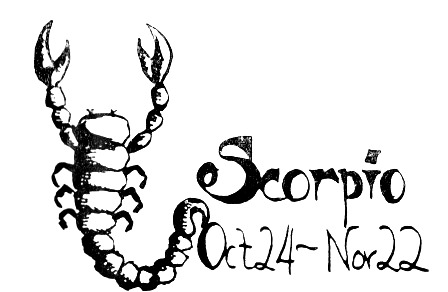
Arcadia
is the poets heaven,
the promised land,
which lies only in the mind.
I have seen Arcadia
it exists
in the mind
and in Cornwall.
Ian Simpson
NOVEMBER
—
The
lowering sun relents its heat.
The rains should be biting deep into the hard, dry
soil by now.
There should be a show of new winter green. Wisps of
wild flowers
should be pushing their way through crannies along
Maltese
country tracks
just there in the shelter of the walls where
the thin earth is gathered by strong north westerly
winds.
All those
things are there but weak — the rain is late again
as it has been these last three years.
Hal Far is the site of the altar on which we offer
up our
regular
sacrifice to the memory of one Guido Fawkes failed
revolutionary
of another age. And we have colour and noise and
Oo's
and Ah's and hot NAAFI sausages. In our school
assemblies the
body of the hall changes colour from khaki and light
brown to grey and navy blue. The gloom of November is complete.
Those
new to the Mediterranean realise, some for the first
time, that
It can be a chilly place. If it's like this now what
will
January be like?
In the classroom November is one of the best months
of the
year for hard solid work. Parents of the pupils in
Forms one and two
turn up at the school in scores for a discussion on
their
children's progress — or the lack of it. It will
soon be Christmas.
|
NOVEMBER
Clouds gathering, storming
leaves falling, frost in the air, chestnuts
crackling,
Guy burning, fireworks
lighting the sky, wind
chasing the shadows,
people
in overcoats, braving the
storms; snug behind closed
windows, rain pelting,
from clouds.
|
WINTRY SCENE
The first dark clouds appear covering the sky from
east to west.
The downward drip, the down-urge.
Pursued in water I sit on top of the wood,My feet are locked upon the rough bark.Forever
falling from the sky, the water unnoticeably.
The summer hangs drugged and winter ignites like a
spark plug
Faint flakes of snow trigger off and robins bob with
delight.
The heather in the glen-bottom sways with the sound
of the
rushing barn.
The white grouse scuttles from under the thicket
Fleeing the crex-crex call of the corncrake. Murray Kirkham 4M
|
.jpg)
LONDON 1943
The early evening clouds of a November day gathered
over
the shattered city streets throwing the dark shadows
between the houses into an even deeper gloom. The
sirens wailed out
their last dismal all-clear of the day. London
breathed a sigh
of relief, before the renewed night attacks. Not one
light showed,
not a glimmer from behind tightly drawn black-out
blinds. It
as at this hour that the streets came alive, men
coming home from work aided by the light of blue
paper covered torches,
women hurrying to finish their last minute shopping
and children
appearing from holes in the ground to Play in the
darkness
of the street.
As the night grew into utter dark the sky above the
city
became alive with the noise of bombers' engines, the
call of
the siren's voice sending those in the open
scurrying beneath the ground to shelter from the
bombs. The only illumination
now was the fingers of light probing for enemy
bombers in the
sky. Over to the East along the docks great flashes
showed the
resting place of the dropped bombs. Tracers dotted
the sky and
burst into a shower of lethel fireworks. The night
life of London
was awake. All night explosions and the sharp
ack-ack fire and
the peculiar rumbling noise that masonry makes as it
collapses.
While this goes on the people of London sleep in
their underground
hovels called shelters and tube-stations. As the
dawn
light crept over the city, tired firemen, voluntary
workmen and
soldiers put down their tools for a brief breakfast
before the
daylight onslaught. People begin to emerge from
their holes
and wend their way back to where they had left their
homes
the night before.
Lynn Mentiply 2A2
|
ICE
The north wind sighed
And in a trice
What was water
Now is ice
It, like a drop of dew,
Is clear and cool
And like a diamond
It's clear and hard.
Yvonne Wilson 2A2
.jpg) |
A CITY SCENE
Tall and slim, cold and bare With one
gleaming eye. That stands to stare The
lamp-post shines the welcome In the
city's darkest night.
Cats and dogs roam the streets
Scrounging for their daily treats
In the dustbins, in the drains
Down the cold and windy lanes
Oh! my city in which I live
Show your warmth and give, give, give.
Dave Taylor Form 4K
WINTER SIGHTS
With an awesome sight.
Hills, trees, valleys, dales - all
white! Frost on frozen window pane Like
sugar on a sugar cane Steaming hot
puddings and pies Icicles like
transparent knives Robin chirruping on
snowy tree What a wonderful sight to see
And this is winter so I'm told
Beautiful, breath- taking, and jolly
cold!
Jane Arbuththnott 2A2
|
THE SIRIAN'S CONQUEST
Jim sat at his desk. The worry and strain showed on
his
face in the form of dark rings under his usually
lively eyes.
The bell on his desk rang and a woman's voice
crackled
through an absolete loudspeaker system.
"Excuse me Mr Gordon, but there's a man asking to
see you.
He says he's from the "Octogon Council".
"OK you'd better send him in", replied Jim. He stood
up as
the man entered, accompanied by a robot body guard.
It was
the first time Jim had ever met anyone from the 'Octogon
Council',
the most powerful and influential organisation on
earth.
So he sensed it was something pretty important.
The man introduced himself as Mr Conrya. He wasted
no
time in getting to the point. "I am here on a matter
of the utmost
urgency'', he said "A signal has been received from
our
early warning station on Ganymede informing us that
a squadron
cf Sirian some bombers has passed Jupiter and is on
course
i:cr Venus. I think before I go on I
should tell you something
about Sirius itself. Firstly the name "Sirius" is
Greek for scorching
and as Sirius is the most powerful source of visible
radiation
in the sky the name is very suitable. It's diameter
is twice that
of
our sun and it belongs to Spectral class. A.1. It is
eight point
mine light-years distant. However of more interest
to us is the
star's companion, known as Sirius B. It is a white
dwarf star
with a density ninety thousand times greater than
our sun.
Sirius B has a family of seven planets, 'two of
which are inhabited.
One by an extremely primitive race. But unfortuntely
for
us, the other planet is inhabited by incredibly
intelligent beings. In fact they are at least five
hundred years ahead of us technologically. It is
they who are now approaching with just one
thought in mind, to destroy our colonies on Venus. I
must call
upon you Mr Gordon to organise and brief the flight
crews.
The method of attack I will leave up to you. "Good
luck" he
ended solemnly. He turned and left the office,
leaving Jim staring
open-mouthed after him.
Jim wasted no time. He couldn't afford to. Unless he
was
ready within two hours, it would be too late to save
Venus from
the might of the Sirian bomber force. He contacted
base using
the modern equivalent of the old holline telephones.
It was
known as the "telepathic Induction System" Colonel
Jennings
answered:
"Jennings here"
"Hello Bill, it's Jim. Listen we've got an
emergency, I
want you to send all available fighter ships into
lunar orbit"
"Something pretty big eh?"
"Something very big Bill, 150 get a move on. Tell
them
to remain there for one hour and then proceed
towards
Icarus which should intersect the orbit of Venus
just after
they arrive. Got that?"
"Yeah, I've got it, I'll take command of the
fighters myself."
"OK
Bill, but don't expect any medals for getting
yourself killed. Good Luck."
Six hours later the fighter force was waiting hidden
by a
lump of rock barely ten miles across called Icarus.
They were
waiting for the Sirian force to cross their path
tout they were
going to have a long wait. The Sirians had changed
course and
were no heading towards Earth. The first blow fell
devastatingly
on Moscow. With all its fighter defences forty-three
million miles
away, Earth was a doomed planet.
David Cranch
4K
THE FISH MARKET
Where I live there is a fish market. One day my
Uncle took
me down there, because he works there. My Uncle made
a funny
joke about a fish, but when we came into the market
itself the
laughing stopped. On the bare wall of the market
were fish
hooks, where fish were hanging by their gills,
Fishes were cut
open
and then men were ripping their intestines out.
I could have been sick but I carried on. The next
thing I
saw was a man with an axe which had a long handle
and a
sharp blade, which was covered in blood. The man was
perspiring
when he lifted the heavy axe up. He raised it high
above
his head and just let it go chopping the fish's head
off. Around
the market floor lay remains of unwanted fish.
The cats would come in and scavenge all they could.
Sean Beckett (Form 1H)
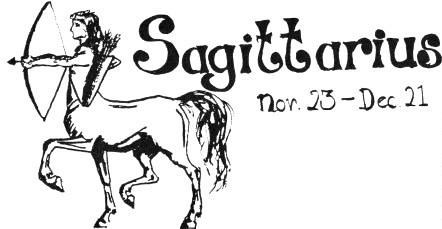
A CHRISTMAS STORY
"Twas the height of midnight and in the fields to
the North
of Belfast sit 4 shepherds playing cards and
drinking beer. They
hear a strange noise and get up, shaky with fright.
Then the
noise dies down, and a Lightning lands in the field.
Out from
the cockpit jumps the angel Gabriel.
"Do not be afraid, oh cowardly weeds," he says,
scraping a
tune on his harp. I bring great news. A Saviour, the
baby Philip,
is born of the virgin Frontis in a humble stable."
"What's that got to do with us stranger?" asks a
shepherd,
twirling a six-gun around his finger.
"You must go and praise the baby," says the angel
leaping
into his Lightning and taking off. The Shepherds
leap onto the Jet-propelled camels. "Tally-ho!"
cries the leader, "to Bethlehem!"
In a far off romantic land (N. Ireland) three wise
men sit
in a pub playing pass the parcel. -Suddenly,
'phone rings. A
muscular, handsome, intelligent looking person leaps
from the circle and dives for the 'phone.
"Hello, Kieran Smyth here," he says."Hello
Kieran, God here," comes the answer. "Could you and
your friends go to Bethlehem for me?"
"Yessir! I'll go immediately. Bye for now." He puts
down
the receiver and gets his presents ready. One of
them, David, lifts
up a packet labelled "Gelignite", and puts down
"jelly". The
other, Paul, wraps a mysterious looking parcel in
paper. Kieran grabs a box of 6 fresh laid
hand-grenades, then climbs into hs
Leprachaun Jet-fighter and zooms away.
In Belfast sits a worried Alison Harvey,
cmdr. in chief of
the Army. Suddenly in bursts a weary private. "Sir!
Kieran
Smyth, King of the Underworld has gone to Bethlehem
to worship
a king."Half
an hour later 10 Hercules take off, following three
small dots en the radar screen.
In Bethlehem. Frontis is sitting beside the baby,
cooing
it in a frog-like voice. Jeffrey, her husband, is
pacing up and
down, when suddenly he hears a great commotion
outside. In
charge 4 shepherds bearing, great gifts a book on
how to knit,
2 needles, a pattern and a ball of -wool. They kneel
down in
adoration. One pulls a crucifix from his pocket and
starts praying."Put
that away you erk," says the leader, "he ain't dead
yet."
The shepherd produces a Christmas Card and uses
that.
Then in came the 3 wise men. A small clock on the
side of
the mysterious parcel reads 5 mins. David is reading
the instructions
on the packet of jelly. Kieran is just about to say
something
when 20 soldiers jump in through the window, led by
Alison.
"Got
you now!" she screams. But Paul whips round with the
parcel.
"Catch!" he shouts, and charges out followed !by
David.
Kieran grabs the cradle, Jeffrey grab Frontis and
they charge out. 2 miles away they hear the
explosion.
"Merry Christmas,' shouts Alison, as she disappears
over the
horizon to spend her holidays in Hong King.
Kieran Smyth IB
DECEMBER — Red berries and cheery faces
No chance of a -white Christmas for us this year! We
have our seasonal entertainment presented to us ,by
the juniors assisted
by some of their elders. Cards are exchanged around
the
school in their hundreds -saves postage at least.
But the cry
goes up from many "Where's our party? Won't we have
a form
party?" And there's no answer.
And for those who cherish the idea of the Holy
Nativity and
do not feel that Jesus Christ has no business to
spoil our holiday
with his religious ideas Malta is a good place to be
for
Christmas. Happy weather for the 29th yet again.
Full churches.
Just that little more celebration, and less
commercialisation.
And the year turns on its axis and the shortest day
is passed.
1974 dwindles away. 1975 looms up as the year when
so many
look forward to returning home. Scottish thoughts
turn nostalgically
northwards to the land of the haggis and the merriment
of first-footing and Hogmanay. Here for us church
bells
ring out at the stroke of midnight and ships sirens
boom their
greetings round the echoing creeks of Grand Harbour.
Happy New Year!
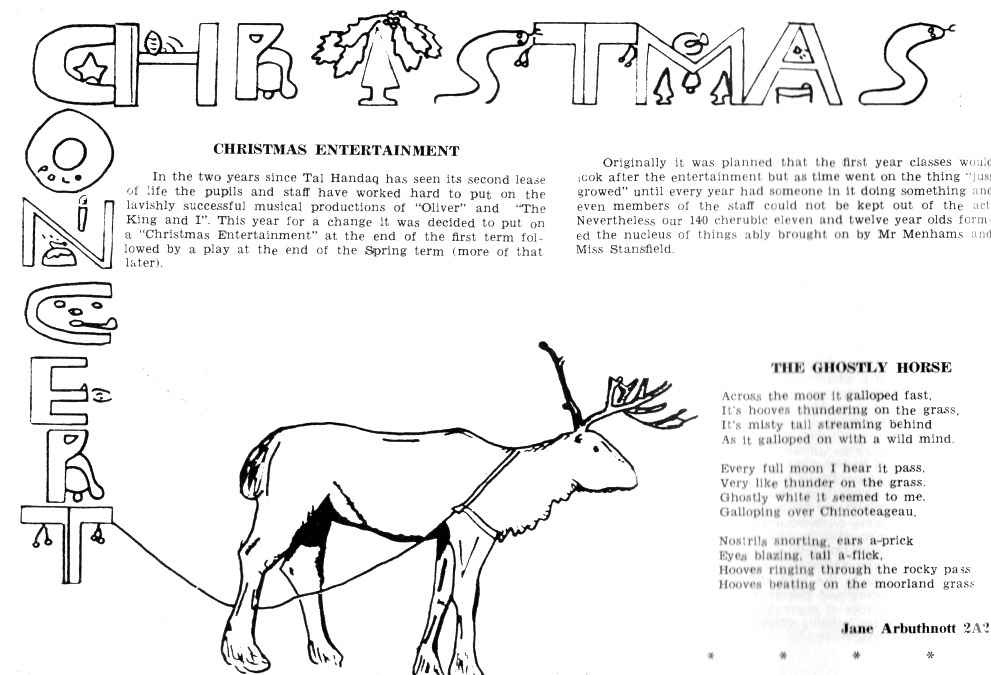
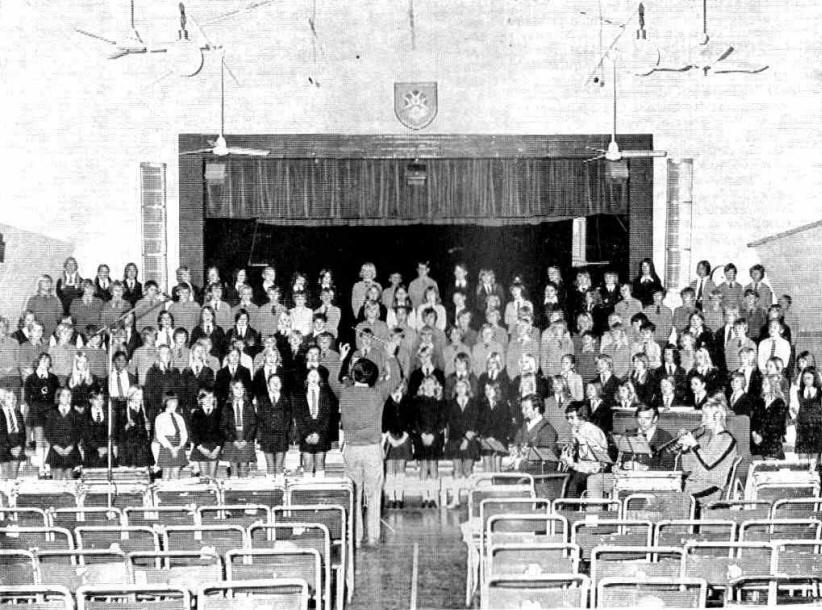
The
venue was the school hall and the dates were Friday
the
13th of December (the traditional bad luck
associated with
this day was shown in the teeming rain which greeted
the participants
and audience on their arrival) and Monday the 16th.
After a bit of audience participation in "Hark, the
Herald Angels Sing" we were given a spirited and
enthusiastic rendering
of
"The Cowboy Carol" by the First Year Chorus. Later
they
gave us the hauntingly beautiful version of "O
Little Town of
Bethlehem" and then the traditional "As Joseph Was
A-Walking"'
and finally a lilting Puerto Rican carol "Hasten Now
Ye
Shepherds".
The Lower School Choir, a smaller group of singers
made up from pupils in Forms 1 to 3, sang the well
known modern carol "Torches", "When Christ Was Born
of Mary Free" and the West
Indian song "De Virgin Mary". This group of singers
came over
well in the informal atmosphere of the concert. They
stood in
the
body of the skilfully arranged hall (Thank you, Mr
Leonard)
surrounded by their audience. They sang sweetly and
with obvious
enjoyment.
The
Recorder Group gave us an old fashioned English
Christmas sound with a couple of traditional carols
"How far is it to
Bethlehem", and "My Dancing Day" followed by the
well-loved
"Good King Wenceslas". Later the Guitar Club took
over the
proceeding for a few items under their conductor who
was
variously described by Commander Stubbs in his
elegant introductions
as "The James Last of Qormi" and "The Mantovani of
Marsaxlokk" alias Mr Woolams. Carol Jewell and
Christine
Smith provided the vocals in "I Don't Know How to
Love Him"
and
the "Amen Chorus", the latter another audience
participation
number which "made the joint jump".
We
had two other musical items. Firstly there were two
carols
from the newly formed Upper School Girls and Staff
Choir who sang "God Rest Ye Merry Gentlemen" and "In
the Bleak Mid-Winter".
There followed a duet for tenor and bass "In the
Depths of the Temple" from Bizet's "The Pearlfishers"
sung by
Mr
Taylor and Mr Singleton. This last piece struck a
new note
in
the entertainment and the soloists gave a lot of
pleasure with
their spirited and finely balanced singing.
The
music and dance item put on toy the Dance Drama
Group called "The Night of the Toys" was created by
the performers
themselves. This was full of surprises with plenty
of
changes of mood and pace. Not least of its pleasures
was the
24
delightful and evocative pieces of music chosen
to back the
dancing.
Passing through all this music was a thread of the
spoken
word, six pieces in all from students in the Upper
School. Starting
with John Betjemann's "Christmas" we were then given
a
nostalgic view of the great season as written by
Dylan Thomas
and
the amusing "A Visit from St Nicholas"' by C.C.
Moore. We
had
the well-observed nonsense of Ogden Nash's
"Children's
Party' and the very famous description of Scrooge's
reformation
from "A Christmas Carol" and 'finishing with the
more serious
"Joseph and Mary" written by James Elroy Flecker.
Two
hundred pupils took part in this splendid evening's
entertainment
with a dozen or more members of staff in support
notably the talented quintet of musicians who
provided backing
for a number of items. All in all the occasion was a
very fitting
way
of getting into the proper mood for enjoying the
Christmas
festivities.
DECEMBER 31, 11.59 p.m. 1974
Seconds ticking by,
pitchdark night,
nearly twelve,
watching the lights, shining across the valley.
Tom cat in the alley,
hollering loud.
What a year we had.
Scandals every place.
News of the World pushed for space.
Few seconds to go,
time drags so slow.
Back home bells ring,
as choirboys sing.
a new year's hymn,
cos 1975,
has finally arrived.
Ian Simpson 5th year
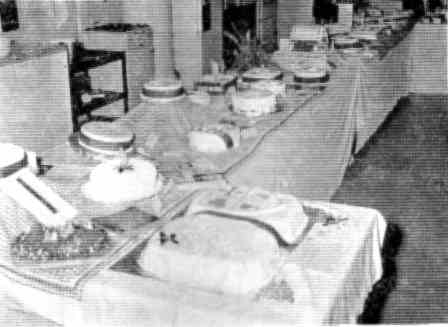
THE CAKE COMPETITION, CHRISTMAS 1974
The Christmas Cake competition was held at
the end of the
winter term and the cakes were judged by the
staff of the
Needlework
Department. About thirty-five cakes were
entered —
from the third years with cakes rough iced and from the fourth, fifth and
sixth form cakes with piped designs on
smooth icing.
Alison
Duncan won first prize for her rough-iced
cake, the prize
for
design in the senior section went to Alex
.Rowland, and Jill Cartwright came first for
piping skill. There was a lovely display
of Christmas cakes this year, along with a large book cake for
St
Patrick's
Orphanage, a ginger bread house and many
Christmacy
decorations as can be seen in the
photograph.
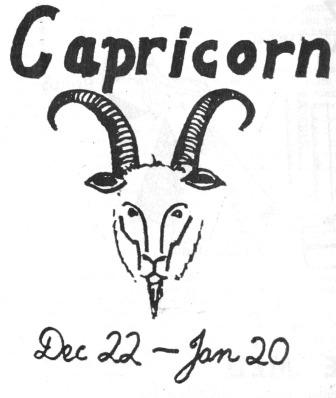
JANUARY -"Winter slumbering in the open air."
For 65 members of Tal Handaq there
was a very early return
to school in 1975.
On Thursday the 2nd they were all
back in
familiar haunts but only to deposit
luggage and pick up their
buses for the Uganda special.
Twelve days away from it all in
a world of discos, films, pyramids,
temples and the every present
sea. They even missed the first two
days of school. One consolation
for the rest of us was the longest Christmas holiday
in
the history of the school—except for
ill-famed one which started
in December 1971 and ended in
September 1972.
January is the drabbest month in
Malta. True we do not
have our very dark English mornings
with the sun not showing
itself before 8 a.m. But it's cold
and the houses are built in the
belief that temperatures will never
drop below 45°. And we should have lots of rain to
send brown streams down the sides
of the roads, to turn Msida
roundabout into a shallow lake. And
Christmas is a year way. And we've
got to work again. And we
have eight bells at the end of
a French lesson. And exams are
almost upon us. What a life!
JANUARY — SATURDAY
|
Grey sky
wet salt spray
majestic day
surf roaring
clouds tumble blindly
Blue, grey sea
undisputably free flecked with foam
free to roam
Winters day
January Saturday
I wish I could stay
Sky turning black
best get back
but it's a different rhyme
in six months time.
Ian Simpson
**** |
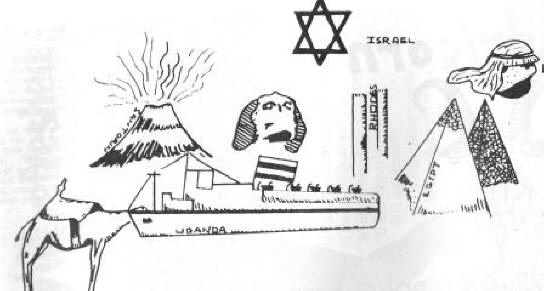
After much prior
preparation, briefing and excitement we
finally boarded S.S.
Uganda which was to be our home for
twelve
days as we sailed around
the Mediterranean.
Our first port of call
was to be Alexandria, at the head of the
Nile Delta, in Egypt, and
after two long days at sea we arrived.
Our first impression of
Egypt as being surrounded by what
seemed like hundreds of
little Arabs trying to sell you anything
from
huge, fluffy stuffed camels, to green
scarab rings. Alexandria was a rather dirty,
smelly city, with the majority of the
inhabitants living in squalor and
bringing their children up in
the gutters, teaching
them how to beg.
Egypt is known as a land
of paradoxes and this is emphasised
in that there is quite a marked contrast
between the
rather westernised
appearance and life in the larger
cities, and
the way of life in small
villages and flat areas around the Nile
river. Here life has
hardly changed for what seemed like
hundreds of years. The people still work
on the land using manual
and animal labour,
irrigating the fields with rather
primitive
busy main road from
Alexandria to Cairo. It is hard to
imagine
methods and living in mud
huts, often along side the long and
Unit, only a few miles
away is an industrial and commercial
world in progress. Another sight that is
very striking and peculiar
to
Egypt, is people sitting on the top of
trains and hanging
onto the sides of the buses. A very
dangerous, but exciting, way
of
travelling from one place
to another.
Cairo is the capital of
Egypt and it is built along the banks of
the
River Nile. Like all Egyptian cities it
is a mixture of squalor
and commerce. Whereas the ancient sights
of Alexandria
no more, Cairo has many places for the
tourist to visit.
The
tomb of Tutankamun can be found in the
Egyptian museum
in Cairo, but to many of us this
exhibition was rather a disappointment,
being only a part of the total find and
a great
comedown after all the publicity it has
received in previous
years,
but it was quite an experience to be
guided by our plump
Arab friend Moses!
The Citadel and Mehemet
Ali Mosque are a magnificent sight in
the
old part of Cairo. The Citadel,
being a fortress city, and the
mosque named after a
famous Egyptian leader. The mosque is
highly decorated in
intricate detail with hundreds of lights
to show
off its magnificent beauty and
architecture, and there
is an elegant
tomb made of pure alabaster stone inside
the
building.
The highlight of a visit
to Egypt, and of many peoples
cruise was our sight of
the three pyramids, situated just
outside
Cairo at Gizeh. We saw the magnificent
great pyramid and
realised|
how huge these monuments are — 480 feet
high is the largest. We then went on to
see the sandy coloured Sphinx. The
pyramids are also made of the huge blocks of
sandy rock, and
they fit
into the desert scenery
perfectly. As always during our stay
in Egypt we were
surrounded by vendors, but this time
there were
also camels everywhere!!!! Many
people are wrong in their
assumption that the pyramids are right
in the middle of the desert. True they are in
the desert, but only about a quarter of
a mile outside Cairo.
Our next port of call was
Beirut, in the Lebanon, where we stayed
for 16 hours. I was
told that when visiting Baalbek the
party
drove in
coaches up to 5000' feet above sea level
and they
actually
saw snow, which was
something different for the Maltese
students who
never see snow. They visited the temple
city at Baalbek
where there are temples to Venus and
Jupiter, everyone returned to the ship
very cold and
numb! Unfortunately I was confined
to bed all
day, but I was also lucky enough to
have someone to take me
around the cosmopolitan city of Beirut
by moonlight. I was very interested in a
Lebanese market
called a "Stuk", (sic) they are all under
cover behind the other very modern
stores in the city. It was a rather wet
evening and so
everywhere was rather muddy. However I
am now able to boast
that I have actually
stepped on Lebanese soil and been to
Beirut.
My favourite country of
those that we visited was Israel. It is
the most peaceful and relaxing place I
had ever been to and was not as I had
imagined it to be — that is surrounded
by a
feeling of tension. The scenery of
mountains and valleys was
beautiful, and in many places it
reminded one of Scotland -with
green forests and hills. Also, we were
told by our guide,
Tobias, that 60 per cent of the country
was desert but we did
not see much of it. Again we travelled
in coaches to the east
of the country from the coastal city of
Haifa. Our first stop
was 208 feet below sea level looking
down onto the Sea of Galilee.
Across the valley we saw the Golan
Heights which have featured
in the news recently as they are the
point where the three countries
of Israel, Syria and the Lebanon meet.
Our next stop was at the shore of
the River Jordan, just where it meets
the Sea
of Galilee. We collected pebbles and
took photographs as souvenirs
of this historic place. At last we
reached Tiberias, a small
town on the banks of Galilee, and we
were taken across the
huge lake to Capernaum in a small motor
boat. Unfortunately,
our Padre on board could not be
persuaded to walk on the water!
At Capernaum we saw the ruins of an
ancient synagogue and
the site of St Peter's house. On our way
to Nazareth, we stopped
to see the site where the 'Feeding of
the Five Thousand' took
place. Here an early Byzantine church
had been built and decorated
inside with an attractive mosaic floor,
and a painting of
Christ above the altar. Way up above the
road we could see another church on the
Mount of the Beatitudes, commemorating
Christ's teaching of the disciples after
he had chosen the
twelve apostles.
The highlight of my visit
to Israel, and probably the whole
trip, was our arrival in Nazareth, and
our visit to the Church
of the Annunciation. It is the fifth
Roman Catholic Basilica to
be built on the traditional site of
Mary's home at the time of
the Annunciation. The present church was
constructed in 1969 after the demolition
of the previous one and is built over
the
cave-like grotto of the Annunciation. It
is exquisitely decorated
inside with huge mosaics
on the walls as examples of Bible
stories connected with
the birth and workings of Jesus. The
mosaics are all
characteristically drawn, as they come
from
countries all over the
world.
We also visited two
Jewish 'Kibbutzim'. These are communal
farms that are one type of agricultural
development which
forms part of the great
effort being made in Israel to support
the country's economy. In
the Kebbutz there is no personal property
allowed, and all the inhabitants,
anything from 300-1000,
all work for the common
good. Inside these centres whole communities
have set up their homes and live and
work together
for each other. Each
centre has a main building with a large
hall which is used for
social events and where souvenirs are
sold, a farm and, of
course, a synagogue. The commune we
visited
had a flourishing library and school.
To me Israel was a
wonderful country and despite all the
trouble and disruption
caused by the agitation between Jew and
Arab, the people are very
friendly and welcoming like the country
itself — just as one imagines the Holy
Land to be.
Very unexpectedly, we
visited the Greek island of Rhodes.
We arrived in Rhodes on a
very nice, fresh, breezy day and spent
the whole day
independently touring the old fortress
city. The
capital of Rhodes bears
the same name as the island itself.
It is a very attractive
little place full of tiny streets,
squares
and fountains. The old
city is composed of old established
buildings: the Palace of
the Grand Masters, the Hospital, the
Street of the Knights of
'St. John. This part of the city was of
particular interest to us
because the Knights of St John left
their mark,
architecturally, in Rhodes before they
came to Malta.
So in this way, Rhodes is very like
Malta, especially the first
view you see of the
fortress walls.
It was in Rhodes, I'm
sure, that most souvenirs were purchased.
The maze of interesting streets contains
bazaars full of
exquisite Grecian pottery
including beautifully painted plates
and vases.
Other views in Rhodes
were the attractive entrance to Mandraki
harbour where the Buck (symbol of
Rhodes) and Doe stand
guarding either side of
the entrance: three old but very charming
windmills with red roofs and still with
their wooden sails,
and from the quay across
the water from Rhodes one can see
the snow-capped mountains
of Turkey.
Armed with all our
souvenirs and frozen fingers we left the
attractive island and the
friendly people of Rhodes and set off
again on our way towards
our last port of call, San Torini.
San Torini is another
Greek island and is situated in the
southern Cyclades, 147
miles from Rhodes. It is a volcanic
island
formed in 1500 BC when a
dramatic eruption blew the top off
mountain and the sea
poured into the crater through the
cracks to form the three
islands of Thera (San Torini), Therissa
and Aspronisi. Uganda
docked in the crater and we approached
the island of Thera on a
chilly morning in the ship's lifeboats
To reach the town of
Phera we had to ascend a steep stairway
which was 587 steps to the top, and I'm
told on good authority that it was 600
or more feet up. The majority of us took
the
plunge and, along with
most of the Staff
(!)
braved the only
means of transport -—
donkeys and mules! It was quite a hair
raising experience but
one I'm sure that everyone will remember.
Unfortunately (or may be not) we had to
walk down to
tiny harbour after our
visit to the town. In the town we walk
up and down narrow
cobbled streets lined with small craft
shops and cafes. There was a very
attractive church — the new Orthodox
Cathedral — that was a pleasant sight
above the harbour,
Really there were no
sights as such on San Torini, except lm
the beautiful views
looking up from the harbour and down
from
the town on to the
volcanic rocks and other islands
surrounded
by deep blue sea, and the
contrast of the white buildings against
the deep red rock. We
found pumice stone and bought souvenirs
before returning to SS Uganda for our
trip home to Malta,
So the time came to
return home, and home we came loaded
down with memories and souvenirs. I must
admit it was a nice
thought to be peramnently
on stable ground again after an
often 'bumpy' ride to say
the least!!! But it was certainly a
contrast to all the
interesting and famous places we had
visited
during our twelve day
tour. The trip on SS Uganda and our
visits to Cairo and
Alexandria in Egypt, Beirut in the
Lebanon,
the Holy Land, Rhodes and
San Torini were certainly very enjoyable,
interesting, eventful
(!)
and worthwhile. All of us who'
went will remember this
time in years to come as a very memorable
experience.
LIFE ON THE UGANDA
The question I asked myself as I walked
up the gang-plank,
was what was life really like on
board the UGANDA,? I had!
seen many photographs of the ship, and a
film about a similar
cruise.
As we came in it didn't
seem natural with a school office that
had Christmas decorations
up. The person we first met was
Master
at Arms. I thought that these members of
the crew
would
be the sternest, but quite the opposite;
he was very
friendly
and made us relax,
Our
first night at sea was very tiring. This
was because we didnt
get to sleep until 2 a.m. The next
morning we got up to
the
roll
of the ship. No one really felt like
breakfast but by
dinner
most people were able to get back
on to proper food. That night no one
felt like staying awake and everyone was
asleep
by 10.45.
The next morning the sea had calmed
down, and everyone
felt much
better. That day I was able to really
appreciate the
ship's lessons.
The assembly hall periods were very good
and
us advance information on the places of
our visit. Class
periods were a bit boring, but it's all
part of the fun. My
favourite
lesson though was deck games. We could
play hockey, tennis,
quoits and swimming.
The next day
we docked at Alexandria. Soon we were on
our I
was really impressed by the tour of
Cairo and the pyra-Wn came back on board
ship laden with souvenirs of all
description.
That night we talked about the sights we
had seen. The next day we walked around
Alexandria. We saw how
mm
people live, and it made us realize how
lucky we are,
in the afternoon we left Egypt for
Beirut It was back to
us and work, but nobody minded because
the next day
we were docking at Beirut.
That evening we had a fun-fair. It was
great fun and everyone had a good time.
The next afternoon we had a tug of war
competition, which was good
fun. Our team had to pull against some
16 years olds. We lost.
At 6 p.m. that evening we docked at
Beirut. Everyone wanted
to
go ashore,
but had to wait until the next day.
The next day came and we were soon
ashore on our tour to Baalbek.
As we went right up to the mountains,
were we
stopped
to have a snowball fight.
We returned that night tired out from
the mountain air.
The next morning we found ourselves
docked at Haifa. We were going to
Jerusalem but the war made it dangerous,
All the same
we did have a good time.
The next day we were at
an extra port, Rhodes. This was
because of the
cancellation of the trip to Jerusalem.
In the
morning we went around
the old city of Rhodes. We came back
on board fcr lunch and
then a few of us went to Lindos, a
small village in the
south of the island.
Next day we came in to
the volcanic island of Santorini. It
was great to watch the
sun come up over the rocky outline of
the island. We had to
walk up the steps to the village, all
508
of them. All too soon we
had to go back on ship.
The next day was spent in
packing and spending the last
of our money. After the
farewell disco we suddenly realized
that it was the end of
the cruise.
We had learnt many things
during the cruise, but the biggest
one was to live with other people,
something we all have
to do.
Clive Wood 3D
TAL HANDAQ'S CLAIM TO HAVE AN ENTRY
IN THE GUINNESS BOOK OF RECORDS?
Is this a record? In twenty-four hours
during our cruise
1 used up over thirty sick-bags, and to think I
paid for this
trip. Well, my parents did. Twenty five bags were used in our dormitory.
This is how it went:
(a) Was sick in dorm. Was sick again,
and again, and yet
again.
(to) Was taken to sick bay.....
I
will rephrase that, I was
taken to matron.
(c)
I was force-fed a roll and a seasickness
pill. Was told to
go on deck.
(d)
Look out on green mass of undulating
water. Brought up pill and roll.
(e)
Went down to dorm. One more bag full.
(f)
Boys in dorm. Chant "Greasy bacon!
Three year old
mouldy chips!" Was sick again.
(g)
Return to the beginning. The boys in my
dorm were
going to have a whip round to buy me a
gold plated sick
bag, but I was too sick to notice!
Everyone said "It's all in the mind",
but it wasn't. It was
in my tummy and coming up fast.
Peter Smith 2A1
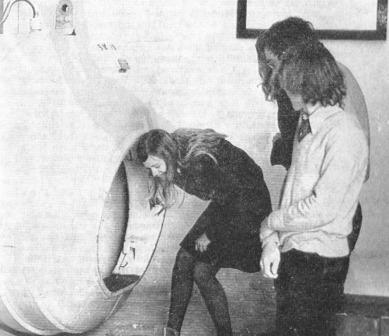
A VISIT TO THE RECOMPRESSION CHAMBER
On the 24th February, a small party of
pupils and staff from
SCS Tal Handaq, who are also members of the
Calypso Subaqua
Club, visited the Recompression Chamber at HMS St. Angelo
The main purpose of the visit was to
familiarise divers to the
Recompression Chamber in case of
emergency treatment.
At sea-level the pressure on our bodies
is fifteen pounds per-square inch, owing to the weight of the
earth's atmosphere. If
one takes to flying, the pressure on our bodies decreases to
about half of this at five thousand
metres above sea-level because
there is less air above us to exert a
pressure. As one descends into the sea, however, the pressure rapidly
increases to
twice the normal pressure exerted on our bodies at ten metres
depth because of the weight of sea water.
The further one descends, the greater the pressure exerted on
one.
At ten metres depth the diver will be
breathing air at twice
atmosphere pressure, and therefore he will be
consuming twice as much air as usual.
Because he is breathing air at twice the
normal pressure, twice as much nitrogen can
be dissolved in
the blood. (N.B. Nitrogen is harmless to the
body, but provides
a hazard to divers). This concentration of nitrogen tends to
collect around the fatty tissues of the
body, especially the spinal
cord and the brain. If one stays at
this depth, the time will be
reached when no more nitrogen can be dissolved into one's
blood. This is saturation point.
Now, when one rises to the surface slowly
the nitrogen
comes back out of solution and is exhaled, but
if one rises too
quickly the nitrogen in one's blood doesn't have enough time
to come out of solution, and consequently
starts to form bubbles in the body. For
instance, bubbles in the fatty tissues and
synovial membranes around the joints lead to the stretching of
nerve endings in the tissues. Pain around
them gives rise to the
condition known as the "bends" or
decompression-sickness.
The only way to remove these bubbles, is to
force them back
into solution, by putting him back to the
pressure he was at
before, and bringing him back to normal pressure very slowly.
If all the nitrogen is removed like this, he
should return to normality, but in severe cases, and cases
where recompression is not
possible, paralysis and death may occur.
The recompression chamber is a very strong
chamber on
dry land, made of steel in which the air
pressure can be increased by pumping air in, using a compressor. A diver who is suffering
from decompression-sickness is placed into
it, and returned
to the equivalent pressure corresponding to
the depth
he was at before. The nitrogen bubbles
in the blood are forced back into solution.
The pressure is then very slowly reduced so
as to let the nitrogen come out of solution in the correct way.
The advantages of the recompression chamber
are numerous.
The diver does not have to get wet, and a
doctor can be in the
chamber with him to keep him under close surveillance for
the duration of his decompression, which
would not be possible deep
in the sea. The air-pressure inside the
chamber, which is being
supplied by the compressor, is also
regulated very carefully from the outside by
an attendant who is following special tables
for
decompressing.
On our visit, we were taken down to the
equivalent pressure of thirty metres of sea water which is
four times the normal
pressure exerted on us at sea-level. To those of us who
had not
been in the chamber before, the sensation
was quite strange.
As the pressure increased and we were
continually "clearing"
our ears, the temperature inside became very
hot. The attendant
who was
inside with us had taken precaution of
bringing a bucket of water, in case
of fire!! When we levelled off at the
equivalent pressure of thirty metres, we
began to talk; we each
sounded
like Micky Mouse because at this pressure
the voice box
is
affected.
At this depth, intellectual reasoning
becomes extremely difficult and much to our amusement, our
Mathematics teacher was
unable to do simple addition!!!!
As the pressure decreased the chamber became
extremely
cold and we could hardly see the other side
of the chamber for
condensation of our breath. In the end,
though we were all glad
to return to civilization, we felt happier for
our experience.
Ian
Simpson, SCS Tal Handaq Calypso Diving Club
6th year
THE MALDIVE ISLANDS: GAN, THE TROPICAL
PARADISE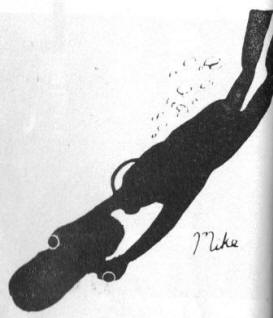
On Thursday, January 2nd, my dad and I took
off in a plane
from Luqa bound for Gan. We made an overnight
stop in Cyprus
where we stopped with some friends. Next
morning we were off to the Maldive Islands
in the Indian Ocean. After an eight-hour
flight in
a V.C.1O we reached Addu Atoll and landed in
Gan, the small island which acts as a
staging post for R.A.F. aircraft
flying to the Far East. After landing the first thing we did was
to get
some sleep. Sixty-three was our room number.
It was situated
very near the runway so we heard every plane
taking off
and
landing.
On Sunday morning, the 5th of January, we
met members of the diving club and went for
a dive with them just in front
of the clubhouse on what they called the
Club Reef. We dived
with Mick Turner. Compared with the water
around Malta there
were so many fish
that it was like diving into an overstocked
aquarium.
There was coral all over the place. On this
dive we
stayed
down about forty minutes with a maximum
depth of
about
seventy feet.
Because the water was so warm we did not
need to use our
wet suits; but we did wear T-shirts to
protect ourselves from
the sun when we were on the surface.
On Sunday afternoon we had a boat dive of
Manadu Island near Gan but we could not go
too deep because it would have
meant us running into decompression time.
Graham Abraham was the dive leader and John
Sherman and I followed. There
was plenty of Stag's Horn coral about the
place and I kept on
Cutting myself. We saw five or six scorpion
fish which can sting
Inn are beautiful to look at. Also during
this dive we saw a
pair of large grouper. When we came out of
the water the first thing
I
did was to treat my coral cuts with
antiseptic because, if you don't.
cuts become infected quickly as I found out
after
One of the dives when I forgot to treat
them.
During the evenings of our stay we had our
meals in the
transit hotel and spent the rest of the
night reading and writing
letters.
During the rest of the week we had five
other dives. Two
of them
were on the Club Reef but because the
underwater scenery
off Gan was new to us we were never bored.
Another dive
We did was in the water between Gan and Fedu
the next island
to the north. Here we did a drift dive
letting the current carry
us
over different types of coral.
A short but interesting dive was on the Wave
Ruler, a ship ....
anchored
in the lagoon. On the underside of the ship
a coral reef
had started to grow and the fish who had
orientated themselves
to
their
surroundings and swam upside down! Because
the current
was so strong we had to abandon this dive
after only seven
minutes.
Friday the 10th soon came around and we
packed all our
equipment into our suit-cases. The
lead-weights were too heavy
to
carry back so we left them with the subaqua
club. We had a meal about 8 p.m. expecting
to take off at ll p.m. but due
to a
long delay we did not take off until about 4
a.m.
The plane touched down in Akrotiri to refuel
and from there we wore off not to Luqa but
to England. We were unable to get
aflight
from England until early Tuesday morning.
Our trip had lasted almost exactly the same
time as the
school
cruise. If the people on that enjoyed
themselves as much
as
we did then they were lucky.
Keith Naylor (Form 5K)
BEATAE MEMORIAE
A ripple proclaims the disappearance of a fish into
the depths, and the
trees sway in the breeze.
On my right, the river flows around the legs
of a stone heron
waiting for its prey.
To the left, lies man. The field
rising steeply, blocks out the
imposing church tower.
Ian Simpson
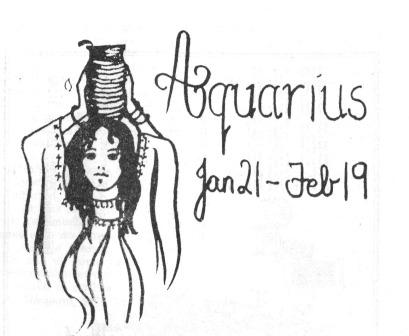
FEBRUARY
—
Cold February blows on her thumb ..
The wettest month of the
winter so far with the last Thursday
dark and cold. Eight -bells were rung twice
for our protection
but we still got wet. Oh for a covered way
that really
covered! However, the earth
repayed her gift of moisture,, with
a confusion of wild flowers.
At last the poppies shoot up their
scarlet
and promise that warm days are not far away.
Boys
sweat
across country: girls skip up the yard
tossing their pancakes
as they go.
Meanwhile back in the school
hall mock exams prove they
are not so funny. No assembly
for a fortnight. It's an ill wind...
We have Fifth and Sixth Year
Parents' inquest. Lower down the
school, the Third Form are
given a pamphlet with advice on options
for their subjects for 1975-76. Scratch your
heads and stick your pins in.....
the list subjects.
Lady Previous flows on as
Miss Beckett's fingers turn blue
with the cold of the unheated
hall. Notices begin to appear all
over the school to tell us
about the Fashion Show and display
of things Eastereal.
|
AUNTIE MAY
Now here is a story of Auntie May Who thought she had strange powers.
She'd sit in her bedroom, all
alone
And meditate for hours.
We usually left her well alone. "Poor soul," we used to .say,
For though she was a little
'queer'
We loved our Auntie May.
One evening, though, she went too far.
For she came down to tea
In nothing but her birthday suit
For everyone to see.
Her face paled as she wildly screamed "You'll never stop me, never!"
Then with one last heart-rending wail
She fled from the room for ever.
We often wonder where she went And hope that she will call.
For where could Auntie May have
gone
With nothing on at all?
L. Lauder 4M
THE FOUR
SEASONS
Snow and sludge...
slipping... sliding...
slithering
On ice.
Whiteness — Persil Whiteness.
Feather-like flakes floating,
Nettling, to form a blanket over
frozen gardens.
Buds and birds bring signs of
spring,
Awakening the drudge of winter
lifelessness.
gamboling lambs, daisy-spotted
fields,
And light-heartedness knowing
that summer is on its way.
Seaside, sun and shrieks of
summer-holiday hysteria.
Band, buckets and spades,
Melting ice-lollies, flipping
flip-flops.
Sunglasses, sunshades, Ambre
Solaire.
Summer's here.
Green turns to gold,
Summer turns to Autumn. Back to
the bind of books and school in
September.
Conkers craze, blustering winds
cause
Trees to shed carpets of leaves.
Susan Dearlove 6A
|
THE WILD ANIMAL
The gazelle senses the
watching eyes, While traversing
the African grass The animal
catches her by surprise, Her
warning cry is to be her last.
Ripping and tearing at the still
twitching flesh, Warm blood from
the wound is still very fresh.
The scavengers assemble not far
away They wait for the
leftovers, their meal for today
He leaves this scene of death
and carnage,
And slinks away into the foliage
He creeps about very aware,
Detecting other beasts by their
scent in the air
Then all at once, he's
confronted by,
A huge fierce tiger, one of them
has to die.
They both leap together, after a
pause.
Flying through the air, while
brandishing their claws
Gouging at each other with all
their might, Both parties make
this a frenzied fight. The grass
has changed from green to red,
The animal has wen, the tiger is
dead.
He crawls away to have a rest,
To recover from this gruelling
test.
But he has won, and feels the
pride,
Of a superior animal, that stays
and fights, and doesn't hide
From sleeping peacefully, he
awakes with a start
He has caught the scent of a
grazing hart
He jumps up, alert, and begins
to prowl
The ever impatient hyenas,
sensing food, start to howl.
This time the wild animal
feasts,
On the daintiest of all the
beasts.
One day the wild animal, too,
will be killed,
For the balance of nature to be
fulfilled.
Lee Paps 5L.
SPRING
Spring is the dawn,
the new years morn,
when life will arise,
and rub sleep from its eyes.
Newness will be felt,
heard and smelt,
all around
in the air, on the ground.
And now winter has gone
Life must go on,
Spring is in the air
and everywhere
else about you.
Ian Simpson
|
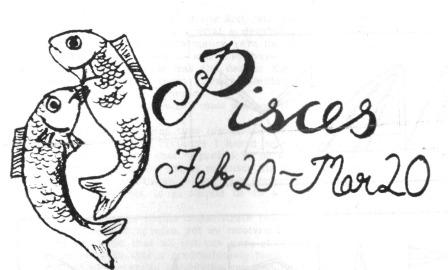
MARCH -Green
and yellow and blue and red
Our rainfall tops thirteen inches since
September. These last two
comparatively
wet months have helped to bring the island
to a peak of lush greenness. Well, it seems lush, if our
memories don't bring back pictures of rolling hills of Somerset,
Yorkshire dales and rich lake-side vistas of
Cumberland.But at least in Britain they are
not enjoying our balmy temperaturesand
our blue seas. Snow on Good Friday. Brrr!
Lady Precious Stream has its three day run in the first
half
of the month — a great delight to all who go
to see it. Final option forms
are given out to our Third Years and parents come up to
the school
to get help in sticking the pins in. A
successful poster competition is held to herald the Fashion Show
that happens on March
22nd in a hall that still doesn't quite look
like the salon of Christian Dior, in spite
of decorations, red carpets and a host of pretty girls.
And so another term winds down. Over thirty pupils are leaving us this
month. The flood of leavers is gathering
force. The number
of people left from those who restarted the school after
the withdrawal
of 1972 is rapidly diminishing. Even now
the hot breath of the examiners is felt on the necks of
innocent
Fifth Formers. Mr Clemens and Miss Dickinson
are the gentle inquisitors at their CSE
English oral ... And Mrs Singleton leaves
again.
| DREAMS
Dreams, their doubtless queries
subside.
Dreams, murky corridor and leather
hide
Dreams, a time when thresholds part
Dreams, of timeless conscience to
cart,...
Around your mind in dolful solitude.
Neon lamps cast shadows of the nude
Sentimental, undying hope, .stays in
your-thoughts,
When cyclop's single stares,...
A thousand dying cares... wandering
cares,...
Yes wandering, always wandering,
Do we ever stop our pondering?
Perhaps the insane ones far away
Will teach us a game we can easily
play.
Perhaps love, or fear, or crime
Games of lush, sweat or slime.
Oh Goddess please don't let me
awaken
To stand and find it's all 'been
taken,
From my dreams
A million screams!
I love my dreams.
Jane Arbuthnott -2A2
|
PORTH BEACH
Men shouting and children's laughter
A year of dreams and plans
is reflected by the noises
and happiness on the sand.
On the island an artist
sits with wind blown hair
sketching the beauty
within her stare.
So many people
Happiness your own way
and for everybody
a perfect day.
Ian Simpson
|
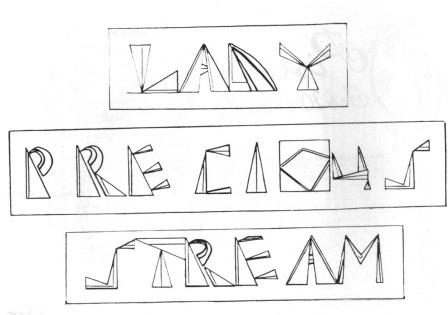
It is in no way a criticism of the
first-rate shows presented
regularly by Tal Handaq to say what a
delightfully refreshing
break from tradition this performance gave us.
The better the School's products have been — and
they have been very good
Indeed -- the more obvious was the danger that
'pop' shows,
wilh
themes and
catchy tunes already familiar to audiences,
might
become the regular practice.
"Lady Precious Stream" was a most welcome change
in every way.
For one thing. I suspect that few of us knew
much about
the play beforehand, and certainly I heard
several people expressing
pleased surprise that it proved to be so
humorous.
Secondly, — and again this is no snide dig at
the excellent
Principals' of previous shows — the cast
consisted entirely of
pupils, which, one feels, is as should be in a
Comprehensive
School.
Not -only did these pupils demonstrate that
they are well
able
to carry the leading roles, but we received yet
another surprise
when we found that all but one were girls. The
producer
had
decided to make this a predominately female
presentation,
with
nine out of
ten males occupying very secondary positions.
Or
perhaps, under the circumstances, one should say
there
decidely more 'Yin' than 'Yang'.
The choice of this play produced yet another
pleasant variation
on the more
usual theme in that it brought s a typically
Oriental
slant on
life which was light, deft, and — to use the
unavoidable word -- charming.
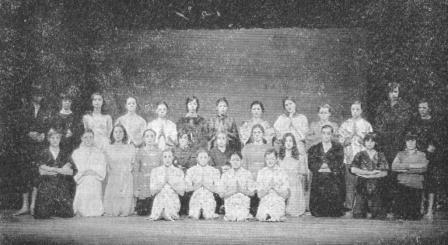 The
English public-school tradition that 'manliness'
means
taking a daily cold shower and playing rugby is
incomprehensible
to many other races, especially Eastern
ones, among
which
there is nothing odd about extremely tough,
earthy characters
pausing to
weave a tropical flower into the thatch of the
roof
above the door. And something of this 'dual
nature' attitude
comes over in "Lady Precious Stream". Perhaps
this is why it is
equally possible to make the cast all males, all
female, or a
mixture of both. Julie Taylor, as the Prime
Minister, handled
far-from-easy
part extremely well. Beginning (at least on the
night when I saw the play) by speaking her words
rather fast,
she quickly settled down, and continued from
then on to enunciate with absolute clarity.
The Prime Minister is responsible
for many of the play's most humorous lines and
situations,
which means that the part is full of
difficulties and possible pitfalls. Julie trod this
dangerous path with skill and assurance,
neither overplaying nor
wasting her opportunities. The
English public-school tradition that 'manliness'
means
taking a daily cold shower and playing rugby is
incomprehensible
to many other races, especially Eastern
ones, among
which
there is nothing odd about extremely tough,
earthy characters
pausing to
weave a tropical flower into the thatch of the
roof
above the door. And something of this 'dual
nature' attitude
comes over in "Lady Precious Stream". Perhaps
this is why it is
equally possible to make the cast all males, all
female, or a
mixture of both. Julie Taylor, as the Prime
Minister, handled
far-from-easy
part extremely well. Beginning (at least on the
night when I saw the play) by speaking her words
rather fast,
she quickly settled down, and continued from
then on to enunciate with absolute clarity.
The Prime Minister is responsible
for many of the play's most humorous lines and
situations,
which means that the part is full of
difficulties and possible pitfalls. Julie trod this
dangerous path with skill and assurance,
neither overplaying nor
wasting her opportunities.
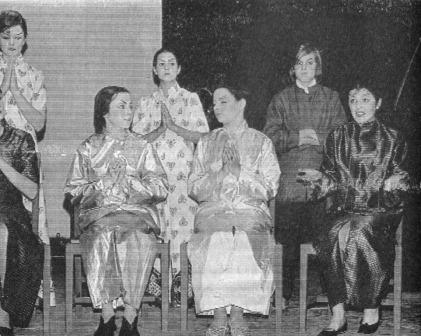
Debbie King, as the wife of the Prime Minister,
also gave
us an excellent performance. The basic
characterisation comes,
of course, from the author, but as someone who
has met a
number of Chinese wives, I can assure her that
she gave a very
credible interpretation of the Oriental wife —
at least among
the educated classes — who may appear to Western
eyes to be
subservient to her husband, but who knows
exactly how to have
have her own
way in everything that matters!
Veronica Haste, as the Gardener, had the
difficult task of
flitting, as it were, from one character to
another: gardener, poet,
king, not to mention husband with a persistent
and voracious
lover in pursuit! She managed all this with
apparent ease, and
many of her humorous lines gained by being
spoken with an almost 'deadpan' expression. It
was an ironic trick of fate, and
one
which earned the amused sympathy of the
audience, that
she suffered her only lapse of memory at a time
when she was
supposed to be reading!
The two Generals (Karen Fretwell and Susan
Fitton) both
brought just the right touch to their
self-important characters,
and it was only the emphasis of the author which
brought
more laughs for the 'paper tiger' Tiger General.
Both these un-military
military gentlemen were well matched with their
wives.
Golden Stream (Susan Burton) made an excellent
wife for
Su, the Dragon General (Karen Fretwell) and
provided the appropriate
foil to her sisters.i
Special praise must go to Silver Stream ((Ruth
Andrews)
who was undoubtedly one of the 'stars' of the
show. That pert,
incorrigible little minx (I refer strictly to
her -part in the play)
stole the hearts of the audience within a few
moments of her
first appearance. It would have been easy for
her to overplay this
'gift' part, but Ruth never did so, and she
remained at the end what she had been in the
beginning: irrepressible, ebullient,
volatile — and utterly charming.
The title role, played by Lyn Wilkins, not only
involves the
heroine in a transition from luxury to poverty
and back again,
but brings
with it the need to portray humour, anger,
sorrow
(both genuine and assumed) and a good deal of
'feminine
subtlety'. Lyn
handled all this most competently, and
maintained
an unflagging
level in this very demanding part, which keeps
the
actress on stage for almost every moment of the
play. She brought
just
the right degree of varying emotions at just the
right
time, and deserves every credit for an excellent
performance.
When the Orient meets the Occident in this
play, it is the
person of H.R.H. The Princess of the Western
Regions (Joanne
Wiggins), who gave us a convincing portrayal
of this self assured,
arrogant and sophisticated 'Amazon'. Her
diction, too,
was admirably clear.
The one principal male part that of the
Honourable Reader,
who
acted as Prologue, Epilogue, and Commentator
along the
way.
David Ansell made a splendid Reader, sharing
the amusement
and self-criticism of the cast with his
audience, and conveying
the light,
semi-humorous mood in his quiet but clear
voice.
It is a pity that the more than twenty other
characters cannot,
be
mentioned individually, since each had his
or her own
important
part to play, but it seems only fair to
single out the Property Men (Lee Paps
and Wesley Bleakley), who carried out,
with
humour,
efficiency and 'spot-on' timing their tasks,
which
ranged
from providing 'horsehoof' noises to the
placing of
cushions
for those about to kneel! As everyone knows,
humour
and especially light and subtle humour --
.can depend for success
or failure on no more than a word spoken a,
fraction of second
early or late, and it was one of the marked
features
of the
evening that the 'laugh lines' came at
exactly the right
moment, and at the right speed. All the
Principals earn full marks
for this.
Whoever it was first used the optimistic and
carefree expression "It'll be all right on
the night", it was certainly not a Producer
If a stage performance does go 'all right on
the night' it is
Invariably the result of tears, toil and
sweat (if not actual blood), accompanied by
driving, pleading, cursing and encouraging,
with
hints of suicide on the part of the Producer
and instant death
everyone
else.
The Tal Handaq presentation of "Lady
Precious Stream" reflects
the greatest credit on its Producer, Sylvia
Beckett.
The very method in which the author decided
to present his play
must raise its own peculiar problems.
Where scenery is shifted with the curtain
up, property men
are intended
to carry out 'repair work' in view of the
audience,
and the player's criticisms of their own
efforts axe an integral
part of the performance, there must be a
temptation to relax,
to overdo the 'leg-pulling', and to feel
that unintentional lapses
could be disguised among the intentional
ones.
That this did not happen, and that there was
no slackening
of 'discipline' (in the theatre sense) is a
tribute to the Producer
as much as to the cast.
She and they gave us a most enjoyable, happy
and delightful
evening.
The inscription on a bronze mirror of the
Chou dynasty
reads: "Wherever suns shine, there is life".
The Tal Handaq production of "Lady Precious
Stream" was
full of life, and left us with the sunniest
of memories.
Ron Ransom
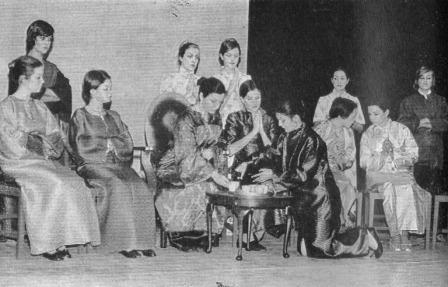
HONOURABLE CHINESE GARDENER
(CUM
GENERAL, CUM KING) HAS HER
SAY
Auditions are never comfortable occasions
and so I was delighted
when I was given the part of Hsigh Ping Kuei
in our
school production this spring. When
rehearsals started in the middle of January
there seemed only a remote possibility of it
ever getting on the stage. 'Perhaps it's
always like this with plays.
I'm
sure our producer felt this more keenly than
we did. Thanks
to her faith in us we all finally made it
(after a few spells of
utter frustration and dark gloom). I only
hope we did her credit.
Rehearsals must have followed what is a
normal pattern —
the excitement of getting a part, learning
the lines, the challenge
of the first time on the stage without a
script. Each step
has a magnetic fascination of its own. Most
early days were
carefree and giggly and then one day we saw
it in print
FIRST PERFORMANCE MARCH 13TH
(Was it an omen?)
After that the whole atmosphere of things
changed — some tension
set in, chanting of lines before an
entrance, sighs of relief
when it went well, moans of despair when all
was wrong. Some
rehearsals, progress nil, others everything
just perfect. So you
waves between exhilaration and despair —
both emotions sometimes
hardly distinguishable.
The whole experience for me at least was
really enjoyable.
I would not have missed a second of it. All
the anxiety disappeared when the lovely
audiences actually clapped for us!
The
cheerful sound of applause was a reward in
itself and the
dreaded audience were now our best friends!
Applause is such sweet music to a group of
nervous actors. Thank you, audience!
It is sad
now that the show is over. The back-stage
cameraderie
and
team work is sadly missed....
but has
anyone asked MissBeckett
when she is going to choose another play? On
with the show!
Veronica Haste L6A
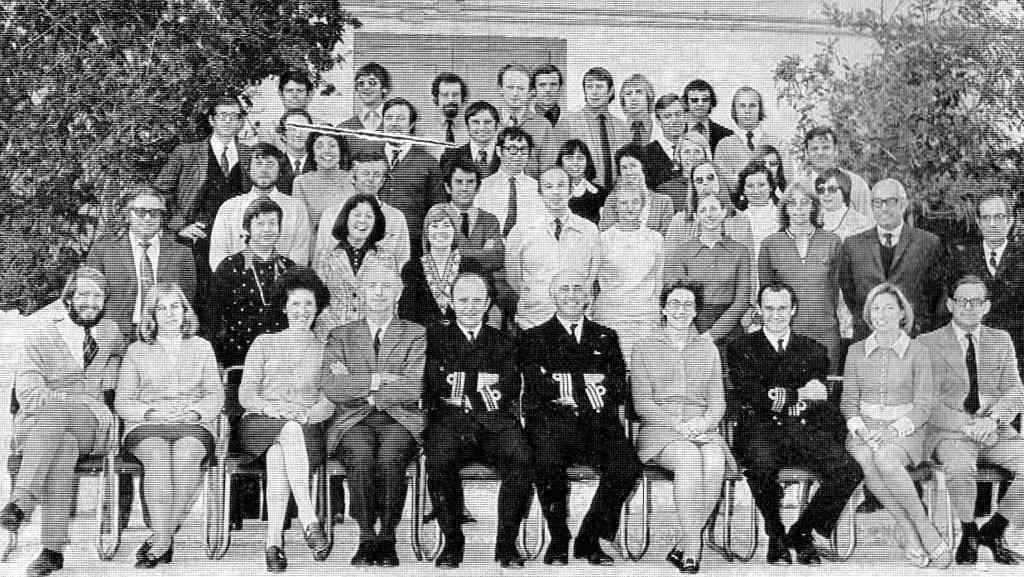
SCHOOL STAFF
Front Row:
Hugh Ritchie, Imelda Dickinson, Chloe
Singleton, Stephen
Slngleton, Lt. Cdr. David Nield, Commander G.D. Stubbs, Pamela
Smith,
Lt. Cdr. Tony Richards, Sylvia Beckett,
James Hobson.
Second
Row:
Charles Aquilina, Sandra Camilleri, Moira
Clarke, Carmel Walsh, Michael Caseley, Joyce
Walden, Judith Stansfleld, Sue
Lynk. Laurence Bezzina, John Treeby.
Third Row:
Kenneth Winn, John Naylor, Barrie Menhams,
David Ditcham, Jerry Phillips, Hilary Hill, Norah Ash,
Rosemary Leighton.
Helen Wilson.
Fourth Row:
Philip Allen, Frank Kitson, June Lattimer,
Rolbert Woolams,
Lew Finnis, Mavis Turner, Marian Spray, Alan
Latham.
Back Row:
Peter Wright, John Clemens, John Hughes, Carl Hancock Jeffrey
Bonner, James Glover, Barrie Jones, Brian
Leonard, David
Walker,
Michael Newton.
Absent:
Susan
Finnis, David Taylor, Trevor Ricketts.
MARCH WINDS DOTH BLOW
John was late. The Salvation Army crew had
been waiting
for him for at least a half an hour before
he finally turned up at his usual spot on
the Thames embankment. One or two of
his mates used to say that he had been a
strikingly handsome
man in his youth but all that had long worn
off. At forty three
he could easily have been mistaken tor a man
twenty years older.
He wore a roughly patched sacking trousers,
tied firmly with string to his ankles to
keep some of the chill breezes out from his
legs. His shoes had come from a Soho rubbish
dump. His
body was puffed out by layers of carefully
arranged newspapers
— great
protection against the frost and sorely
needed to help
his thread
bare mac keep what little warmth he had
where he needed it.
His face was drawn and his cheeks were red
and raw. Long
lank
filthy grey hair reached down to his
shoulders. He had not
shaved
for over two weeks. He clutched his half
full bottle of
meths.
Drink was close to finishing him off. The
butt of a
cigarette
was sucked eagerly by his thin lips.
He had been drinking meths for years now. On
the odd occasions
he had talked about his early life he had
mentioned a
lob getting too much for him and a wife
going off with someone
else. He had turned to methylated spirits as
a solution to
life's hardships. They had certainly brought
an end to his good health and sanity. He was
only the shell of a man going through
the
motions of existence. He no longer cared for
anything or
anybody. The Salvation Army Sergeant reckoned that of their
customers
John was the one who had hit the lowest low
in life.
He could
see that on this bitter starless night with
the winds
forming ripples on the black waters of the river John was in
an even
worse state than usual. He limped nip to
them leaning
on his
piece of bamboo, a stray dog sniffing at the
kettle which
dangled on a piece of cord from a broken pocket. He reeked of
alcohol and nicotine and, with his crownless
trilby cocked
comically
on his head, he was an unusual sight, even
in a city where tramps were common.
Until the last six months he had played the
fiddle to earn a
few coppers but now he found difficulty even
in talking. He
leaned his undernourished body against the
crew's van while
they dished out the last of the soup. He had
a strange smile
about his lips.
He could not eat anything that night. He
vomited lightly
several times. They wrapped a blanket around
him. He lay down
on a bench while the crew packed up their
stuff. Everyone was
unusually quiet. They had seen the tell-tale
signs before. It was
not worth calling a doctor. It would be over
soon enough.
They finished on the embankment and they
loaded him into
the van.
He lay on his back, his bloodshot eyes fixed
on the
root and
his heavy breathing .fouling the air with
vile fumes.
He moaned
from time to time but uttered not a word of
complaint
or apprehension.
The next stop was Hyde Park where a big
queue had formed. When the needs of their
stomachs had been eased they filed
lethargically back to their beds on benches
and wrapped themselves
up in thick sheets of brown paper. Some
blankets were
distributed but there was no great rush, to
get them. The park,
empty
except for the tramps seemed like a great
rolling prairie
stretching into the darkness dotted with
numerous unexplored
forests and bounded by the endless ocean of the Serpentine.
The van drove off again. John had still not
achieved his
aim of passing into the next world but he
was well on his way
to doing so. He shivered and vomited down
his clothes. His eyes
began to bulge and as the van pulled into
its Camden Town
headquarters he let out a piercing cry. It
was his final prayer
and at last his destiny was out of human
hands.
R.A.H. 4L
IN THE BEGINNING
There was no sun
There was no light Everything was as dark as
night.
Then came the sun
Yet nothing was done
Then came the moon
So very soon.
Then came the teachers
Then all those preachers
Then all those people who like the beaches.
Debra Carnes (Form 1J)
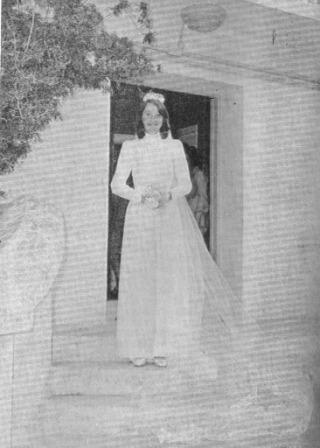
THE TAL HANDAQ FASHION SHOW
The Fashion Show was again a success this year to
the delight and surprise of the whole school. Bits
of braid, zips and
dubious assorted materials vanished from the
needlework room
to reappear on Saturday March 22, in the form of
dresses, trousers
and other remarkably well-made outfits. (We would
like to
make it clear that the resemblance between item no.
82 in the
show and the recently arrived Marks and Spencer's
consignment
was
entirely coincidental!)
Our thanks must go to the Home Economics Department
and
Miss Turner in particular without whom the show
would never
have got off the ground. It was she who urged the
fear-stricken
girls onto the catwalk with the re-assuring words:
"Come along,
girls, it's like going to the dentist, it's all over
in a few seconds!"
Many of the girls, however, were unconvinced, but
few would
have believed it judging by their excellent
performances. The audience, too, were highly
appreciative, encouraging the girls to
give of their best.
Julie Davies & Jill Pelan
THE EMPEROR OF CHINA BUILT A WALL
The Emperor of China, he built a wall Which, as you
may guess, was not at all small;
One thousand eight hundred miles in length,
It really had incredible strength.
For a long time it kept the Moguls out.
At last they got through and brought about A great
many changes in ancient China
Which could have spread to Asia Minor.
The whole of the structure was built toy slaves.
It probably sent quite a few to their graves.
Then long years of building to make
Along its whole length not a single mistake.
There were towers of forty feet in height.
It really was a magnificent sight.
The rest of the way twenty two feet high
—
The architect was SHI HUANG TI.
Louise Latham IB
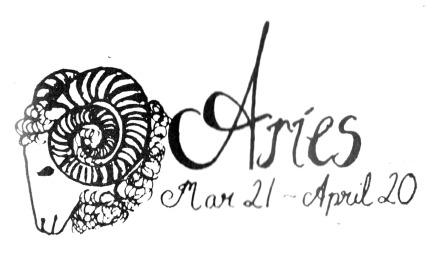
APRIL — The wind is calm and the sea a flower
The
guns are not so insistent this 1975. April dawns
have been quieter than for many a year. Cartridges
are that much more expensive so that more .birds
than usual that landed to use Malta as a stepping
stone did not find it changed into a gravestone. No
school till the fourteenth — chance for a
well-earned lie-in bed of a morning. The de-luxe
school bus will not be waiting at the corner for
Steven or Jane to stuff the last of their books into
their satchels and the last of their toast down
their throats.
On returning to school young muscles are stretched
and flexed in heats and practice for sports. The
voices of First Year are tuned for the music
festival with the Junior schools. The highlight here
is undoubtedly the saga of "Joseph and his Amazing
Technicolor Dreamcoat", twenty and more minutes
non-stop singing something that most of them will
probably never experience again in their lives.
This too is the month when that artful dodger
returns in great numbers — the fly who still manages
to bring one consolation to us — we only find him
around when the weather is warm.
DREAMS, NIGHTMARES, FEARS
The opening of a rose
Imagine peace instead of war
The mushroom cloud of the atom bomb
Imagine richness
A basket of corn overflowing with food
Poor no more
No more slums or hunger
Happiness peace
Sunshine not thunder
Must there be pain and suffering?
Why not joy and laughter?
My thoughts and dreams
On the way the world's -
And could be.
How wonderful to be for ever free
My dream is shattered
By the nightmare I live in
Back to my world of dreams
I once again retreat
To hide from the cruelty
In today's world
To dream forever
Reality — my nightmare.
Deborah Jackson L6A |
TO PASSING YOUTH
Years flying, going,
Dying,
Seasons fading,
People aging, growing,
Dying,
Youth blossoming, dooping,
Disappearing,
Gone for ever, why didn't
we enjoy it more? Too late now, age
creeps on, old already Youth is gone.
C.W. L6A
|
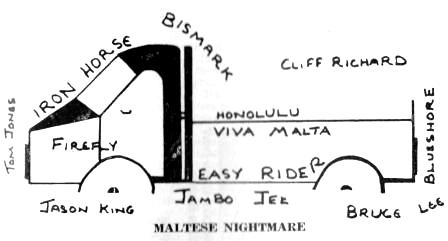 MALTESE NIGHTMARE MALTESE NIGHTMARE
Traffic. Traffic. Lorries, trucks. It was ten times
that day.
Ten times almost sent into the next world before my
time. Really,
I
would have to leave Malta. Msida roundabout. That
great red
beast had forced me up to the pavement. I could not
stand it.
But
now, thank my lucky stars, bed and a good night's
sleep.
Blessed silence. Peace Peace... But wait...
The journey from SANTE FE to SAN FRANlISCO was interrupted
with a jerk as the IRON HORSE' screeched to a halt,
held at gunpoint by the BIG BOY gang, the leader of
which
JUAN PERON imagined himself as a reincarnation of
ROGER
MOORE. "O kay, GOLDEN BOY", he snarled at the
driver, "NO
MORE riding on the WAGON TRAIN for you, Ducky".
LITTLE
TARZAN, the hero, muttered to himself "NEVER SAY
DIE, you
RED
DEVIL" as he prepared to tackle the gang single
handed.
Suddenly an authoritative female voice drawled out
"LET ME PASS, I
want to meet this PRETTY BABY holding us all up like
this". GIGI PONTI came into view "What a LULU of a
time ah'm havin';
this trip's a real WINNER", she cried. JUAN had his
first TASTE OF LOVE as he gazed open mouthed at GIGI. LITTLE
EVAN, his second
in command and ALWAYS in control of any
situation was
flabbergasted at his chief's cocker-spaniel expression.
Looking as if he were in PARADISE and oblivious of
his
mission. SUPERMAN, HERCULES and DANNY BOY (THREE
BROTHERS) were stuck dumb by this turn in the
proceedings.
Fancy, their boss, KING of THEM ALL looking as love
sick as FRANK SINATRA in the middle of MOON RIVER! A
JUMBO
JET
screeching overhead with a SILVER WHISTLE gave them
a chance to find
their voices and a B.B.C. broadcast of HAWAII
FIVE-O. EVAN
moved a LITTLE FINGER and listened to TOM
JONES, DEMIS
ROUSSOS and ELVIS PRESLEY singing a trio in
the RED LION.
Just then BRUCE LEE rode in on a CRAZY
HORSE "I'm
ALWAYS OUT", he said to AUDREY who had just
flown back from the ISLE of WIGHT on a BLUE BIRD.
"Saw ST. PAUL on
my way here" she said, "On his way to see CALYPSO
on a FLAMINGO. Just then a HUNTER spotted him and
fired. Down he went into a BLUE LAGOON".
BRUCE screamed
"Send GIOVANNI, the ROAD RUNNER to get JASON KING.
He knows his A.B.C. Go by SUPER EAGLE. I believe he's talking to
BISMARK in the
DUKE of YORK. If you don't hurry he'll be
there FOR EVER and
EVER. And don't ask the LOTUS EATER.
All he believes
in is FLOWER POWER...
And suddenly I awoke The FUTURE READER had become
TOMORROW'S CHILD.
THE MORNING STAR was rising on the 26th MARCH 1972.
GOOD LUCK. ALL IS WELL.
Deborah Jackson L6A
| A NIGHTMARE
I am frightened now
It is coming here
When, why, who, how?
Is this fear?
Look at that monster there,
All fat . no hair.
All slime all slush,
All ooze squirm and mush.
It's slurping- and sliming
Out of the sink,
It's oozing, not climbing!
It's as messy as ink.
It's leaving a trail of foam
It's frothing and spurting,
It's squeezing and slurping
It' it's coming this way,
I, shan't see you again today.
Jane Arbuthnott 2A2
|
DREAMS I wander
listlessly through a wood
Beneath this canopy of greenery the air
is
quiet and still.
I watch in a trance as the boughs bend
down
and engulf me.
In a green room with no windows or doors
— I scream.
The walls shatter and crumble to dust
leaving me alone on a beach
The beach is covered with black shiny
crabs
which are slowly crawling towards me.
I sit down and wait.
The crabs stop and stare then head
towards the sea.
I try to watch them but the sand is
clogging up my eyes
I open my mouth and sand pours out
People arrive to watch this sight then
quickly
scurry away.
I am alone
I shiver and goose pimples appear on my
arms
A seagull's eerie cry is the only sound
I awake.
H. Male L6A
|
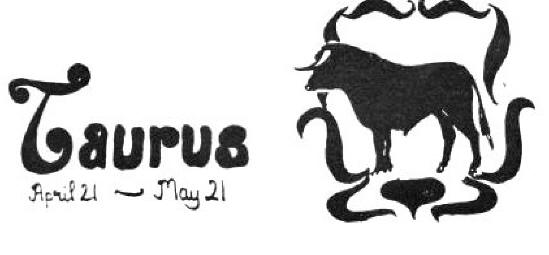
MAY — Green meadows sparkle with refreshing dew.
The year is building up to its
climax. The harvest of wheat
and barley is underway in Maltese
fields. The vine leaves spread
their cooling shade though their
grapes are yet nothing more
than clusters of hard green
seeds. Dust rises from a running
track
at Luqa as Tal Handaq sprinters pound towards
the tape.
Aunty Mary newly arrived on holiday from Wigan
turns lobster red from sitting long hours
in the hot sun watching young
Andrew come in last in the 800
metres.
Parents of Fourth Year students
are invited to school on a
warm evening to talk about their
children's progress. Parents of
pupils
in the First Year are given the change to follow
up their
November consultations with teachers. The school
is delighted
that so many parents take
advantage of the offer.
And in May, that merriest of
months, CSE examinations
frighten a few of our Fifth
formers and please a few more. Pens
scratch away in the dark Hall:
eyes stare blankly out at the
bright sunlight. The consolation
is that they don't last all that
long. But then we must not forget
June and its O levels. What
a life!
The glorious 12th is the day from
which it is all in order for boys to show their
knees again in summer uniform and one week
later
it is obligatory.
LOG OF YACHT TAMOKA THROUGH THE
FRENCH CANALS
1974
|
15th May: |
Lovely hot
sunshine. Walked to Eiffel Tower. It is
even more magnificent
than I imagined and well worth the 10
francs to go to the top.
|
|
16th May: |
Beautiful
hot sunshine. Went to Arc de Triomphe,
a fine piece of architecture.
|
|
17th May: |
Left Paris 1.30 p.m. and passed through
four locks,a
beautiful stretch of the river. |
|
18th May: |
We left the river Seine and into the
canals. They
are really narrow. To pass a barge is
awful. The suction
pulls us out from the bank. |
|
19th May: |
Today
we seem to be tackling these narrow
canals
and locks more professionally. In some
locks we only have
two inches to spare either side. |
|
20th May: |
We move on at 5.30 a.m. Got on well —
approximately
thirty miles. |
|
21st May: |
My coat blew overboard at the next lock.
I got on my
bicycle and cycled back and luckily the
coat was close enough
to the bank for me to get it.
|
|
22nd May: |
Good job we brought plenty of flour and
long-life milk as there are very few
shops. |
|
23rd May: |
It has turned wet. This
will help to fill the canals as
we are nearly scraping the bottom.
|
|
24th May: |
Wet and cold. Quite surprised the middle
of France
can be so cold. |
|
25th May: |
Dry today. We leave Canal
Loing and into canal Centre.
Last part of Loing very shallow even a
barge got stuck. |
|
26th
May: |
Came to the first fully automatic
lock. When the boat passes a ray the
gates open. |
|
27th May: |
Lock keeper gave Mum a
present of flowers and lettuce.
The lock keepers are very nice and I try
to speak
French to them. |
|
28th May: |
Big
thunder storm. Lightning most
spectacular. |
|
29th May: |
Left canals through an enormous lock
with an eighty
foot drop into the river Saone. I am
sorry to leave the canals.
They were great fun. |
Michael McCombe 1W1
CONTENTMENT
Slowly she slunk into the kitchen,
Her eyes were the colour of jade,
Her whiskers were twitching,
Her ears alert,
for some familiar aroma.
Her paw came out as fast as light,
for a mouse was darting toy,
Though quick was she,
Her prey escaped,
And left the cat forlorn
In the flickering light,
Her eyes glowed gold,
And then espied an old familiar
sight,
For there beside the chair,
Was a tempting bowl of milk,
She drank with great haste,
Soon it was gone.
She found a nice warm chair,
She licked herself contentedly,
It's then she fell asleep.
Angela Stapley LI
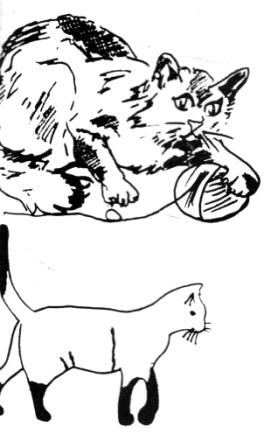
TOM THE ALLEY CAT
There was an alley called TOM
His fur was ginger his whiskers
black.
His eyes were gloss green.
His teeth were small white daggers.
His claws were flashing swords.
And he walks with his head held
high.
Mark Westbrook 1J
|
MY CAT
I have a large and ginger cat Who's
beautiful but rather fat His fur is
long and smooth and thick
He's on my lap at one finger's
click.
He spends his time washing with his
paws
Or scratching himself with his
strong sharp claws
He curls in a ball in front of the
fire
Not moving a muscle till home comes
our sire.
Then slippers are pushed in front of
his face And Daddy says "Come on,
who's got my place?"
So lazily stretching from paw to paw
He wanders off through the open
door.
He lifts his nose and sniffs the
night air
And slinks into the darkness without
a care
In the morning he's there when we
rise
And for gobbling his breakfast he'd
win a prize.
He is beautiful He is fat He is
mine.
Karen Baker 1J
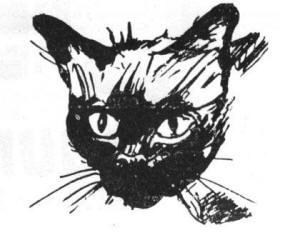 THE
CAT THE
CAT
The cat comes out of the noisy
house, Sharp ears, Green eyes, Long
whiskers,
His tail ticking like a pendulum.
The thrush sitting on the fence,
Looking down eagerly at the ground,
Watches to see if enemies are
around, Giving an occasional song.
The cat has seen the thrush,
Slowly she walks, padding all her
steps,
But the thrush is too quick and
flies to a branch.
So the cat has to look somewhere
else.
Rosalind Hancock Form 1J
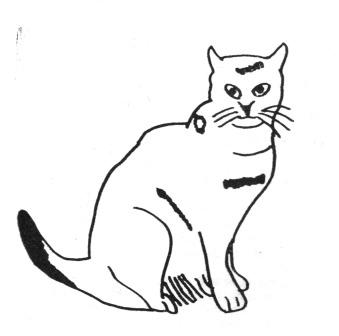
|
WHO'S WHO?
Have you ever looked carefully at your
teachers?
Do you wonder what kind of thoughts and
feelings are go| on under those smart,
intelligent exteriors?
What is it that makes them tick?
Now is your chance to find out.
On the next pages we have written up the
answers given twenty-two members of staff to
the series of nine question which we have
written out below.
Each set of answers has a letter. Your task
is to see if you can work out or guess which
of the members of the staff, al listed
below, gave what set of answers.
Check your solutions with the answer page in
the back of the magazine.
Here are the questions:
|
1.
Where were you born?
2.
What is your
favourite food?
3.
What is your
favourite piece of music?
4.
What is your
favourite film or type of film?
5.
What quality do
you most admire in the opposite
sex?
6.
What ambitions do
you have?
7.
How would you sum
up happiness in half a dozen
words.
8.
If someone gave
you a million pounds, what
would be the
first thing you
would buy with it?
9.
Is there anything
you dislike about Malta?
Mr Allen — Miss
Beckett — Mr Caseley — Miss
Dickinson — Mr
Finnis — Mr
Hughes — Mr Jones — Miss
Lattimer — Miss Leighton
— Mr Leonard — Mrs Lynk — Mr
Naylor — Mr Newton ---
Lt/Cdr Nield —
Lt/Cdr Richards — Mr Ricketts —
Commander
Stubbs — Miss
Turner — Miss Walden — Miss
Wilson — Mr Wilson
- Mr Woolams.
|
A.
On the site of a British Prison Camp (1914-918 war for
German Soldiers).
Indian and Chinese.
Beethoven's Fifth Symphony and Tchaikovsky's 1812 Overture
Taras Bulba.
A simple, honest nature and
domesticity.
None really only to be happy.
Being warm, comfortable and well fed
and realising that
you're lucky to be
so
A castle with large estate, probably
in
Scotland.
The thought of returning home to
England in 1978 |
B.
In a coal
mine.
Pupils of Tal Handaq.
The Death March.
Blood and Thunder.
The Usual.
To be a hermit.
Life on a Desert Island.
Peace.
Work.
|
C. Co. Durham.
Chips.
The Godfather Theme.
Italian.
Appreciation.
To work half days all year round.
Beer, Beer, Beer, Beer, Beer,
Whisky.
A larger Dinghy.
That the sun sometimes goes in
|
|
D. Plymouth, 'Devon.
Liver and Onions.
Anything from Prince Igor.
Any film with a good plot and
filming technique.
The ability to talk sensibly.
To retire early.
A winning shot at any ball game —
the laugh of my children.
Headache pills and probably a false
beard.
Rocky beaches. |
E.
Coppenhall, Cheshire,
Cheese — Cheese au gratin must be
tops.
Mozart — for flute and harp.
Any directed by John Ford.
Intuition.
To be wealthy enough to live the
life of leisure for which I was
educated and to which I could
quickly become accustomed.
Complete and
continuous absence of angst
A Citroen CX.
Having to work indoors. |
F. Preston
Jail.
Spam, spam, spam, spam, spam, spam,
beans and spam.
The Music of the Bell (at 3,20).
A Gracie Fields Spectacular.
WIT.
To bebeome world Yo-Yo champion,
Happiness is retirement day.
STILTS.
Driving on knobbly roads.
|
| G.
West Bromwich, Staffordshire.
Lobsters meuniere; Vichyssoise ;
cheese cake (Austrian kind);
Escargots in garlic butter Not ALL
AT CiNCE.
0 mench bewein dein Smnde gross —
Bach. In questa Reggia
- frcm Turandot sung by Eva Turner.
Foreign classic films e.g. Les
Enfants du Paradis; Russian
"Hamlet".
The xy factor.
I am the most unambitious person in
the world, all one needs
is one other to be unambitious with.
A new car with a 25 year guarantee
on all parts.
(i) The dust and (ii) Scavenger dogs
and cats.
|
H.
North West England.
Most of it.
The school bell at 1530 or "Those
departing with our blessing."
The League of Gentlemen.
Passiveness or softness or both.
Very few when one realizes how
super-keen one needs to be to enjoy
the results of high ambition.
Being able to do what I want (7
words — sorry!)
A real school of my own! /My
freedom.
The sunshine and the sea
|
J. The Far
West.
Avocado pear; Lobster.
Variations (Enigma Type).
One with a handsome hero.
Durability.
To make HIM happy.
HIM (6 times).
HIM. I'm here; he's there.
|
| K.
Bury,Lancs.
An English breakfast — grapefruit,
scrambled egg, toast and
marmalade (home made), coffee
(real), served in bed!
The Messiah — I know that my
Redeemer Liveth.
Walt Disney — Snow White etc.
Intelligence coupled with
sensitivity.
A Georgian house, a handsome husband
and a job I'll always
find satisfying.
Health, sufficient wealth to enjoy
it and good friends.
Jaguar XK 160 Convertible.
|
L.
London.
Prawn cocktail, medium rare steak
with mushrooms, black
coffee.
Tubular Bells (at the moment).
Suspense.
Honesty.
None.
Peace of mind and friendship.
A house in Britain — big enough for
2 dogs, 2 budgerigars,
2 cats and 4 bedrooms.
The limited size.
|
M. Birmingham —
I think.
Steak Alexandra's with mushrooms.
I won't give you up — Barry White.
Walt Disney films.
Passion.
To be Head of Tal Handaq.
Dim lights, mood music, my man.
Malta.
Everybody knowing everyone else's
business.
|
| N. Liverpool,
U.K. (a suburb of Dublin).
Fillet of beef; rare en croute, with
Bernaise sauce.
Toccata and Fugue in D major (J.S.
Bach).
Hairy adventure type, with comedy
bits (J. Bond etc.).
Cooking ability. Early retirement.
A pie, a pint and a good worry-free
kip.
A Nicholson 54.
The cost of getting off it.
|
O.
Swindon, Wiltshire, England.
Steak and spinach (followed by
celery).
Summertime from Porgy and Bess.
Cartoons.
The ability to dress up, make up,
sew up, cook up — and shut up!
To and somebody who fits number 5.
Sunshine, fresh air, good health and
time to enjoy it.
A safe deposit box.
The thought of having to leave
|
P. Gosport,
Hampshire.
Beef Stroganoff.
Tschaikowsky's piano 'Concerto in B
flat.
Butch Cassidy and the Sundance Kid.
Faithfulness.
To run a small olde worlde hotel. :
Wine, men and song!
A farmhouse in the Yorkshire Dales.
No trees or hills!
|
| Q. Under the sign
of the Plough.
Roast beef and Yorkshire pudding. "
The Yorkshire National Anthem.
Kodachrome II.
Roundness.
A hole in one.
Playing golf when others are
working.
FREEDOM.
Others playing golf when I'm
working!
|
R.
In a cosy Welsh seaside town.
Laverbread, bacon, egg and chips
(for breakfast).
Currently, the Overture to Romeo and
Juliet.
Butch Cassidy and the Sundance Kid
(seen it 3 times)
Sexual attractiveness combined with
stable temperament and a touch of
humour.
To sail the South Pacific, and one
day I will.
A state of mind often unrelated to
physical surroundings.
A BIG yacht.
TOO barren.
|
S. East
Langdon, Dover, Kent.
Fish and chips.
Jupiter from the Planets by Hoist.
Good comedy — "Carry On" series
etc., (when good).
CUDDLlNESS (and a good sense of
humour).
They change frequently.— become a
headmaster; become a professor; run
a bus company.
To love and be loved.
A house in the country.
Good British beer.
|
| T.
On a Coventry Corporation bus.
Chips.
ME — singing in the bath.
Silent.
Modesty.
Retirement next year.
Read the next question.
A cheque book.
The cold summers.
|
U.
On the Tyke/Geordie Border.
Anything tasty.
Air on a G (String.
"Saucy Sadie Sins Again".
Unprintable.
To have free lessons on Friday
morning (D.H.M. please note).
Soccer, Cricket, Golf, Bridge,
Racquel Welch.
Johann Cruyff for Middlesbrough.
Losing to Tedder or Cunningham.
|
V. Chester.
Roast pork.
Haven't got one but I like "pop" (Georgie
Fame)
Spy thriller!
Femininity!
To referee the Cup Final.
Doing something you both like with
someone you love!
A nice house with a heated pool --in
England!
The driving and the litter.
|
| W. Rhondda
Valley.
Leek soup.
Bob Dylan's Sound track — "Pat
Garrett and Billy the Kid."
Alvin Purple.
Ten points out of ten.
Black belt in Karate.
Happiness, health, love,
kindness and money.
Hopleaf factory.
It's a long way from home.
|
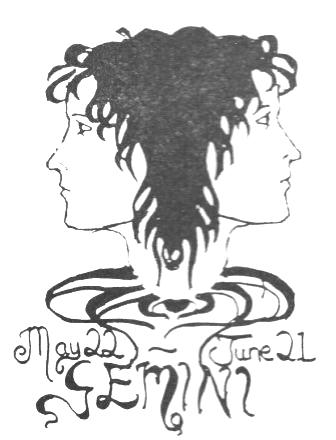
JUNE — Sweet scent of lawn
and flower
And why is it that in this
most glorious of months that
we have our most serious
academic examinations? Longest days
mean hardest days. Does it
have to be like this? Perhaps one
day we will be able to do
away with examinations altogether.
How did this world survive
before O levels, A levels, degrees
schools even?
Hedgerows in Britain became
luxurious with life. We can
enjoy of the smell and colour
and touch of a thousand wild
growths. Watch the bee in his
tireless weaving and bobbing
along country lanes: listen
to his restful unhurried buzz. Our
Maltese countryside loses
another shade of green as our delicate
spring guests wilt and die in
the heat that parches their tender stems.
Our northern bodies take on another shade of
tan. Monday
the 16th is the day when we recognise that
it is too hot
to work after one o'clock. So
the cream coloured blocks of Tal
Handaq bake and sleep in the
peace of long afternoons.
The minds of many begin to
turn more firmly to thoughts of
moving on. Boxes are nailed
together and families sort among
their Malta accumulations for
things to keep and things to
throw away. Excitement builds
up at the thought of a journey
home overland. It will be
good to see tall green hills again and
to hear the ancient ripple of
rivers rolling over their stony beds.
|
BEAUTY
I wonder if anyone knows
What beauty is?
Is it a sunset?
A bird's flight?
A woman?
Try to describe it
In the most perfect English
It doesn't seem right.
Beauty cannot be described
It has to be seen.
Ian Simpson 5th year |
BUDDHA SAT UNDER A TREE
Buddha sat under an old fig tree
And he was hungry and thin.
Said he, "All of you will listen
to me,
And let none of you make a din.
I have thought under all through the night,
And since it's the tree of
knowledge It has given to me a
second sight
Without even going to college.
I am not going against Hinduism.
I will just each you about life.
It is a religion called
Buddhism.
Go home and tell that to your wife."
Sophy Hardie IB |
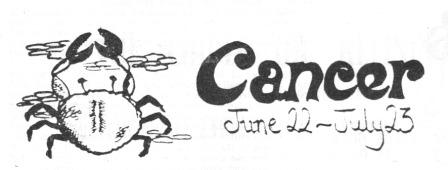
JULY — A heat to take your breath away
In so many ways a
strange month when looked at in the context
of the school. Usually it contains the fog
end of our
internal examinations. It is
the month for tying up all the odds
and ends of the school year,
books returned, reports completed
and for many many of our
pupils it contains the last days at
Tal Handaq. Fancy, the last
ride up that narrow Mdina Road,
bumping along between the honey coloured dry stone walls past the
increasing bustle of the canning factory.
Goodbye
Qormi,
goodbye Marsa. We'll miss you. And with so
many of our pupils will be going
eight members of staff (at the time of writng).
July means the long hot sunny
dog days. Nobody moves too
fast — except for footballing
boys who seem so lost in the fascination
of the game that they are unaware of the
streams of
sweat on their foreheads and
their shirts soaked with dark
patches of effort. But then
we have the whole of a glorious Thursday
morning at Robb Lido to augment the happy
afternoons
of swimming and diving. Every window in the
school is
opened wide. The fans whirl
on. Wednesday the 16th. Magic day.
''Lord dismiss us with thy
blessing!" The school clears in a
flurry of smiles and good
humoured excitement. And suddenly
we are all a year older.
|
THE LION
The lion is a great beast,
All day long he will feast.
Chewing with all his might,
Oh! what a nasty sight!
And when his belly is sore,
After eating such a score,
He roars in ipain with all his might
But that serves him right
The horrible beast,
Eating
such a gory feast!
Jane Arbuthnoft |
THE IRON MULE
The great Black Eagle through
the country soared
It's hot fire flared, the
engines roared.
And who would dare to stop its
flight
As it flew along through the
dead of night
Through the fields this giant
came,
The great Black Eagle, the
giant's name.
The fireman never stopped
tossing fuel:
He had to feed this iron mule.
Then suddenly it began to rain
Upon this giant, the beautiful
train.
The sweat poured down the
driver's back
As he watched in awe the silver
track.
Through country wood, forest and
dale
Sunshine, rain, thunder or hail,
The Eagle flies without a pause,
And through the countryside it
soars
When she is gone the tracks will
pine,
For the beauty of the railway
line.
Debra Wiles 3D
|
DREAM OF A JULY DAY
That day is still very vivid in my
memory. It was the twenty-ninth
day of a hot cloudless July. All summer
we had played
our never-ending games in the fields of
my grand-father's
Gloucestershire farm. We had perspired
as we romped through
the sweet smelling meadows as we helped
in the hay making
and laughed and joked with the farm
hands as we swigged
down our share of the cool refreshing
cider.
My brother Jack had awakened me very
early that morning
because it was my turn to milk the cows.
As I crossed the
farmyard there was a low mist over the
valley and a surprising
chill in the air. As I pulled on my
filthy rubber boots I had
a sudden premonition of something evil.
After staring absentmindedly
for some moments while the cows filed
slowly into
the milking parlour, I shook my head and
got on with the job
in hand. If you have every milked a
hundred cows in an hour,
even by machine, you will no doubt have
discovered that it is
exhausting and dirty work. When it was
over and I was free
for the morning all I wanted to do was
to lie down in the sweet grass of some
faraway meadow and have a snooze before
lunch.
It was quite by chance that on that
morning I chose the long
meadow over against Dappled Hill.
The long meadow was our biggest field,
twenty acres or more.
It was rectangular in shape sloping from
north to south and
in the north eastern corner a gap in the
hedge commanded a
fine view of the Stow on the Wold —
Gloucester road. The fact
this road was little more than a country
lane and from my
vantage point in the grass I could see
the whole of the wide
bend in the lane. Not many cars passed
that way.
As I was just dozing off the familiar
sound of horses hooves
come to my ears. I raised my head from
the ground just in time
to see Mr Wellard, our neighbour drive
out his team of magnificent
black shires. Their coats gleamed in the
sunlight and
there was a gentle rhythmic chinking
noise from their tack as
they turned down the road towards me.
My ears were surprised to pick uip
another sound. A fine red
sports car was hurtling towards me from
the other direction.
I sat up in admiration but then my jaw
dropped and my brain
went numb as I realised what was about
to happen. Before I
could even get to my feet there was an
ear splitting screech
of brakes, the frantic neighing of
horses and finally a sickening
crash.
Being only twelve at the time, I had
little idea about what
to do. I just sat there and surveyed the
scene. The car had been
literally smashed to pieces and bits of
debris lay scattered over
a wide area. On top of the buckled
smoking shell lay a dead
horse, a great hole pierced in its side,
its entrails spread dark brown on the
green grass of the nearby verge. The
other horse
lay a little to the left of the car, its
fore legs askew and foaming at the
mouth. The wooden cart they had been
towing had
been smashed to pulp and one singularly
large piece lay not
ten feet away from me. Old Tom Wellard
lay on the road, hit
proud team's reins still gripped tight
in his hands. He was perfectly
still.
I vomited. Gradually I pulled myself
together. All I could
think was that I must get to people. I
ran madly down towards
the house shouting and waving. Before I
got to the gate at the
bottom of long meadow I was met by my
uncle who had come to discover what all
the noise was about. Joe Westcott ran
back
to the house to telephone -while the
rest of us raced to a grim,
scene just beyond the top hedge. Luckily
my uncle had brought
his shot gun and the horses were soon
put out of their misery,
but there was no hope fox the two people
who had been in
the car. As far as we could make out
they had been two young
women.
Amazingly Tom Wellard still seemed to
have some life in.
him. Both his legs were broken and there
was a jagged sear
across his forehead. It was a sick and
horrible hour before the
ambulance finally turned up and by that
time we had buried the horses and
cleared the road.
There had never been so many people at
that bend on our
quiet country road — police measuring,
photographers taking
endless pictures and worst of all people
who had just come to
stare.
I was sick several times during the rest
of the day. In my
exhaustion I slept the sleep of the dead
that night. But I still
wake up sometimes unable to bear that
dream where black warm
flesh is about to be hurtled down by red
cold metal.
Richard Hancock 4L
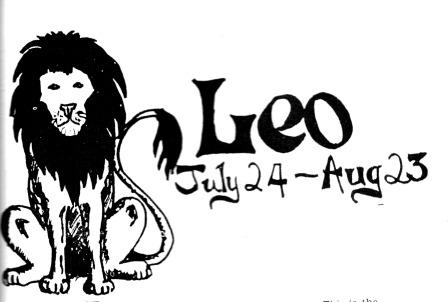
AUGUST
The days of the burning jewel
and blissful ease. This is the
month that is most holy in
the year of the schoolboy. Not one
single day of it is spent in
school. Every minute can be devoted
to what we want to do. At
least that is the theory.
The days are monotonously
blue now. The sun beats down
for fifteen hours every day.
We walk the longest way round, as
long as we can stay in the
shade. Robb Lido, Kalafrana, Golden
Bay, Paradise Bay, these are
the places to be.
And yet for some all is not
bliss for August is the time when
examination results come out — O-level,
A-level and C.S.E. For
many this means the happiness
of success earned by hard suntanned
work, for a few sadness and regrets for
misspent time.
We hope that everyone from
Tal Handaq will get some pleasure
from them this year.
By the time this month of
August 1975 will have come scores of people
who are part and parcel of Tal Handaq now
will have
passed out of its gates for
ever. To them we give our best wishes
for the years to come.
|
DREAMS
In a dreamworld floating on a
cloud
Of hazy pink and golden mist
Shining, radiant cherubims
Play their vibrant harps
And I smile amidst their
happiness.
Suddenly, lightning streaks
across the sky
And its jagged sword cuts into
the cloud.
My world explodes and I fall,
Floating like a feather till I
wake,
Rocked by the gentle lapping of
waves
In a small, green boat.
The water, over-shadowed by
willowy green trees
Stretches peacefully away into
the distance.
The boat floats along
And I watch the birds and the
flowers
Until I become aware of a noise,
And I am swept by a crashing
waterfall
Over the edge of the cliff.
Knowing my body must break
On the jutting rocks below
I scream
And wake.
Sylvia Houghton 6A
|
AUGUST
Morning sounds
An occasional twitter
Barking pup of a litter
Dad's heavy breathing
Banging door as he's leaving
A young bird is flying
Hear neighbours good-bye-ing
A young child is squealing
Lets us all know his
feelings
I hear a large yawn
Realize it's my own
Then I go back to sleep:
No more school for a week!
Dianne Lyons 3D
|
HOUSE REPORTS

ALANBROOKE BOYS
1974/75 has, so far, been a successful
year for Alanbrooke
Boys, Things .began to happen in October
at the "six-a-side"
soccer tournament when Alanbrooke
emerged as winners by the proverbial
whisker. This victory was earned by the
wholehearted
efforts of Juniors, Colts and Seniors
but it was the unexpected
and yet decisive victories by the
juniors which were the key
factors in this victory. Much credit
must go to all players for
winning this trophy.
Towards the end of Autumn Term, the
Rugby season in
lower and middle school, Alanbrooke
swept the board in both
the fifteens and seven-a-side
competitions. Here again, fine team
effort were responsible for these
successes but the performances
of Nick
Morse, Alan Hessell and Andrew Basson
were the corner
stones
of these victories.
At the start of the Basketball
tournament little success was
envisaged for the Alanbrooke squads yet
the Seniors, inspired
by Goliath like performances from
diminutive Ian Jump, won
their games and the arrival of Mark
Fearon into the Colts side
resulted in Alanbrooke emerging as easy
winners.
The Orienteering Competitor! was held at
Mistra Bay on
a splendid January morning. This
competition was most enjoyed
by all taking part even If it did result
in Alanbrooke finishing
in third place.
February 7th brought the Cross Country
Championship. Although
individual success was gained by
Alanbrooke competitors
poor packing resulted in another third
place. Congratulations
to Leslie Bartlett on a superb run when
winning the Senior race
by a comfortable margin and to Philip
Pitman who thrashed all
opposition in the Colts race. Special
mention must be made of
Graeme Paxton who ran well to be the
first Alanbrooke boy
in the Junior Race. Despite the fact
that team success was not gained all
runners should be congratulated on their
willing and
keen efforts.
The House Soccer Championship took place
throughout the
year and resulted in Alanbrooke gaining
a creditable second
place. This year the Senior team was not
as strong as in previotfs
season but showed great spirit and no
little skill in finishing in
second place. The Colts were outplayed
in the first part of the
season but the arrival of new blood
resulted in their becoming
a powerful combination based on the
skill and strength of John
Russell, Alan Hessell, Philip Kitson and
Andrew Basson. This
late season revival saw the Colts
finished in second place. The Junior
team, with the help of John (Goals)
Blunden, won their
section displaying skill and a
refreshing enthusiasm.
The House Point Competition is still
underway but there
is a ding dong battle taking place
between ourselves and Cunningham House.
Obviously the level of industry must be
maintained
if we are to withstand the artful
challenges of Bonner
Enterprises.
Special thanks go to House Captain Paul
Darmody and
Games Captain Ian Jump for their
wholehearted -efforts on and
off the field.Thanks
must also go to the Alanbrooke House
Masters, especially
Mr Newton and Mr Kitson, who have given
up their sparetime
after school and on Saturday mornings to
organise and
encourage Alanbrooke House Teams.
P.
Darmody
NETBALL
This year we had a good response from
all the years when
It came to playing netball. The Junior
team, consisting of Rona
McCallum, Betty Bussel, Andrea Lord
(Captain), Jane Arbothnot,
Karen Baker, Alison Harvey, Isobel
Collins, Jack Elms and Toni
Gilson,
played exceedingly well winning three of
their matches
and drawing the fourth. This put them at
the top of the Junior
section! Playing for the Intermediate
team was Suzanne Syrad,
Kathy Poison, Nicky Taylor, Jacqui
Dearlove (Captain), Denise
Collins, Cheryl Brookes, Margot Draper,
Yvette Strevens and
Helen Bartlett, on goal average they
came second in their section
after winning three matches and losing
one. The Senior
team was made up of Kathy Howarth, Su
Harvey (Captain),
Veronica Haste, Jill Cartwright, Anne
Bowie, Christina Daniels,
Julie Hancock and Karen Wither. We did
not do as well as the
other two teams, we won one match and
lost three; consequently
we were placed third in our section.
Congratulations go to everyone who
played for Alanbrooke
and won us the cup, and also for the
fine spirit they played in,
even in times of defeat! Well done!
HOCKEY
We could not manage to retain the cup
this year, but we
had a good turnout of both girls and
boys to play hockey. The
Juniors all tried hard but were narrowly
beaten by the other two
houses. The Seniors had a goalless draw
against Tedder but were
beaten 8-1 by Cunningham; tooth team
were placed third in their sections
giving Alanbrooke an overall position of
third
However, we would like to thank Miss
Turner for taking
practices and wish you all better
luck next year.
Su Harvey, Games Captain
ST. PATRICK'S ORPHANAGE
This year we have kept up our visits
to St. Patrick's nage. We regularly
supply them with buns and the
special c§ at Christmas when we
arranged a party for the boys. They
had lots to eat, then Father
Christmas came with presents for
boys. The presents were also from
Alanbrooke girls.
Their next special treat was at
Easter. Thanks from the boys go to
everyone who gave a few cents to
give them Easter eggs
Also, a bus load of boys were
invited to Lady Precious Stream they
all sent their thanks for all their
treats and outings, which are always
appreciated. Our thanks go to
Commander Stubbs for the
complimentary tickets. Let us keep
up the good work because they are
thankful
for everything that is done for
them. Su Harvey

CUNNINGHAM HOUSE REPORT
Cunningham boys after a slow start have improved tremendously
and now have a good chance of being the 1975 House
Champions.
For
the second year running Cunningham won the football
championship, and it was won emphatically this year from
a
possible 24 points Cunningham gained 19. The Seniors,
having
unlucky lost Ean Smith's services still managed to win
all four
of
their matches, with scores of 8-1 and 4-2 against
Alanbrooke
and
3-1 and 2-1 against Tedder. Dean Norman, Gary Wallington
and Jeremy Taylor were the outstanding players. The
Colts were
also
unbeaten with scores of 4-1 and 4-0 against Tedder and
3-1 and l-l against Alanbrooke. The best players in the
Colts
team
were goalkeeper Andrew MacKay and Nick Hall and Stephen
Taylor who led the team so ably. The Seniors were
unlucky
to
lose one match to Alanbrooke but still put up a good
performance
on every occasion. The score lines of 1-1 an l-2 against
Alanbrooke and 2-2 and 4-1 against Tedder provided the
house
with
valuable points. Captain Paul Davies and Andrew Guthrie
both deserve a mention here. These excellent results
produced
from 12
matches a total of 2 mins, 3; draws and 1 loss giving
Cunnigham a decisive 5 point victory over Alanbrooke.
The six
a side soccer was not so good and we finished 1
point
behind Alanbrooke in second place. The
Seniors beat Tedder
4-0 but unluckily lost 3-2 on corners to Alanbrooke. The
Colts
beat Alanbrooke 2-0 but lost to Tedder too and the
Seniors
beat
Tedder 3-1 on Corners but were unfortunately defeated to
by Alanbrooke. Once again all players put up a good
performance
and much good football was seen.
The
orienteering competition was also very close Cunningham
finishing in second place only 3 points behind Tedder.
Andrew Mackay and Christopher George were first and Ean
Smih
and Keith Naylor equal third, but apart from these excellent
efforts the house as a whole did not do well, no others
finishing in the first 10. This was very disappointing
for Cunningham.
The
cross country Championships proved to be another good
victory though we finished first 12 points ahead of
Tedder. The first race was the Juniors in which Guy
Whelton was 2nd, Ray
Pelan
3rd and Paul Joyce 5th. These good efforts placed Cunningham
second behind Tedder at the start of the Colts race.
The Colts promptly put Cunningham in front, Gary
Wallington gaining
3rd, Steve Lisicki 4th and Nick Boyle 6th places. In the
Seniors the performance of Dave Ansell, who was 2nd, Keith Naylor
who was 3rd and Joseph Devlin in 6th place raised Cunningham's hopes and with the backing they received from the
slower runners
Cunningham retained the cup. Victory would not
have been possible had
it not been for the slower runners who
rose to the occasion to back up the fast runners.
Finally
the Basketball competition in which were again
second. In the first match against Alanbrooke the
Seniors were unlucky to lose 10-14 with the Alanbrooke
winning in the last
minute.
The Tedder seniors were beaten decivisely and deservedly
,18-11. The good performances of Ean Smith, Dean Norman
and the sometimes lucky Lee Pape were responsible for
this. Due
to
unforeseen circumstances the colts could not field a
team to
play
Alanbrooke but they made no mistake against Tedder and
won by
16-3.
To
conclude I would like to thank all the substitutes and
reserves who have faithfully turned out when asked,
though
they
were not always able to play.
Dave
Ansell
ST JOSEPH'S, ZABBAR
Cunningham girls "adopted" St
Joseph's Orphanage, Zabbar
in October -1973'. Miss Leighton has
spent a good deal
her time taking girls from the house
to visit the orphanage.
Both junior and senior girls are
involved. We go every second|
week on a Thursday after school.
At Christmas all the girls in the
house brought a preset
and a card each. When they were all
gathered in senior girls
sorted them out. There was more than
one present for each
child. These were set aside for all
the different individuals, ti
up into little packages, decorated
with ribbons and the name of the
persons who would receive them. We
took them up in
boxes and gave them out. The look on
the children's faces was
a sheer delight! Some of them
refused to open their present!
because they wanted to keep them for
later! One or two of our
girls who were visiting for the
first time came out almost in
tears for the pleasure that showed
in the children's eyes. When
we returned after Christmas we found
that they had been given
a puppy by Mother Superior.
Again at Easter we collected Easter
eggs from our girls and
took them up on the 20th March.
Again the children were thrilledl
So we thank Miss Leighton and all
those who have brought
presents or who take them up to
Zabbar.
A Fourth Year Cunningham girl
CUNNINGHAM — GIRLS
The two sports played this year were
netball and hockey,
both being played with enthusiasm and
good sportsmanship
There was a good response from all years
of the House when they were asked to
play, consequently, some of the girls
were
not chosen for the actual teams that
were to represent the
House. However, we would like to take
this opportunity to thank
all those who volunteered to play.
The first round of the House Netball:
Tournament was played
before the Christmas holidays on
Thursdays after school. The
Junior team came third in the first
round and in the second
therefore, they finished third in the
whole tournament, nevertheless
the girls, (some who had never played
before), did very
well. Their scores in the first round
were:
Cunningham 5:
Alanbrooke 6.
Cunningham 3:
Tedder 12.
And in the second round:
Cunningham 8:
Alanbrooke 8.
Cunningham 4:
Tedder 6.
The team was chosen from H. Jump, M.
King, Y. Wilson, Y.
Davidson, C.
Eversden, A. Tomes, K. Gray, J.
Fisher, M. Schrol
and S.
Wollaston.
The Intermediates fared somewhat better
in their section.
In the first round they came first and
in the second they finished
second, giving them an overall position
of first, on goal average.
The scores were as follows:
1st round
Cunningham 12:
Alanbrooke 10
Cunningham 19
Tedder
4
2nd round
Cunningham 5
Alanbrooke 9
Cunningham: 18
Tedder
0
The girls that played in the
Intermediate team were E.
Watts, S. Gregson, 6. Evans, C. Vernon,
G. Gray, S. Fothergill,
J. Waghorn, M. Joyce, B. Shaw and J.
Dawson.
The Seniors came third in the first
round of the tournament
and second in the second round. They
came second in the tournament
as a whole. The team was made up from
the following
girls: K. Booth, P. Fitton, A. Rowland,
J. Taylor, J. Pelan, S.
Ho'ughton, M. Watts, H. Male and M. R'ae.
The scores in the
first round were Cunningham 12:
Alanbrooke 13 and Cunningham
13: Tedder 17. In the second round the
scores were
Cunningham
12: Alanbrooke 10, Cunningham 8:
Tedder 9.
On the whole the teams played well
and deserve creq the good spirit in
which they played. Many thanks go girls
for attending the many practices that
were held.
Cunningham's hockey went very weJl this
year resultJ the winning of the Hockey
cup. The Senior team consist! K. Barrow,
J. Dawson, S. Fothergill, C. Heffey B.
Shaw, J. Tl J. Waghorn, E. Watts and
five boys who volunteered to D. Ansell,
I. Heffey, M. Hyland, L. Pape and A.
MdCallum. scores were:
Cunningham 2: Tedder 0
Cunningham 2: AJanbrooke 1
The Junior Team was C. EVersden, B.
Foreman, M. Joyd Jump, S. Loudon, T.
Pittkin, Y. iSmith, A. Tomes, C. Verna
Wiles and S. Wollaston, and their score
were:
Cunningham lc Tedder 3
Cunningham 2: Alanbrooke 1
All the matches were very exciting and
all concerned thoroughly enjoyed them.
We would like to thank all the girls
especially the five boys who turned up
for the practices
played so well, they are all a credit to
the house. A special thank you must go
to Miss Lattimer who took the Hockey
Practices each week and cheered us on at
the actual matches.
This great effort just shows what
Cunningham can do we hope to do equally
well in every other activity in which we
partake!
Karen Booth (Games Captain)
Julie Taylor (Captain of the Hockey

TEDDER HOUSE REPORT
Since the opening of the school last
September there have been varied House and
Inter-House activities. The House has
shown a fine team spirit although our sports
achievements have
not been as commendable as in previous
years. However, enthusiasm
remains high and the support given to the
House activities
was creditable.
The netball was outstanding. The girls
showed great tenacity
during all of
their matches and more than deserved their
second placing. The Senior team in fact, won
all their matches. Unfortunately,
hockey this year has not been as good in the
Senior section of the House. The
Seniors lost their match against Cunningham
and drew with Alanbrooke. However, Tedder
Juniors
won both
their matches and needless to say it is due
to their success that Tedder has gained
second placing. We have had
some
success though, as once again Tedder managed
to win
the
Inter-House Orienteering.
Following last year's tradition, the House
gave a Christmas
Party for those less fortunate than
ourselves from St. Vincent
de Paul Hospital. It was a great success
thanks to the combined
effort of the House and to the guidance and
encouragement of our
House-Mistress Miss Stansfield.
Tedder House is now looking forward to the
forthcoming
events and a chance to make up for the
unfortunate past. The
girls appear willing to carry on, undaunted
by past results.
Leonora Gallagher, House Captain
TEDDER BOYS
At the time of writing (with still some
events to go in the
sports' activities) Tedder boys are doing
well. Since our last
magazine report we have had a number of
successes. In May
1974 we won the Athletics competition, 111
pts ahead of Cunningham
who were second. Tedder gave a good all
round performance
but special mention must be made to Craig
Venables and
David Franklin who won three events each. Our boys also broke two
school records in the Athletics namely the
Senior 800 metres and the Colts 1000 metres
which were attained by Martin Vernon
and Craig
Venables respectively.
Our First Year Soccer Team retained the
Services Schools Minor League. They remained
unbeaten with eight points out of
ten from five games. They conceded only
three goals. The team
as a whole played well with the captain Guy
Hopkins outstanding.
In spite of good
results in diving and relay races we did not
manage
to pull off a win in the Swimming Gala and
we managed
only second position.
The other less successful areas of
competition have been
in the Basketball and the All-School Soccer.
Our basketball 'has
gone into a decline and there was little
ability evident in the
four matches we participated in and lost. We
are not going to
win any more Soccer trophies this season
having gained only three points out of
twelve.
The Mistra area proved a favourable hunting
ground for our Orienteering team who won
convincingly and maintained Tedder's
superiority in this sport. This was our
third consecutive win. Credit must be given
to David Jump and Simon Whelton
of the Fourth Year who were placed who were
placed second
only three points behind the winners, to
Steve Burton and Andy
Dearlove of Form 2A2 who came equal third
and to the Fifth Formers Martin Vernon and
Stephen Rippon who came in sixth.
We very nearly won the Cross Country this
year being pipped
again by Cunningham. Andy Dearlove ran
exceptionally well to
win the Junior race. In the Colts race Nick
Sillence came in
second whilst Steve Rippon surprisingly came
in fourth in the
Senior event.
I would like to thank Mr Ditcham for all the
time and effort
he has put in with us this year.
We have done quite well in House Competition
so far and
we hope for more success in the summer
competitions Athletics,
swimming, cricket
and volleyball.
John
Thompson 5J
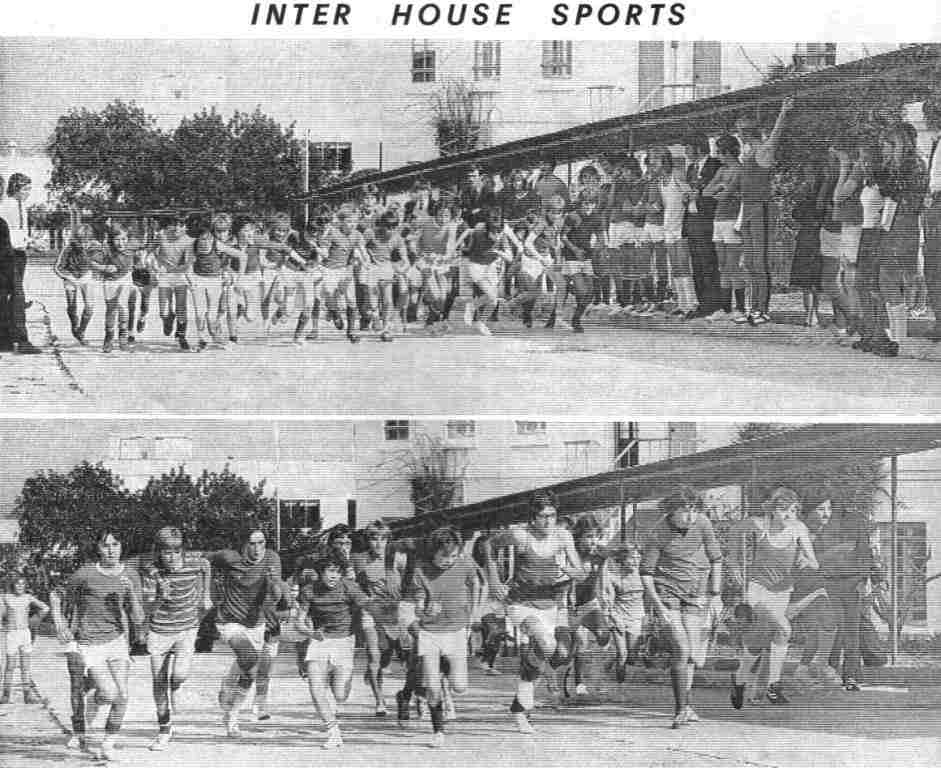
SCHOOL CROSS COUNTRY
Unlike the last two occasions when it was
run, this year's school cross-country
championship was held on a lovely February
afternoon. The sun shone and the air was
mild and still. Perhaps the runners
themselves would have preferred a little
light rain to cool them off in that last hot
and sticky mile but the spectators were
pleased with things as they were.
The trouble with cross-country from the
spectator's point of view is that there is
very little view. He misses all the best
action which happens out on the course. It
is really an event for those taking part and
the heaving lungs, aching thighs and
pounding head have to be enjoyed to be
believed.
Both the Juniors (First and Second Years)
and colts (Third and Fourth Years) ran a
course approximately 2 miles long while the
seniors (Fifth and Sixth Years) ran more
than twice as far, nearly 5 miles. In each
race, positions of the first six runners to
finish for each house were added up to give
the total number of points for the house in
that race. The points scored in all three
races were then added up to give an
aggregate, the house with the least number
of points taking first place. Each house,
therefore, relies as much on its slower
runners gaining positions in the first 15 to
finish as on the fast runners taking the
first 3 places.
In the Juniors race, Andrew Dearlove ran
very well to gain first place for Tedder.
Guy Whelton and Ray Pelan (both of
Cunningham) also put in good performances to
come 2nd and 3rd respectively.
For the Colts Philip Pitman (Alanbrooke)
arrived first, closely followed by Nick
Sillence (Tedder) and Gary Wallington
(Cunningham). Finally, in the Senior Race
Leslie Bartlett (Alanbrooke) had an
excellent run to finish first to the cheers
of the rest of the school who had turned out
to watch the end of the race. He was well
ahead of Dave Ansell and Keith Naylor, both
of Cunningham who were second and third
respectively.The final results was:
1st Cunningham 158 points
2nd Tedder 170 points
3rd Alanbrooke 1811 points
This gave Cunningham their second
consecutive victory, although no Cunningham
runner won any of the races. Alanbrooke,
whose runners won both the Colts' and
Seniors' races
came third, showing how much the houses have
to rely on their slower runners. David
Ansell
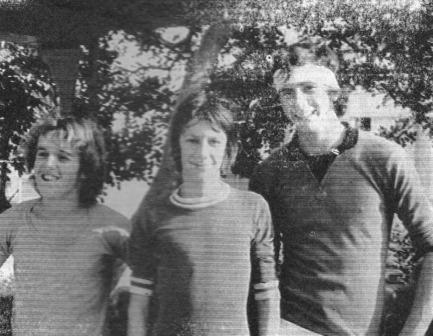
Keith Naylor Leslie
Bartlett David Ansell
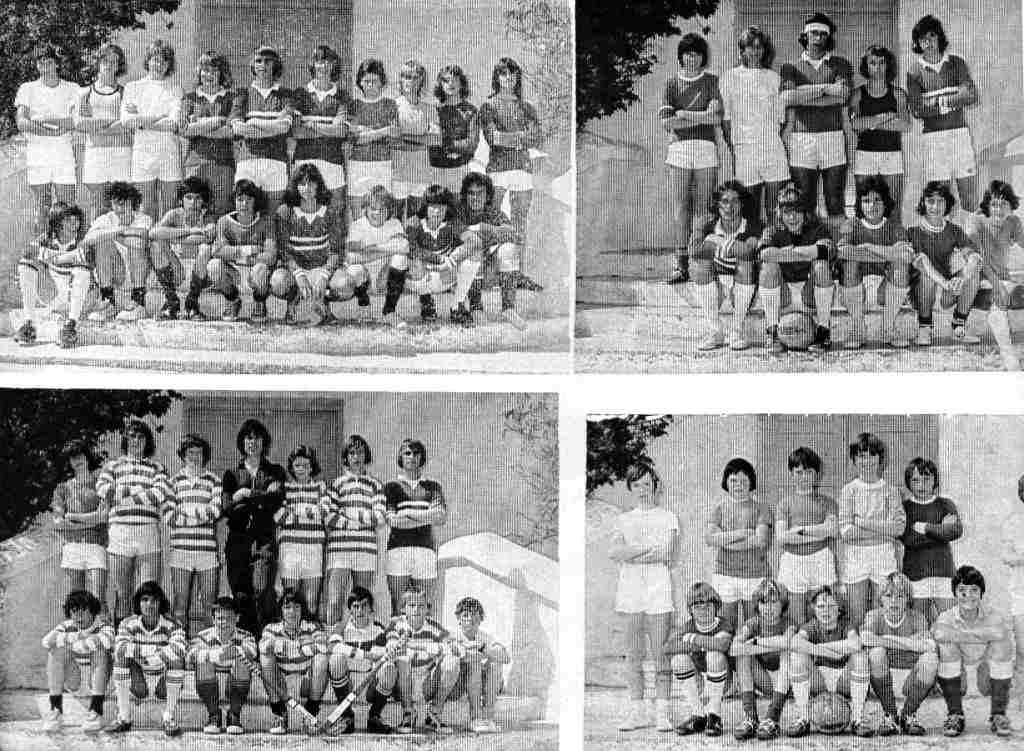 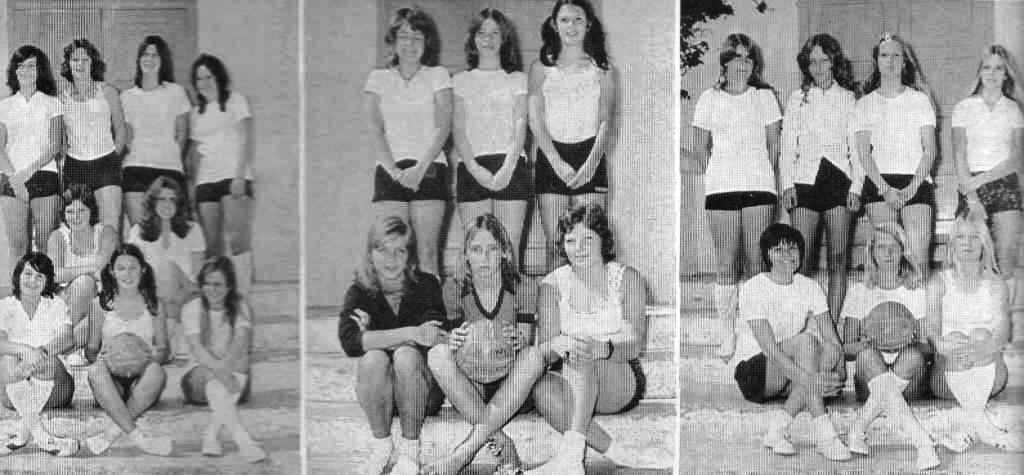
PE — NETBALL
The Senior team have had a busy season
playing in the Services
Netball League. The standard in this league
is generally
high and the girls managed to win 5 out of
their 18 matches but
played well on all occasions, considering
the experience of their
opposition.
Squad: L. Wilkins (Captain), K. Booth, S.
Harvey, P. Pitton, S. Watts, N. Church, J.
Pelan, S. Houghton, M. Rae, A Rowland
GYMNASTICS
Many girls have completed awards in the
last two terms:
Award 4 — 63: Award 3 — 51; Award 2 — 22;
Award 1 — 3 .The following girls were the
ones who have completed Award
1, which is the top award:— Maureen Simpson,
Amanda Ryan,
and Andrea Lord. These plus girls who are
working on their
top award have formed the nucleus of a
flourishing Gymnastics
Club.
HOCKEY
Tal Handaq 'A' team played only three league
matches in
which they won 1, drew 1 and lost 1. In the
services six-a-side
Tournament they played extremely well and
managed to reach
76 final where they lost 2-4 to the more
experienced WRNS side.
In the same Tournament the Tal Handaq 'B'
team got through
to the Semi-Final.
Squad: L. Gallagher, C. Daniels, D.
Johnstone, S. Lovett, J.
Taylor, C. Heffey, K. Barrow, L. Taylor, E.
Hessell (Captain), C
Smith, B.
Cartwright, D. Cowan, D. Creasey, N. Fyffe.
TRAMPOLINE
Several of the Seniors have been working on
their awards
and 10 have successfully completed their
Bronze Standard, these
are now attempting their Silver standard.
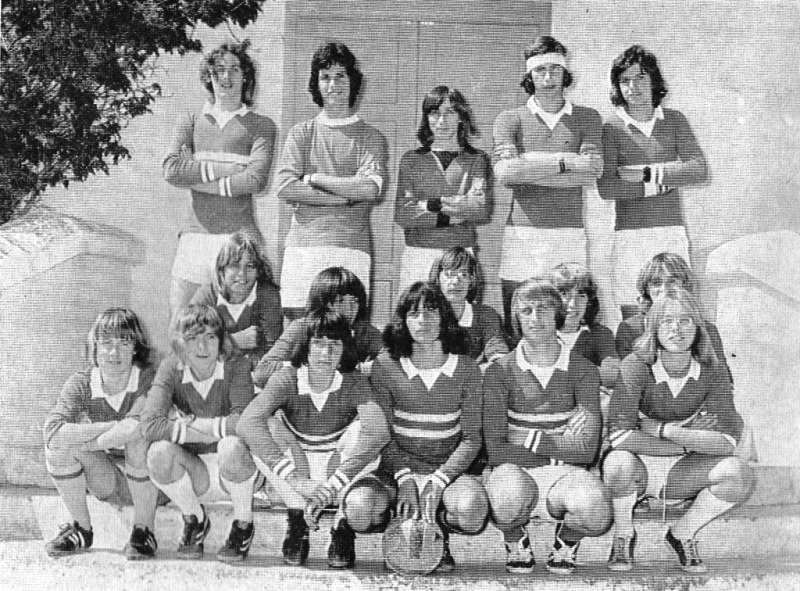
The following players
were members of the 1st XI squad:
I. Jump, D. Jump, D.
Feltham, D. Ansell, D. North, C. Churchward,
D. Norman, H. Helliwell, P. Darmody, D.
Beckett, N. Sillence, S. Rippon, E. Smith,
M. Vernon, L. Churchward, G. Wellington, G.
Lyon, G. Lee.
Leading goalscorers:
E., Smith 9, P. Darmody 7, N. Sillence 7, M.
Vernon 5. On behalf of the school
team, I would like to than Mr Newton, the
Brian Clough of Tal Handaq for giving us his
time in running the school team, his
encouragement and advice on and off the
field of play.
P. Darmody, Captain
1ST XI SOCCER
With the complete break up of the previous
season's side and the smallness of Vlth form
the 1974/75 season was viewed with a little
trepidation.
It is pleasing to report that our fears were
without real foundation and that results
were very much better than we had even dared
to hope. The team played in the Minor Units
Div II where they finished in fourth
position but perhaps the best result of the
season was the 4-3 victory over an Ark Royal
Youth side in a match full of skill and
competitive play.
Much credit must go to Paul Darmody who has
been a first rate skipper both on and off
the Held. In his efforts to help the team,
when injuries or service postings hit the
side. Paul has
played in virtually in all positions. I
should like to thank Paul for his hard work
which has made my task in running the side
so much easier.
Only two other players remained from 1974
Dave Ansell who was dominant centre half
with a style more reminiscent of Clogger
Normanton than Herr Beckenbauer. Ean Smith
scored many fine goals and was a constant
threat both to opposition defences and the
referee.
Ian Jump, Tal Handaq's Peter Shilton, showed
that despite his lack of height he is a
talented, courageous goalkeeper. Dave North
came to us a forward but after moving into
the back four he made tremendous progress
and has proved to be a player cf strength
and ability. Dean Norman and Derek Feltham
were sound, consistent defenders who tackled
and covered well.
In mid-field Howard Helliwell and Paul
Darmody combined well and worked hard to
make chances for the front players. Up front
Martin Vernon was a willing worker whilst
Simon Hopkins showed delicate skills. Late
arrivals were the Churchward twins, Larry
who is a skilful forward with a cultured
left foot and Olive who shows promise of
developing into an exciting full back.
Another hopeful sign the future is the
progress of Nick Sillence who is a player of
pace, skill and aggression.
1974/1975 was a season in which players
gained valuable experience and with
approximately eight of the players available
for next year then perhaps 1975/76 could see
Tal Handaq emerge as a strong combination.
M. J. Newton
Team record:
Played 21; Won 7; Lost 13; Drawn 1; Goals
for 48; Against 67.
SOCCER HOUSE MATCHES
As usual the Inter House Soccer
competition was played on a two leg basis,
one leg played in each of the first two
terms. Cunningham were clear winners being
four points ahead of Alanbrooke with Tedder
a further ten points behind.
Seniors
1st round
2nd round
Alanbrooke v Cunningham
1-8
2-4
Alanbrooke v Tedder
4-2
3-1
Cunningham v Tedder
3-1
2-1
Colts
Alanbrooke v Cunningham
1-3
8-1
Alanbrooke v Tedder
0-2
1-1
Cunningham v Tedder
4-1
4-0
Juniors
Alanbrooke v Cunningham
1-1
2-1
Alanbrooke v Tedder
6-0
2-0
Cunningham v Tedder
2-2
4-1
Final Table
Cunningham 12 8 2 2 37 21 18 ,:
Alanbrooke 12 6 2 4 31 24 14
Tedder 12 129 12 35 4
Some consolation for Tedder was the win of
their 1st Year team in the Minor League.
Cunningham and Alanbrooke both finished
behind all the Primary School teams.
In the six-a-side Alanbrooke came out on top
in a closely fought contest one point ahead
of Cunningham.
Soccer Colours
FULL: P. Darmody, D. Ansell..
HALF: D. Norman, M. Vernon, H. Helliwell, D.
North, N. Sillence
RUGBY
Once again Rugby House
Matches were played on a year basis. First
to Fourth Years were invloved with some very
keenly contested and close contests taking
place in every group.
Alanbrooke were clear overall winners of the
tournament. The results were as follows:
1st Year
Alanbrooke 10
v Cunningham 0
Alanbrooke 12 v Tedder
8
Cunningham 0 v
Tedder 4
2nd Year
Alanbrooke 0 v
Cunningham 3
Alanbrooke 12 v Tedder
7
Cunningham 6 v
Tedder 9
3rd Year
Alanbrooke 20
v
Cunningham 12
Alanbrooke 16
v
Tedder 10
Cunningham 10 v
Tedder 10
4th Year
Alanbrooke 12
v
Cunningham 4
Alanbrooke 30
v
Tedder 28
Cunningham 28
v
Tedder 11
Overall Placings
1st Alanbrooke
8 6 0 2 112 82
12
2nd Cunningham
8 3 1 4 73
76 7
3rd Tedder
8 2 1 5 87
114 5
BASKETBALL
Seniors and, Colts games were played in
the Spring term to decide the championship
on a League basis. Alanbrooke were the top
side.
results were as follows:
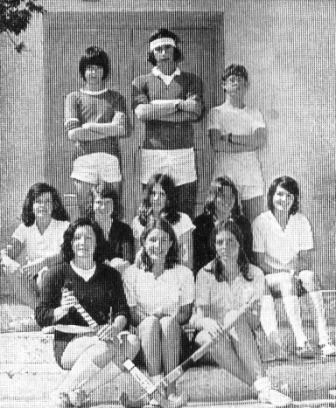
Seniors
Alanbrooke 16
v
Cunningham14
Alanbrooke 16 v
Tedder 10
Cunningham 18
V
Tedder11
Colts
Alanbrooke 2
v W/O Cunningham 0
Alanbrooke 18
v
Tedder 14
Cunningham 14 v
Tedder 3
Final Positions
1st Alanbrooke 4 4 0
52 42 8
2nd Cunningham 4 2 2
46 32 4
3rd Tedder 4
0 4 38 06 0
KARATE
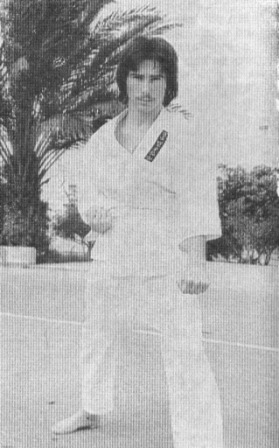 The
origin of Karate dates back more than a
thousand years. Karate written in Chinese
characters means "Chinese hand". The modern
master of this, Funakoshi Gichin, who died
in 1967 at the age co eighty-eight, changed
the characters to mean literally "empty
hand"'. To the master, karate was a martial
art, bat it was also a means of buliding
character. He wrote: "As a mirror's polished
surface reflects whatever stands before it
and a quiet valley carries even -small
sounds, so must the student of karate render
his mind empty of selfishness and wickedness
in an effort to react appropriately toward
anything he might encounter. This is the
meaning of kara, or "empty", of karate. The
origin of Karate dates back more than a
thousand years. Karate written in Chinese
characters means "Chinese hand". The modern
master of this, Funakoshi Gichin, who died
in 1967 at the age co eighty-eight, changed
the characters to mean literally "empty
hand"'. To the master, karate was a martial
art, bat it was also a means of buliding
character. He wrote: "As a mirror's polished
surface reflects whatever stands before it
and a quiet valley carries even -small
sounds, so must the student of karate render
his mind empty of selfishness and wickedness
in an effort to react appropriately toward
anything he might encounter. This is the
meaning of kara, or "empty", of karate.
Karate is gaining great popularity as a
competitive sport, one which stresses mental
discipline as well as physical prowess. It
has changed through the centuries to become
not only a highly effective means of unarmed
self-defence, but also an exciting,
challenging sport.
J.B.J.
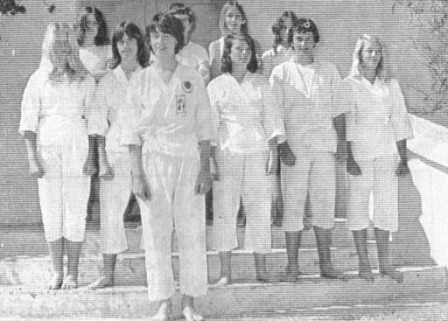 J.
THOMPSON Zenkutsu-dachi gedan-barai J.
THOMPSON Zenkutsu-dachi gedan-barai
(front-stance with a downward block)
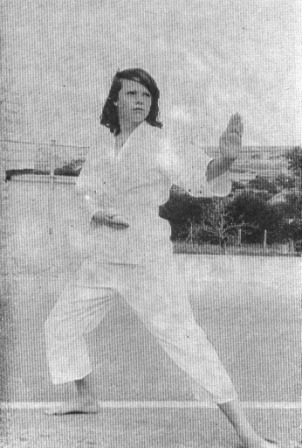
The school is lucky to
have such a knowledgeable and dedicated
karate teacher as Mr Barrie Jones. One of
the problems with this sport is, of course,
that one Bruce Lee film and a fourteen year
old thinks that what he has just seen on the
screen is a skill he can put into practice,
almost at once. If he has great dedication
and is willing to learn control of mind and
body then he can get a good deal of benefit
out of the art. The people on the pictures
on this page could already verify this even
after less than six months doing Karate.
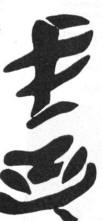
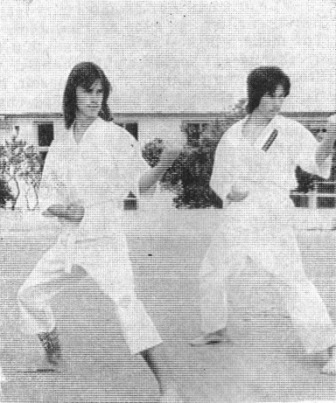
S. NESBIT and THOMPSON
Hangetsu-dachi
(half-moon stance)
JUDITH WAGHORN
Kokutsu-dachi shuto-uke
(back-stance knife-hand block)
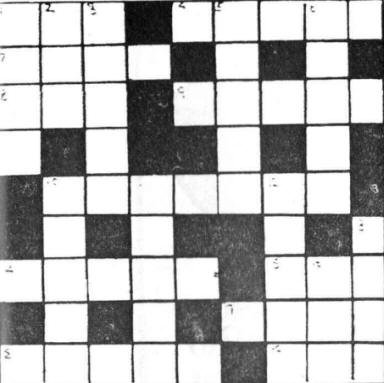
|
CLUES ACROSS |
CLUES DOWN |
|
1. Part of a railway engine (3) |
1. Brother of Abel (4) |
|
2. There are white ones at Dover (6) |
2. Skill of a painter (3) |
|
3. A song from an opera (4) |
3. It's sometimes called a buffalo
(5) |
|
8. An impersonal adjective (3) |
5. Relative of the camel |
|
9. A subject of Queen Mab (5) |
6. They provide warmth (5) |
|
10. Most of them have legs (7) |
10. The scene of a contest (5) |
|
14. You press it with your foot (5) |
11. Another word of a contest (5) |
|
15. A famous American general (3.) |
12. Popular flowing shrub (5) |
|
17. Denuded (4) |
13. Don't give away (4) |
|
18. To jump about (5) |
16. A period of years (3) |
|
19. Part of a uniform, perhaps (3) |
|
Deborah Frame 1S
'MATHS FUN I A
Reconstruct the following multiplication problem:
|
4 X X |
|
3 X |
| 36 X X |
| XX7 X |
| XX3 X X |
B
A Census taken in a Zoo was given the
following information to the question "How
many birds and how many beasts?" — There are
36 heads and 100 feet altogether in the two
species. Can you find the number of birds
and beasts?
C
One of the Smith twins borrowed £5 from Mr
Jones. Even though Harry Smith always tells
the truth and Bill Smith always lies, Jones
was able to determine which one had borrowed
the
money by asking only one question. What
Question did he ask?
D
In the Cryptarithm ERIN divided by
LYRE equals L. is greater
than
2 and each
letter uniquely represents a particular
digit
in the
decimal scale. What are these digits?
E
Escape?
Three Robbers have decided to hijack a safe
from the
top of a 3 storey building -. their only means
of escape is by a rope passing over a pulley
and a basket on each
end and so arranged that when a basket
is on the ground
the other is opposite the top of 3rd floor. If one basket has
a heavier load than the other, then the
heavier will descend. If the excess on either side were greater
than 20 Lbs,
the basket would descend at a pace dangerous to a person in
the basket (Though the safe would withstand
the fall).
The rope was in such a position that the
robbers could not
check it. If the robbers weigh 170 Lbs, 100
Lbs, 80 Lbs respectively and the safe is 80 Lbs, how do they succeed?
MATHS FUN II
KNOCKOUT
100
players enter a knockout competition, how
many matches
must be
played in order for an overall winner to be
determined?
(2 players
in a match) (loser eliminated) (Byes do not
count).
PAGES
It takes 852 digits to number the pages of a book.
How many pages are there?
IL-LOGIC?
In a recent Maths lesson we were asked to
find 6 divided by 0?
Answers: Let 6 divided by 0 equals
X
Therefore
6 equals 0 multiplied by X
equals 0
Therefore
6 equals 0 ???
FRACTIONS
Start with a square and divide each side
into 3 equal parts.
Divide the square into 9 equal squares. Block
out the 4 corner squares formed. What
fraction of the original square remains?
Repeat the process with the centre square
and continue the
process indefinitely. What fraction of the
original square is unshaded?
DISTANCE
A man walks due East from his home for 1
mile. He
then walks due North for 1/2 mile, due West for 1/4
mile, due South for 1/8, due East for 1/16
mile etc. If his journey continues
indefinitely, then assuming that it can be
argued
that his journey ends at a particular point,
how far from
the man's home will this point be and on what bearing?
LIBYA
I have been in Tal Handaq
since September 1974. Before
that I did not go to school
but did my lessons by correspondence
courses. I was in Libya
because my father works there and so
we went to live with him. We
were there for two years.
The weather in Libya is not
all that different from what we
get here in Malta, at least
on the coast where we lived in a
caravan within sight of the
sea. The rain falls in the winter
and the summers are baking
hot. One way that Malta is different is in
its size. It is so small compared with the
huge valleys and plains of Libya.
We lived on the edge of the
salt-flats. These are large areas of flat
ground from which you get salt crystals if
you go out a
long way on them. It is not
advisable to go out on them when it
rains because you can easily
sink down and disappear for ever.
I liked Libya especially in
the summer because then the
farmers are threshing and
carting their corn to the salt flats.
They let you sit on the top
of the loads and you sway around every time
a cart wheel goes over a hole in the road.
The Libyan people are very
friendly and always want you
to go to their houses to meet
their families. I met many Arab
children. In fact I have a
real lot of friends there — more than
I have in Malta. Sometimes I
used to go down to the fields with
them where they would often
attend to the flocks of sheep.
The beaches are very long and
very clean and the water is
very clear. You can see to
the bottom very easily. The children
liked to go for a dip in the
sea after working in the fields.
Amongst other things they
grew tomatoes, potatoes, parsley, peppers,
melons, pumpkins, grapes and citrus fruits.
Jacqueline Ann Hall 1J
THE FRAGMENTS OF TOMORROW
Unforgotten beings linger in my mind, My
heart is supressed and tortured,
As the broken pieces we sprinkled on the
ground:
As if the sun has fallen from the heavens,
Everything is ending quickly and
dramatically,
My head is tight with combustion.
Having no means to explode.
The highness and pressure curve in around
me,
I am sealed in a vacuum of vapour,
I want to be released and set free,
But my burdens are too immense.
Anon 6A
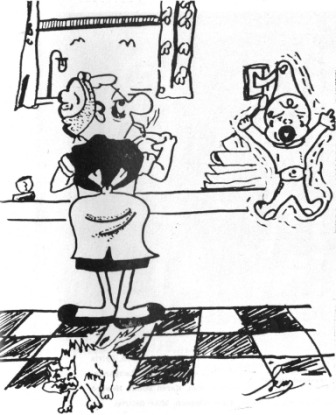
ODE TO A MOTHER
Who comforts me when I am low With cheerful
words —• "I told you so. You never listen to
what I say. You think you're right in every
way!"
About her cooking enough is said Her airy
"Sponge" is more like lead. But I suppose I
can't complain There's always aspirins for
the Pain.
An Argument that brings cold food And she
exclaims: "Who's in a mood? I'm always
cheerful, I never pout. It's you," she says,
"You lazy lout!''
But jokes aside she is the best For nineteen
years she's stood the test. Where would I be
without me Mum — "Julie, are those dishes
done?!"
Julie Davies U6
LIVING IN MY FRUSTRATION
With a pessimistic view of my life
I sit alone and broad,
I am surrounded in the deathly silence of my
room.
Faces and visions keep coming into my mind,
Feelings of unwantedness and fear,
As I turn to face the future
Without a sign of hope or joy,
Only memories of the past
That will soon fade into
A rapture of nothingness.
Anon 6A
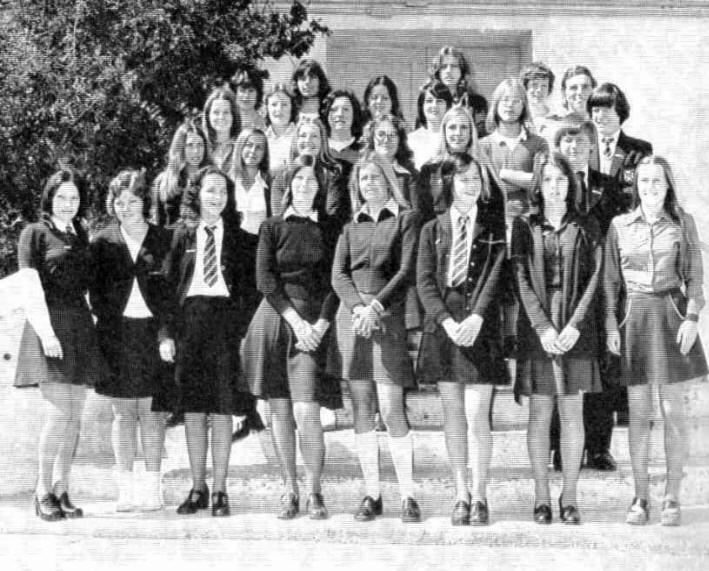
PREFECTS First Row: Alex
Rowlands, Sharon Watts, Julie-Marie Glennon,
Sylvia Houghton, Helen Male, Veronica Haste,
Jill Cartwright, Angela Berrington.
Second Row. Erica Stapley, Debbie Brankin,
Christine Williams, Kathleen Laughnan,
Alison Waghorn, Richard Howorth.
Third Row: Sue Fitton,
Sue Harvey, Julie Taylor, Julie Davies,
Karen Booth, Howard Helliwell, Robert
Burns.
Fourth Row: John Allcott, Paul Darmody, Jil
Pelan, Dave Simpson, Mike Baltrop
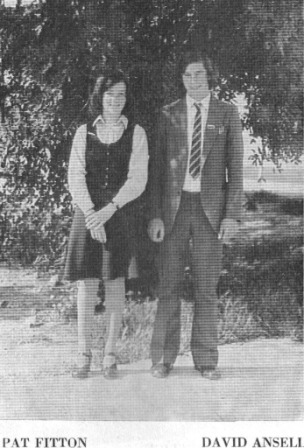
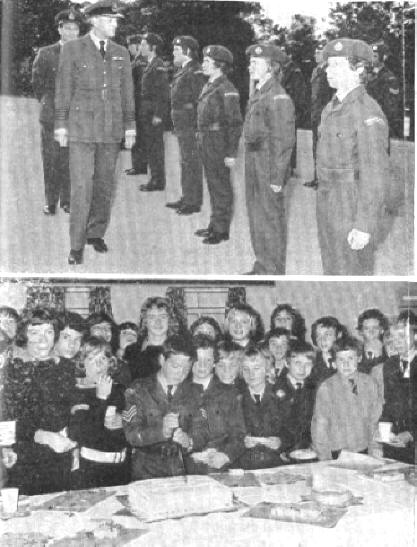
TAL HANDAQ CONTINGENT
CCF ANNUAL INSPECTION
Cadet Training
Prior to summer routine timings, we managed
to get in six full contingent parades
during the summer term H974. These were held
at RAF Luqa as we felt it would be good for
morale to get away from the school environs.
However the need to be
transported to our HQ at 1530) hrs and then
back to school in
time to feed into the late bus routine at
1700 hrs cut into the
time available for training. During the
weeks of summer routine
it was impossible to hold normal parades, so
we concentrated
en giving as many cadets as possible,
experience in the handling
and firing of small-bore weapons on the
ranges of RAF Luqa
and 234 'Signals, Mtarfa. The term ended
with a two-day exercise
for the contingent, based on Hal Far, but
involving orienteering,
rock climbing, camping, range-firing and
swimming. It seemed therefore that we had
got off to a good start, despite the
impossibility we had in kitting out cadets
in old-style, khaki-drill
uniform.
Unfortunately over the summer holiday period
and extending
into the autumn term, the contingent
suffered a massive
turnover. The magnitude can be best gauged
by reference to
figures and shifts in the strengths of the
two sections. Of the
RAF Sections current strength of 27 cadets,
only 16 remain from
the initial intake of 37 in April 1974. The
RN Section had an
initial intake of 25 cadets, only 10 still
remain but recent recruitment
has boosted the section strength to 34
cadets. Thus
the overall contingent strength is still
very close to the establishment
figure. Training during the Autumn term
however,
was inevitably a case of "back to basics".
To make better use of
our time, we decided to switch the parades
to Tal Handaq,
thereby cutting out travelling time and
making use of the resources
more readily available at the school. Thus
basic training,
together with range practices, AEF with 203
Sqdn., for RAF
Section cadets, visits to frigates,
destroyers and carrier for the
RN Section, has been the pattern of cadet
activities.
We are not entirely satisfied with this
pattern. There is
tendency to lay too much stress on the
requirements of printed
syllabuses. This is understandable if one
bears in mind the fact that "proficiency
possess" tend to assume a dominant role in
assessing the efficiency level of
contingents.
Of our present cadet strength, only 6 RAF
and 3 RN cadets
have passed all parts of the basic training
syllabus. But these
figures must be seen in the context of
turnover, ability, age
and time available. Most of the cadets have
had little more than
one term in the CCF; the duration of parades
is limited to about
one and a half hours at the most and on one
day per week.
We have looked at the possibility of
increasing the time allocation, but without
success, other evenings and Saturday
mornings and lunchtimes being devoted to a
wide range of other activities.
Stores and Uniforms
The contingent is slowly accumulating stores
but our main
problem is that of kitting out cadets. At
present over 20 cadets
have uniform deficiencies, mainly berets on
the RN side and
Small B/D sizes on the RAF side. Unless our
demands for clothing
can be met over the next few days, it will
not be possible
to have a full contingent turnout for the
parade and inspection
on March 6, 1875.
Concluding
Remarks
We feel that we must widen our range of
activities in order
to make the cadet force more relevant to the
needs and aptitudes
of the majority of cadets. Canoe
construction and instruction,
model making, first aid and sailing are some
things we
have in mind. The RN Section would
appreciate more assistance
from its parenting body and the appointment
of a second officer
is now a priority matter, with the impending
departure of Sub
Lt. Ditcham at the end of next term.
We are most grateful to both RAF Luqa and
HMS St. Angelo
for the assistance they have already given.
Our sincere thanks
too, we give to all those individuals,
service and civilian, too
numerous to mention in this report, but
without whose help and guidance the Tal
Handaq Contingent, CCF, would hardly be able
to function at all.
EXAMINATION RESULTS
| |
LONDON "A" LEVEL — JUNE 1974
|
|
|
Boys |
English Literature:
|
Peter Brankin |
| |
Geography: |
Peter Brankin,
David Phillips. |
| |
History: |
Peter Brankin, Jeremy Jackson-Sitner.
|
| |
Chemistry:
|
Peter
MacGregor, David Phillips. |
| |
Mathematics: |
Peter
MacGregor, David Phillips. |
| |
Economics: |
Roger Slim. |
| |
Physics: |
Peter
MacGregor, Michael Smith. |
|
Girls |
English Literature: |
Christine Harrison. Christine
Johnston,
Phillippa
Knight, Annette Lyons, Jennifer
Mitchell, Elizabeth
Partridge. |
| |
Geography: |
Christine Harrison, Christine
Johnston, Philippa
Knight, Jennifer Mitchell. |
| |
History: |
Christine Harrison, Christine
Johnston, Philippa
Knight, Jennifer Mitchell. |
| |
Chemistry: |
Linda
Ross. |
| |
Mathematics:
|
Linda Ross. |
| |
Physics: |
Linda
Ross. |
| |
Religious Studies: |
Annette Lyons. |
| |
|
|
| |
OXFORD "A" LEVEL — JUNE 1974
|
|
|
Boys |
Art: |
Jeremy Jackson-Sitner, Stephen
Jones. |
|
Girls |
Art: |
Patricia Pitton, Jill Piper. |
| |
LONDON "O" LEVEL — JUNE 1974
|
|
|
Girls |
Mathematics C: |
Jonquil
Beynon, Susan Dearlove, Trudi
Donvin,
Karen Hepworth, Sylvia Houghton,
Ann Langford, Vivien
Lowson, Helen Male, Jane
Mathews.
|
| |
Mathematics D: |
Shannon
Branch, Linda Cottam,
Julie-Marie
Glennon, Joy Marshall, Caroline
Smith. |
| |
English Language:
|
Penelope Ashenhurst, Jonquil
Beynon,
Shannon Branch, Deborah Brankin,
Linda Cottam, Susan Dear-love,
Trudi Donvin, Gwenda Edgel,
Irene Elms, Frances Franklin,
Georgina Gall, Julie-Marie
Glennon, Sara Harbour, Susan
Harris,
Card Hedges, Karen Hepworth,
Janet Hinde, Sylvia Houghton,
Ann Langford, Vivien Lowson, Helen Male, Jane Matthews, Co-rinna
Slater, Caroline Smith, Donna
Wakefield, Hilary Wareing.
Gale Wellman. |
| |
History C:
|
Francis Franklin, Sylvia
Houghton, Caroline
Smith, Donna Wakefleld. |
| |
Geography:
|
Deborah Brankin, Linda Cottam,
Julie-Marie
Glennon, Sara Harbour, Karen
Hepworth, Sylvia Houghton,
Vivien Lowson, Helen Male, Jane
Matthews, Donna Wakefleld |
| |
Biology: |
Shannon Branch, Deborah Brankin
Linda Cottam,
Julie-Marie Glennon, Susan
Harris, Karen Hepworth, Sylvia
Houghton. Viven Lowson, Helen
Male, Jane Matthews. |
| |
English Literature A:
|
Deborah Brankin, Linda Cottam,
Susan
Dearlove, Irene Elms, Frances
Franklin, Julie Marie Glennon,
Carol Hedges, Karen Hepworth,
Sylvia Houghton, Ann Langford,
Vivien Lowson, Jane Matthews,
Corinna Slater, Donna Wakefield. |
| |
French:. |
Penelope Ashenhurst, Jonquil
Beynon, Shannon
Branch, Susan Dearlove, Frances
Franklin, Julie-Marie Glennon,
Karen Hepworth, Sylvia Houghton,
Vivien Lowson, Helen Male,
Corinna Slater. Donna Wakefleld. |
| |
Needlework and Graft:
|
Penelope Ashenhurst, Shannon
Branch, Deborah Brankin, Linda
Cottam, Susan Dearlove, Frances
Franklin, Julie-Marie Glennon,
Susan Harris, Karen Hepworth,
Annette Lyons. |
| |
Physics: |
Penelope Ashenhurst, Shannon
Branch, Karen
Hepworth. |
| |
History B & E:
|
Deborah Brankin, Linda Cottam,
Card
Hedge, Vivien Lowson, Jill
Piper. |
| |
Latin SOP:
|
Deborah Brankin, Sylvia
Houghton, Vivien Lowson |
| |
Chemistry: |
Shannon
Branch, Julie-Marie Glennon,
Karen
Hepworth, Helen Male. |
| |
English Literature B: |
Charmaine
Burton, Georgina Gall, Jill
Piper, Caroline Smith. |
| |
Food & Nutrition:
|
Susan Dearlove, Irene Elms,
Susan Fitton,
Gillian Harris, Jane Matthews,
Lynda Van Maurik, Donna
Wakefleld,
Fenny Worseley-Smith. |
| |
Human Biology: |
Susan
Dearlove, Frances Franklin,
Carol Hedges, 'Caroline Smith,
Lynda Van Maurik. |
| |
Commerce: |
Carol
Hedges, Ann Langford. |
|
Boys |
British Constitution: |
Stephen
Jones, Timothy Latham. |
| |
English Literature: |
David
Ansell, Peter Catling, Anthony
Davidson, Steven Easton. |
| |
English Language:
|
David Ansell, Peter Catling,
Christopher Dillon, Steven
Easton, Richard Howorth,
Christopher Lawrie, Glen
Miller, Mark Norman. |
| |
Chemistry: |
David Ansel, Peter Catling,
Anthony Davidson,
Christopher Dillon, Richard
Howorth, Ian Jump. |
| |
Biology: |
David
Ansell, Peter Catling, Anthony
Davidson, Steven
Easton. |
| |
Human Biology: |
John
Allcott, Byron Bartlett, Richard
Howcrth,
Timothy Latham. |
| |
Geography: |
David
Ansell, Terence Calcott, Peter
Catling,
Anthony Davidson, Stephen Jones,
Marshall Keating, David
Stapleford. |
| |
History: |
David Ansell, Christopher Lawrie. |
| |
Physics: |
John
Allcott, Peter Catling, Anthony
Davidson,
Christopher Dillon, Steven
Easton, Richard Howarth, Ian
Jump,
David Stapleford, Peter Whiting. |
| |
Mathematics D: |
Kim Maidment, Peter Whiting. |
| |
Mathemaitics C: |
Peter,
Catling Stewart Chritton,
Anthcny
Davidson, Richard Howorth, Ian
Jump. |
| |
History C: |
Kim
Maidment, Geoffrey Simister,
Peter Whiting. |
| |
Technical Drawing: |
Richard
Howorth, Timothy Latham, Kim
Maidment. Mark Norman. |
| |
English Literature B:
|
Steven Jones, Kim Maidment,
Peter
Whiting. |
| |
French: |
Christopher
Lawrie. |
| |
Music: |
Edward
Knox. |
| |
Commerce: |
Timothy
Latham, Christopher Lawrie,
Peter
Whiting. |
| |
OXFORD "O" LEVEL —
JUNE 1974 |
|
|
Boys |
Art: |
Byron
Bartlett, Terence Calcott, John
George. Selwyn
Hopkins, Marshall Keating, Alan
McVey, John Mickleborough,
Paul Smith, Christopher Ward. |
| |
Pottery: |
Robert
Coutts, John Duff, Steven
Easton, Simon Hopkins,
Christopher Lawrie, Mark Lovett,
Michael Veitch. |
|
Girls |
Art: |
Linda
Cottam, Christina Darmody,
Caroline Gaffney,
Leonora Gallagher, Carol Hedges,
Sylvia Houghton, Kathleen
Loughnan, Vivien Lowson, Helen
Male, Louisa Power, Corinna
Slater, Gillian Walls, Gale
Wellman, Julia Winch. |
| |
PITMANS EXAMINATIONS — MARCH
1974 |
|
| |
Pitmanscript: |
Pearl
Donvin, Gwenda Edgell, Janet
Veitch,
Gillian Walls. |
| |
Typewriting -- Elementary: |
Christina Darmody, Susan
Dearlove, Frances Franklin,
Julie Hancock, Christine
Johnston,
Anne Marie Langford, Kathleen
Loughnan, Erica Stapley, Donna
Wakefleld, Gillian Walls, Gale
Wellman. |
| |
JUNE 1974 |
|
| |
Typewriting
— Elementary: |
Irene Elms Susan
Fitton, Janet
Hinde, Jacqueline Morris,
Alexandra Rowland, Janet Welch,
Julia
Winch. |
| |
Typewriting
-- Intermediate:
|
Jean Boomer, Pearl Donvin (1st
Class), Gwenda Edgell (1st
Class), Carol Wilkins (1st
Class). |
| |
Pitmanscript:
|
Janet Veitch 60 w.p.m. |
| |
LONDON "O" LEVEL — JANUARY 1975 |
|
| |
Maths Syllabus C: |
Ian Jump. |
| |
Maths Syllabus D:
|
Paul Darmody. |
| |
Technical Drawing:
|
Mark Hyland. |
| |
C.S.E. 1974
|
|
| |
Boys |
Stephen Allan,
John Allcott, Nigel Angel, David
Ansell,
Michael Barltrop,
Byron Bartlett, Michael
Beaumont, Terence
Calcott, Jacques
Callens, Peter Catling, Chris
Church, Robert
Coutts, Anthony
Davidson, Chris Dillon, John
Duff, David Gibson,
Ronald H'indle,
Simon Hopkins, Selwyn Hopkins,
Richard Ho-worth,
Paul Hyland, 'Stephen Jones, Ian
Jump, Marshall Keating,
Edward Knox, Timothy Latham,
Christopher Lawrie, Mark
Lovett, Arnold
Magill, Gary Martin, Alan McVey,
John Mickleborough,
Glen Miller, Mark Norman, Olive
Pentecost, Peter Robinson,
Geoffrey Robinson, Geoffrey
Simister, Paul Smith, David
Stapleford, Colin Stapley,
Michael Veitch, Christopher
Ward, Peter Whiting, Kevin Yull.
|
| |
Girls
|
Penelope
Ashenhurst, Lynn Barman, Jonquil
Beynon, Jean Boomer, Karen
Booth, Shannon Branch, Deborah
Brankin, Char-maine
Burton, Linda Cottam, Deborah
Creasy, Christina Darmody,
Susan Dearlove, Pearl Donvin,
Trudi Donvin, Gwenda Edgell,
Irene Elms, Susan Fitton, Linda
Fletcher, Frances Franklin,
Caroline Gaffney, Georgina Gall,
Leonora Gallagher, Marcia
Gilscn,
Julie-Marie Glennon, Julie
Hancock, Sara Harbour, Gillian
Harris, Carol Hedges, Karen
Hepworth, Janet Hinde, Sylvia
Houghton, Anne
Langford, Kathleen Loughnan
Vivien Lowson,
Annette Lyons, Caroline Magill,
Helen Male, Jane Matthews,
Jaqueline Morris, Jill Piper,
Louisa Power, Corinna Slater,
Carolyn Smith, Erica Stapley, Lynda Van Maurik, Janet Veitch, Donna
Wakefield, Gillian Walls, Hilary
Wareing, Christine Johnston,
Gale Wellman, Carol Wilkins,
Julia Winch, Lorraine Woodfin,
Penny Worseley-Smith.
|
LAUGH WITH KEVIN
And she's got a marvellous old mother. She's
79 and hasn't
one grey hair. She's completely bald.
I wouldn't say my wife pushed dirt under the
carpet — but
I have to walk uphill to the fireplace.
Candles
make light meals.
AN AMERICAN
JUNIOR HIGH SCHOOL
Williamsburg Junior
High School is in Arlington County,
Virginia. It is an average sized Junior High
of about 1000 students.
It is a school for 7th, 8th and 9th graders,
that is, in
Tal Handaq terms, 2nd 3rd and 4th formers.
This was my school
before we came to Malta and I would like to
tell you briefly
about some of the differences between it and
Tal Handaq.
The kind of sounds you hear there through
out the day is
different for a start. Instead of the crash
of desk lids being
dropped, there is the clang of metal lockers
being slammed shut.
Instad of hearing feet crunching over gravel
and slapping on concrete, you can hear them
clattering on the linoleum of the
halls. Instead of the ringing of
telephones you can hear announcements
made on the Public Address system. You never
hear the noise of children playing because
there is no time
for them to. At Williamsburg there is no
break and most of the
half-hour lunch period is spent indoors.
Everyone has one lesson
of PE per day, but it is a lesson and not a
recreation.
The things you
see are different too. There is no school
uniform
and everybody wears something different.
Within reason you can
wear what you want to: bathing suits and Halloween costumes are
forbidden. You never see prefects patrolling
the halls because
there aren't any in American schools.
Discipline is maintained
by the teachers, the two assistant
principals and the
guidance counsellors. These latter also give students advice
about what
options to take and help them to solve any
problems
they may
have at home or at school.
As far as sports are concerned there seems
to be more enthusiasm
than at Tal Handaq mainly because of the
rivalry
between the various junior high schools in
the county. There are
five of them in Arlington and the
competition between them is
keen. At sporting events there is usually a
large turn out to cheer
the team on to victory. Last year
Williamsburg was county
champion in football, basketball, swimming
and tennis. Wrestling,
soccer and track teams also had outstanding
seasons.
Williamsburg is a good school in many
respects. The quality
of the teaching is high and the behaviour of
the students is
generaly good. In many ways it is much like
Tal Handaq.
Joanne Wiggins 4L
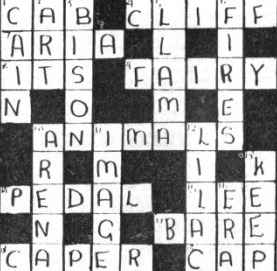
ANSWERS TO STAFF QUESTIONNAIRE
|
A Mr Hughes |
M Mrs Lynk |
|
B Lt/Cdr Richards |
N Mr Woolams |
|
C Mr Winn |
O Mr Ricketts |
|
D Mr Caseley |
P Miss Wilson |
|
E Commander Stubbs |
Q Mr 'Leonard |
|
F Miss Dickinson |
R Mr Naylor |
|
G Miss Leighton |
S Mr Finnis |
|
H Mr Allen |
T Miss Walden |
|
J Miss Beckett |
U Mr Newton |
|
K Miss Turner |
V Lt/Cdr Nield |
|
L Miss Lattimer |
W Mr Jones |
Maths Fun I — Answers:
B. 22 Birds; 14 Beasts.
C. Jones said "If I were to ask you if you
borrowed £5 from me.
would you say yes?"
D. Restate the problem as (LYRE) multiplied
by L equals ERIN
Step 1. L greater than 2, therefore L equals
3 since L multiplied
by L equals E and we are not allowed to
carry a digit
Step 2. If L equals 3.
E equals 9.
Step 3. Now L
multiplied by E equals 3 multiplied by 9
eqvals 27.
Therefore N equals 27.
Step 4. By trial and
error we now find R equals 8, I equals 6.
Y equals 2. Final
answer: 9867 divided by 3289 equals 3.
Maths Fun II Answers:
KNOCKOUT: Each match eliminates one person,
99 losers hence 99 matches.
PAGES: 320 Pages.
FRACTIONS: Fraction unshaded equals 1/2
ILL-LOGIC: Division by zero is impossible,
so original statement 6 divided by 0 equals
X is incorrect since it assumes there is an
answer X.
DISTANCE: If D represents the distance
travelled East
D equals 1 minus 1/4 plus 1/16 minus 1/64.
plus 1/256
equals 1 minus 1/4 plus 1/16 (1 minus 1/4
plus 1/16 )
equals 1 minus 1/4 plus 1/16D 15/16D
equals 3/4 D equals 4/5
mile.
Similarly distance travelled North equals
2/5 mile Hence distance from (0,0) to (4/5,
2/35) equals 2 square root 5 over 5 miles.
(No I don't understand it either and I'm a
navigator! DMG)
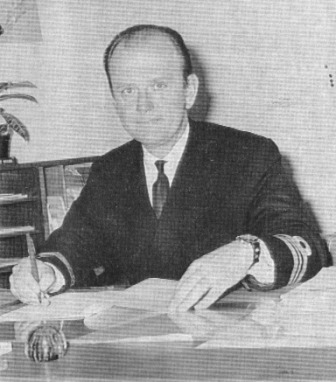
DHM
It was on a cold, windy January morning that
I first heard
of Tal Handaq. I was sitting in my centrally
heated office at
R.N.A.S. Yeovilton in deepest Somerset
(where I was the Education
Officer) when the phone rang and a
mysterious voice enquired "How do you fancy
being the Deputy at Tal Handaq?"
Various possibilities flashed through my
mind. Was I being
offered the chance of fame as a second Matt
Dillon at some
frontier town deep in Indian infested
territory or was it as a
James Bond style assistant to the British
Ambassador in some
newly formed oil rich eastern state? The
voice continued, "I'd
like you to take the Deputy Headmaster's job
at our Comprehensive
school in Malta!"
By this time I'd noticed that it was snowing
outside and
on my various Mediterranean cruises with the
grey funnel line
I'd never actually visited Malta — so I
accepted. Some six months
later complete with family and duty free car
we'd settled in Malta and so far I'm pleased
to say are enjoying the country
and Tal Handaq.
The job of DHM I've found to be very varied
and covers
every aspect of school life, from discipline
to day-to-day timetabling
problems. If you're still not clear, then
the DHM is the
person who arranges for you to have French,
Maths and Latin period 6, 7 and 8 on a
Friday afternoon and always makes sure
that Physics follows Woodwork (just to keep
you fit getting there
on time).
Seriously though, I'm very happy to be a
member of the
Tal Handaq staff and will I'm sure, like so
many pupils, be sorry
when my time comes to depart.
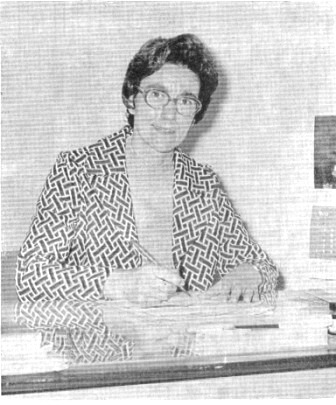
FAREWELL TO TAL HANDAQ
After four eventful years as Senior Mistress
and Head of
Lower School it is now time for me to say
'Farewell'. My term
of office has been short compared to that of
my predecessor,
Miss Jacqueline Yule, who is still a good
friend of the school
and a person to whom I wish to pay a special
tribute for the
friendship and help she has extended to me
during my stay
in Malta.
I use the word 'eventful' advisedly for in
this short space
of time I have seen a flourishing school
close down, re-open and
flourish again. It says much for the spirit
of both staff and pupils
that newcomers find it hard to appreciate
the school has suffered
this interruption. Of all the aspects of the
school the one which
has impressed me most is the ability of the
Service child to
adapt to new situations. New pupils are so
quickly assimilated
that 'Turbulence' is not an apparent
problem. It is always a
surprise to me to note that our turn-over is
so high because
I have not been conscious of the continual
movement of pupils.
Perhaps July of this year will prove the
exception for we are
due to lose over one hundred children in one
week!
There are so many happy memories I shall
carry away with
me and I hope you will forgive my mentioning
a few: the excitement
of a new set of First Years on their first
day in secondary school; Prize Day 1973; the
many sporting events; the successful
productions of 'Oliver', 'The King and I',
'Lady Precious
Stream" and the Christmas Concerts; the
Fashion Shows and
the splendid cookery displays; and finally
the island itself with
its incredible blue skies, glorious sunsets
and friendly people.
It is with real regret that I say 'Good-bye'
as it has been
a pleasure and a privilege to work with you
all. Although I am
returning to a civilian school I am pleased
to say that I shall not be severing
completely my ties with the Services as my
next appointment is at Burford School,
Oxfordshire, where one-third of the students
come from R.A.F. Brize Norton. I, therefore,
look forward to seeing some of you again.
My best wishes to you all.
Pamela Smith
Back
to top
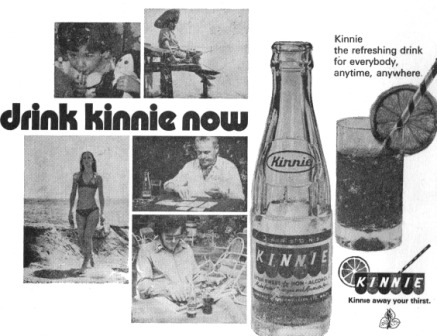
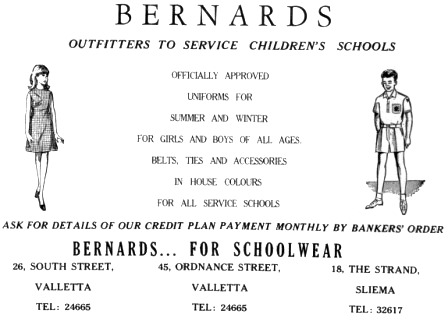


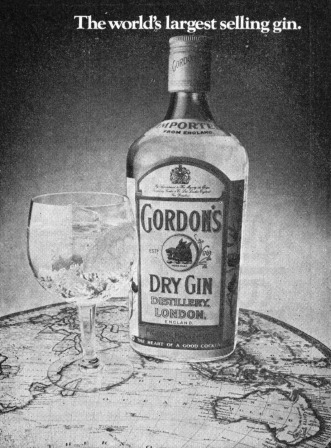

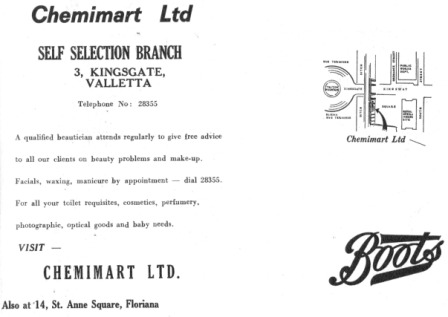

Back
to top
|

.jpg)
.jpg)
.jpg)
.jpg)
.jpg)
.jpg) Pillage, attack us, our 'home and
Pillage, attack us, our 'home and.jpg)
.jpg)





